

How Long Do RV Batteries Last? (Plus 5 Signs Yours Needs Replacing)
April 04, 2024.
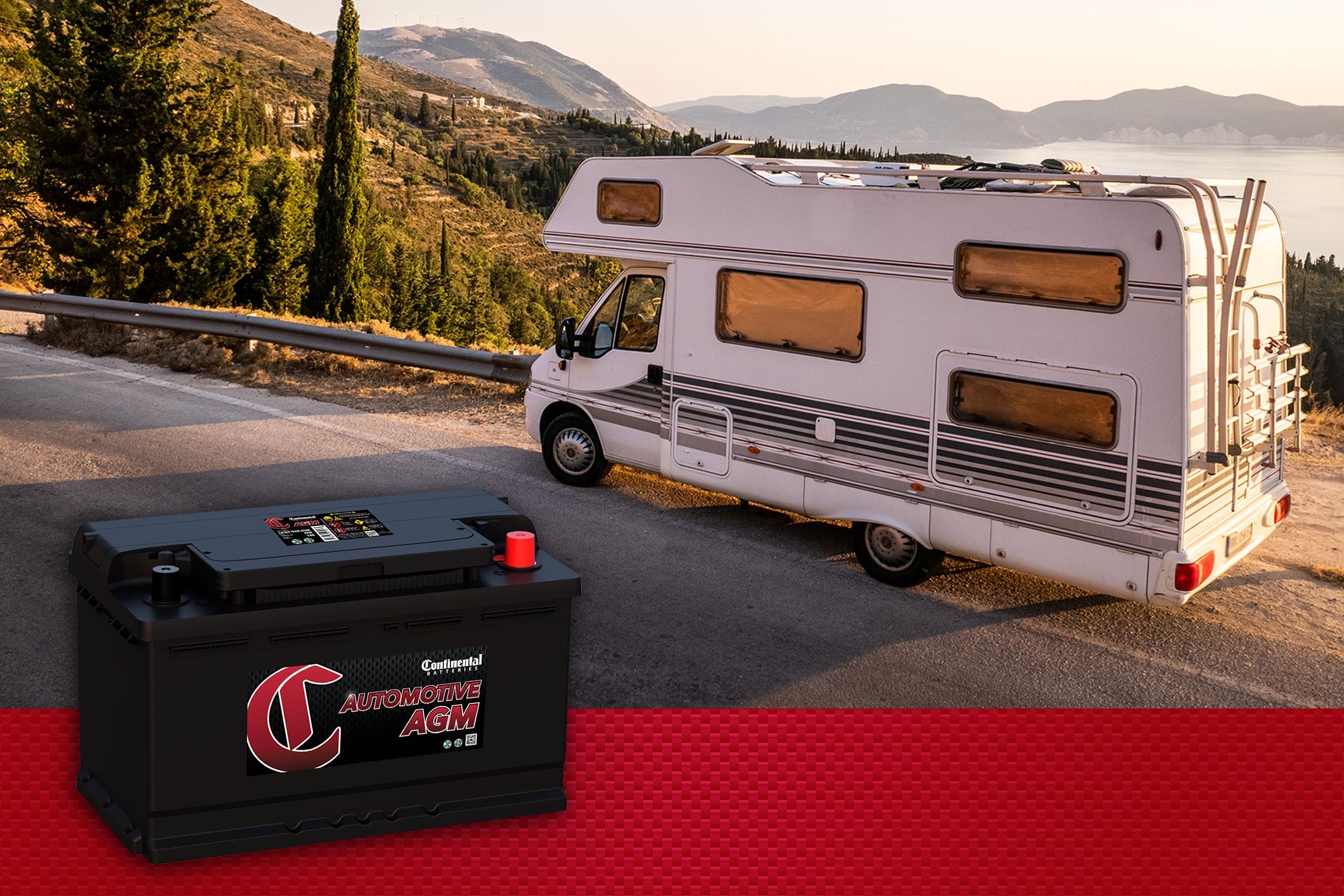
Whether you’re a weekend warrior or live on the road full time, the right RV battery can make the difference between a smooth and comfortable experience and a frustrating journey. A well-chosen and well-maintained RV battery can significantly enhance your travel experience. In this blog post, we’ll explore:
- Different types of RV batteries
- The lifespan of RV batteries
- How to extend the life of your RV battery
- Signs it’s time to replace your RV battery
Understanding RV Batteries
RV batteries fall into two general systems:
- Chassis (starting) batteries. These batteries are similar to those found in your car. They supply a burst of power to start the engine and are recharged as you drive. They power anything driving-related, like the engine, windshield wipers or headlights. Chassis batteries are most commonly found in motorized RVs.
- House batteries. These deep-cycle batteries power the living space within the camper, including water pumps, appliances and other electrical devices that work while the camper is parked. They offer steady power meant to be drawn down and recharged as needed. You’ll find house batteries in both motorized and towable RVs.
3 Types of RV House Batteries
There are three common types of deep-cycle house batteries , each with its own benefits and drawbacks.
Lifespan of RV Batteries
A variety of factors can affect the lifespan of your RV battery, including the type of RV battery you choose.
Of course, battery type is only one factor in determining the actual lifespan of your battery. Proper use, storage and maintenance also affect your RV battery’s lifespan.
How to Extend RV Battery Life
Even batteries that are labeled maintenance-free require some level of care in order to perform their best for the longest period of time possible. Properly caring for and maintaining your RV battery significantly impacts its lifespan.
Keep your batteries clean. For FLA and AGM batteries, keep an eye out for corrosion, which can lead to sulfation and poor connection to the terminals. If you spot corrosion, clean your battery thoroughly. For all battery chemistries, check often for signs of wear, damage or loose connections.
Avoid parasitic draw. Your RV battery will continue to power electronics in your camper even when you aren’t using it — this is called parasitic draw. Install a battery disconnect switch so you can turn off power when you don’t need it.
Keep cool (but not freezing). Weather — namely temperature and humidity — can affect your battery’s lifespan. Make sure to store your battery in a cool, dry location to stave off things like corrosion that can cut down battery performance and longevity.
Practice proper storage. By some estimates, a battery left hooked up to your RV will draw down in a matter of days. If you plan to be off the road for an extended period of time, unhook your battery and remove it from the RV. Charge the battery fully and store it in a climate-controlled environment . Connect your battery to a trickle charger or battery tender to maintain the proper level of charge without the risk of overcharging.
Proper Charging and Discharging
One of the best ways to extend the lifespan of your RV battery is to follow best practices for charging and discharging.
How to charge RV batteries:
- Use a quality battery charger specifically designed for your battery type (AGM, FLA, or Li-Ion).
- Charge the battery to its recommended voltage level.
- Avoid overcharging the battery, as this can lead to damage and reduce the battery's lifespan.
- Use a quality battery monitor to keep track of the battery's state of charge.
How to discharge RV batteries:
- Do not allow the battery to fully discharge. Lead-acid batteries should stay above 50% state of charge, while lithium can discharge upwards of 80%.
- Avoid deep discharging the battery. A deep discharge is when the battery voltage drops below 12v (this number can be as low as 10v in some lithium batteries). Deep discharging can reduce its capacity and lifespan.
- Do not leave the battery in a discharged state for long periods of time.
5 Signs It's Time to Replace Your RV Battery
Even with the best care and maintenance, your RV batteries will eventually fail and need to be replaced. Here are five signs your lead-acid battery is nearing the end of its life:
- Swelling. If your battery appears swollen or bulging, it's a sure sign you need to replace it right away.
- Voltage drop. A significant voltage drop when a load is applied indicates a failing battery. If your fully charged battery’s voltage plummets under load, it’s time to replace it.
- Reduced ability to hold a charge. If you find yourself constantly needing to charge your RV battery, it’s likely struggling to hold onto a charge and will need to be replaced.
- Diminished power. If your RV lights are dimming or the appliances are slower than normal, it may be time to replace your battery.
- Age. If your battery is getting up there in age for its type, think about replacing it before it fails.
A note on lithium-ion batteries. Some lithium-ion RV batteries , like those from ReLion, come with a built-in battery management system (BMS). The BMS monitors performance and can provide real-time data on the health of your battery.
The Best RV Battery for You
RV life is about the freedom to hit the road when the urge strikes. Having a reliable battery means you won’t be held back. Knowing the signs it's time to replace your RV battery and understanding what you can do to extend its lifespan ensures you and your camper are ready for whatever comes across your path.


The Savvy Campers
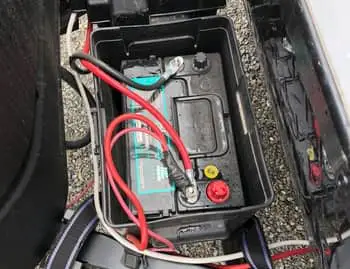
How Long Do Travel Trailer Batteries Last?
When looking to buy our new Travel Trailer, this battery life question kept coming across our minds. We have spent many nights in our trailer dry camping and we have a good idea of how long you will get out of your batteries.
How long do travel trailer batteries last?
Travel trailer house batteries typically last 2-3 days if you are utilizing the normal functions of your RV such as the water pump, heater, lighting, and refrigerator. If you are able to conserve energy or have larger batteries, you will be able to get 6-7 days of battery life.
The length of time your batteries will last depend on if you are trying to conserve energy or if you are using your trailer as usual. Retracting and extending your awning twice a day as well as running incandescent lighting can eat batteries really fast. Here are the best 12v batteries for your RV on the market today.
How to Conserve Power in your RV
There are several items you can do before the camping trip and after to conserve power in your travel trailer or RV. Making sure your batteries are fully charged before you go will keep you having the most juice. Read our battery charging guide to learn tips and tricks to keep charged.
Upgrade the Lighting in your Travel Trailer
In preparation to go camping, switching all of the bulbs in your camper to LED will significantly reduce the amount of energy they consume. A typical incandescent bulb in your RV will be 18 watts. If you have 25 bulbs throughout your trailer from your reading lights to your bathroom lights, you would use 450 watts of power if they were all turned on.
An equivalent LED bulb with the same brightness consumes 1.2 watts. If you had every LED bulb on in your trailer, you would be using 30 watts or essentially the same wattage as two incandescents. If you use lots of lighting at night, this upgrade will greatly increase your battery life.
Another benefit to LED bulbs is that they last longer, stay cooler, and have greater durability. When you drive, your whole travel trailer is rumbling and the filament in your incandescent bulbs can break. LED bulbs are solid state and will not be affected from bumps in the road.
Turn off the Water Pump on your Travel Trailer
The water pump will be another user of electricity. Make sure to turn the master water pump switch off whenever you are not using water. Doing this will conserve energy as the pump is not using power waiting to turn on “on demand water”.
Lower your Heating Usage in your RV
If you have to run heating on your travel trailer, the blower motor consumes a lot of battery. Try setting your thermostat back a few degrees while you are sleeping.
If you need heat during the day, set your thermostat to the desired temperature. Once you reach the desired temperature, set the thermostat back a few degrees so the heat does not kick on every 15 minutes or so to keep the setpoint. When you need heat again, turn the thermostat up to where you want the heat to be and back down after. Utilizing this technique will reduce your fan time conserving battery. Setting back your heater will also save propane, read more on propane usage and conservation from our article.
Adding insulation in your roof vent cutouts or skylights is an easy way to keep heat in the trailer. These skylight covers are typically just plastic with poor seals and have no R value whatsoever.
Tip: When you get to your campsite, leave your vehicle on and plugged in to your trailer when you go through your leveling process if you have electric stabilizers or an electric tongue jack to squeeze a little more power out of your vehicle and not from your battery reserve.
Buy more Batteries for your RV
The battery or batteries installed in your travel trailer will greatly dictate the amount of life you will have.
First off, if your RV has only one house battery, adding a second battery will double your capacity. If you currently have two batteries, adding a third will give you an additional 30% battery life if you have space. Your RV should have a deep cycle battery, if not, make sure to purchase a good brand deep cycle battery.
Upgrade to a 6 volt Battery System.
The batteries that came with your RV from the dealer may not be the best of the best. Typically they may be 70 amp hour 12 volt batteries. 70 amp hour 12 volt batteries will be ran in parallel, keeping the voltage the same, but doubling the amp hour rating. If you have two batteries, this will give you a total of 140 amp hours.
Typical 12 volt batteries for travel trailers can come in two sizes for deep cycle. and most travel trailers have dual batteries.
- Group 24- Approximately 81 Amp Hours Each Totaling 162 Amp Hours
- Group 27- Approximately 88 Amp Hours Each Totaling 176 Amp Hours
A nice set of Trojan 225 amp hour 6 volt batteries wired in series, would double the voltage to 12 volts but keep the amp hour rating at 225. This is about 40% more battery life than your stock dealer batteries of 140 amp hours.
How to Keep your Travel Trailer Batteries in tip top Condition
These tips below will keep your batteries in good condition for many years:
- Store batteries indoors in the winter
- Keep batteries on a battery maintainer in the winter
- Keep RV batteries charged
- Monitor water levels weekly with use or monthly of storage
- Do not discharge under 50%
- Use appropriate charging methods for your battery
- Brush off any corrosion on terminals
Related Questions
How long will a battery last dry camping?
Typically your battery will last 2-3 days in your RV while dry camping. This can be extended if you do not need any heat or lighting.
Do I need a battery for my travel trailer?
Yes, you will need a battery for your travel trailer . Even if you are plugged into shore power, some items only operate off of 12 volts.
How to reduce travel trailer battery drain?
Unplug tv’s, microwaves, clocks, equipment, chargers, or anything when not in use. Make sure to turn off your master switch when you leave your trailer as to not leave any lighting or items on when you are gone.
How long will a RV Fridge run on battery?
Your refrigerator in your RV will run off of propane with the control board running off of 12 volt battery power. The fridge will run for 2-3 days if you are using the trailer, or about 6-7 days if you are conserving power and have little other use in your trailer. If you have dual propane tanks and are charging your battery, your fridge could last 30 days if you have a newer efficient model.
Be the first to be notified about FREE tips, hints, coupon codes, and email-exclusive information. All for FREE!
Related Posts:

Similar Posts
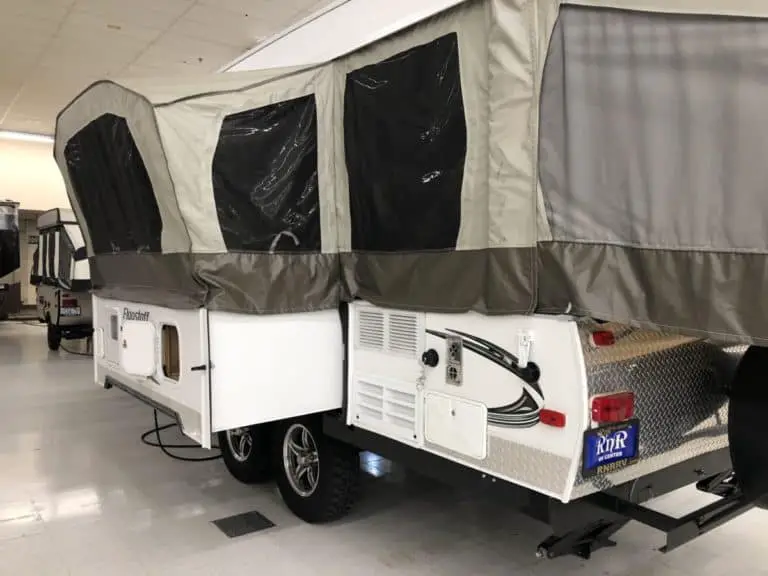
Do Popup Tent Trailer Campers have Bathrooms?
Most of us purchase a camper for one reason, a bathroom to go to in the middle of the night and not have to wander through the forest with bears and other items lurking in the shadows, or so you perceive with every movement in the dark. Many popups have bathroom facilities, but many do…
Can You Use Synthetic Oil in a Champion Generator?
While they only started creating generators in 2003, Champion generators quickly soared to the top of the market. Their relatively low prices combined with their revolutionary dual-fuel technology have greatly aided their popularity. One of the most commonly asked questions about Champion generators is whether or not you can use synthetic oil in them. Once…
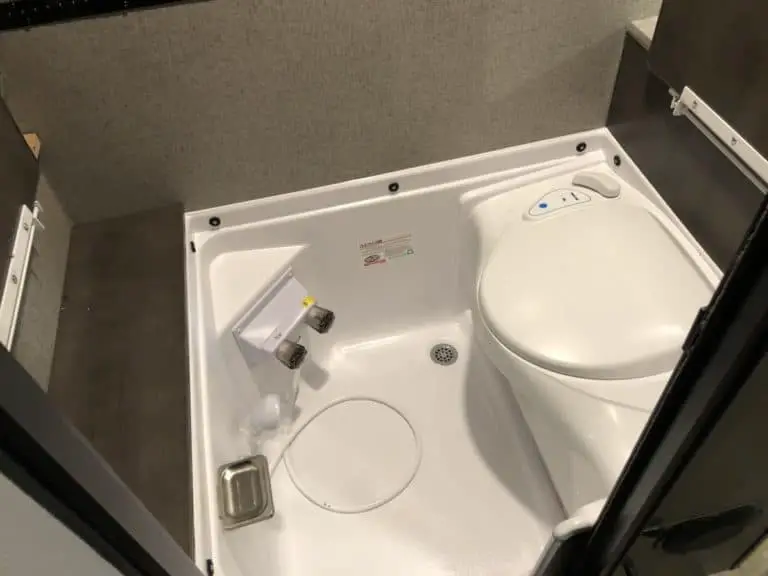
Can you put a regular toilet into an RV?
Whether your home has wheels or not, toilets are, without a doubt, one of the most important pieces of equipment in it. Since they move, RV’s present an even more complicated set of conditions in this department than a house. Can you put a regular toilet into an RV? No, you cannot put a regular…
Can You Safely Add an Oven to a Travel Trailer?
If you like to live on the go, then a travel trailer is a great idea to buy. Travel trailers allow you to live on the road and contain all the amenities you need to live a comfortable life while traveling. Or, they almost do. Most travel trailers have some kitchen appliances, but very few…
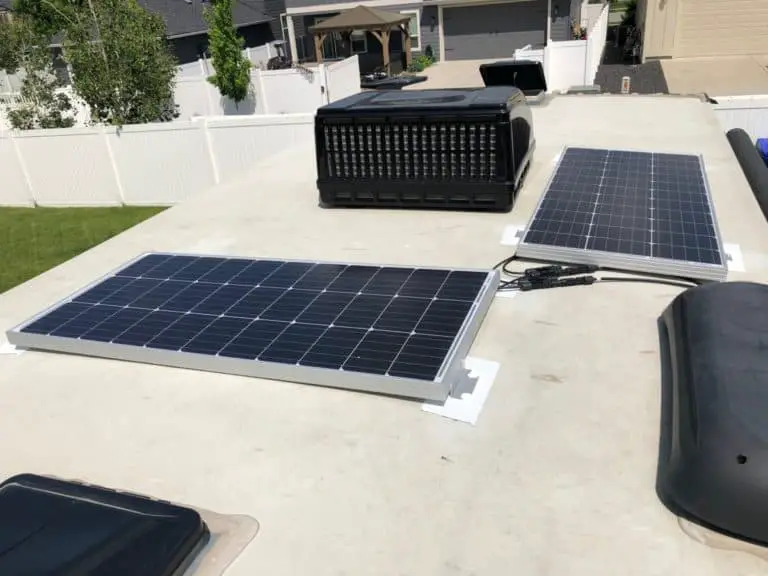
How to Inspect, Care, Seal, and Repair an RV Roof
Maintaining your RV roof is an important part of caring for your “home away from home.” You should regularly inspect, care, seal, and repair your roof to avoid long term and costly damage. Having a sturdy and leak free roof will also make your travels more comfortable. Here is a comprehensive guide to keeping the…
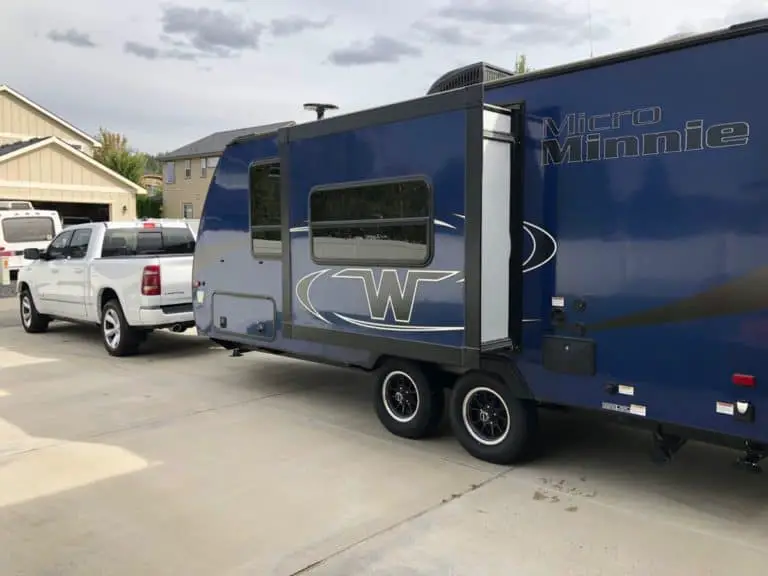
Can I Ride in a Travel Trailer or Fifth Wheel While it is Being Towed?
How many times have you driven down the road and noticed a cozy looking travel trailer or fifth wheel cruising by? I know I have thought about how nice it would be to ride in the comfort of a travel trailer instead of in the passenger seat, especially after a particularly long trip when your…
Join our Newsletter to stay up to date on the latest RV topics and receive our FREE RV Inspection Cheat Sheet Today. Use this tool to inspect new or used campers you are looking at purchasing.
No thanks, I’m not interested!

How Long Do RV Batteries Last? An Essential Guide to Maximizing Battery Life
Have you ever wondered how long RV batteries last? Our expert guide provides the answer and offers tips on extending battery life to help you make the most of your RV journey.
Have you ever been on an RV adventure just to find yourself stuck with a dead battery in the middle of nowhere? It’s a frustrating situation, but it doesn’t have to be!
In this blog post, we’ll explore the world of RV batteries and share tips for maximizing their lifespan, including answering the question, “How long do RV batteries last?”
With proper knowledge and care, you can ensure your RV battery has enough power for every trip, no matter how far you venture off the grid.
Are you ready to make the most of your RV battery life? Let’s dive in!
At A Glance: How Long Do RV Batteries Last?
- Understanding your battery type and proper maintenance are key to extending its lifespan.
- Invest in a battery monitor and the best quality battery chargers (MPPT, DC-to-DC, and Converters) to get 4-10 years out of your deep cycle batteries.
- Consider switching to lithium batteries for an even longer life.
- Follow proper charging techniques, do regular maintenance, use energy-efficient appliances & follow power-saving habits while boondocking to maximize RV battery life.
How is an RV Battery’s Lifespan Measured?
A battery’s lifespan is typically measured in terms of its cycle life, which refers to the number of charge and discharge cycles it can undergo before its capacity significantly decreases.
One cycle is defined as a full discharge of the battery followed by a complete recharge.
Several factors can influence a camper battery’s lifespan, including:
Battery Type
There are different types of RV batteries, such as lead-acid, AGM (Absorbent Glass Mat), and lithium-ion batteries.
Each type has a different average lifespan. Lead-acid batteries generally last 3-5 years, AGM batteries around 4-7 years, and lithium-ion batteries can last up to 10 years or more.
Depth of Discharge (DoD)
Discharging a battery to a lower state of charge (SoC) and then recharging it back to full capacity is known as the depth of discharge.
The greater the DoD, the shorter the battery’s lifespan.
For example, if you regularly discharge a battery to 50% of its capacity before recharging, it will last longer than if you discharge it to 80%.
Maintenance
Proper maintenance can help extend the life of a battery. This includes keeping the terminals clean and storing the battery at the correct temperature.
Temperature
Extreme hot and cold temperatures can negatively impact a battery’s lifespan. High temperatures can cause the electrolyte to evaporate, while low temperatures can slow down the chemical reactions within the battery.
Charging Habits
Overcharging and undercharging can harm an RV battery’s lifespan.
It’s essential to use a compatible charger and follow the manufacturer’s guidelines for charging.
Long-term Storage
- A lithium battery should be stored and isolated from the RV circuits at around 40% charged. Ideally, the charge level should be checked every few months so you can maintain it at that level if need be.
- AGM/GEL without solar charging : if the RV is parked indoors, or out of the sunlight, the batteries should be stored isolated from the DC systems and fully charged at 100%.
- AGM/GELs with solar charging: disconnect the battery’s output circuits but leaving the solar panels and controllers connected to maintain a trickle charge.
Note: regardless of what type of battery you have in your RV, carefully consider the risks of leaving it connected to a live 110 vac~240 vac hook-up if there is no one around to monitor it.

Understanding RV Battery Lifespan
One of the first steps in maximizing your RV battery life is understanding the different types of RV batteries and how their lifespan can be affected by various factors.
There are three main types of deep-cycle RV batteries: lithium, AGM, and Gel batteries, each with advantages and disadvantages.
We don’t recommend flood lead acid batteries in a camper these days for safety reasons.
But remember, no matter the type of battery or battery bank you have, proper maintenance and usage are vital to extending its life.
Lithium-Ion Batteries
Lithium-ion batteries offer the longest lifespan, lasting up to 10 years or more, with up to 5,000 charge cycles and minimal maintenance requirements.
A lithium-ion battery is lighter than lead-acid batteries, provides more power, and is more energy efficient.
To make sure your lithium-ion RV batteries last for a long time:
- Charge them up as soon as they start to get low on power,
- use the correct charging profiles on the charger,
- don’t let them drain fully,
- store them at a moderate temperature, usually at 40% charge, and
- try to keep them away from really hot or cold temperatures.

AGM & Gel Batteries
AGM (Absorbent Glass Mat) batteries are popular for RVers due to their low maintenance and reliable performance.
Typically, they have a lifespan of 4-7 years. However, you can extend their life even further with proper care and attention.
Here are some tips to help your RV’s AGM battery last longer:
- Use a compatible charger designed for AGM batteries and follow the manufacturer’s guidelines for charging.
- Use a DC-to-DC charger because it has better AGM & Gel charging profiles than a voltage sensing relay driven from your alternator.
- Don’t drain your battery by more than 50%. Aim for less to help prolong its life.
- Keep the battery clean and corrosion-free by regularly inspecting and cleaning the terminals. Although AGM batteries are sealed, it’s still essential to monitor their condition.
- Extreme temperatures can negatively impact your AGM battery’s lifespan. Store your RV and battery in a temperature-controlled environment when possible, or at least protect the battery from extreme heat or cold.
- If you’re not using your RV for an extended period, ensure the AGM battery is fully charged before storage. Disconnect it from the RV’s electrical system to prevent parasitic drains, and periodically check the battery’s charge.
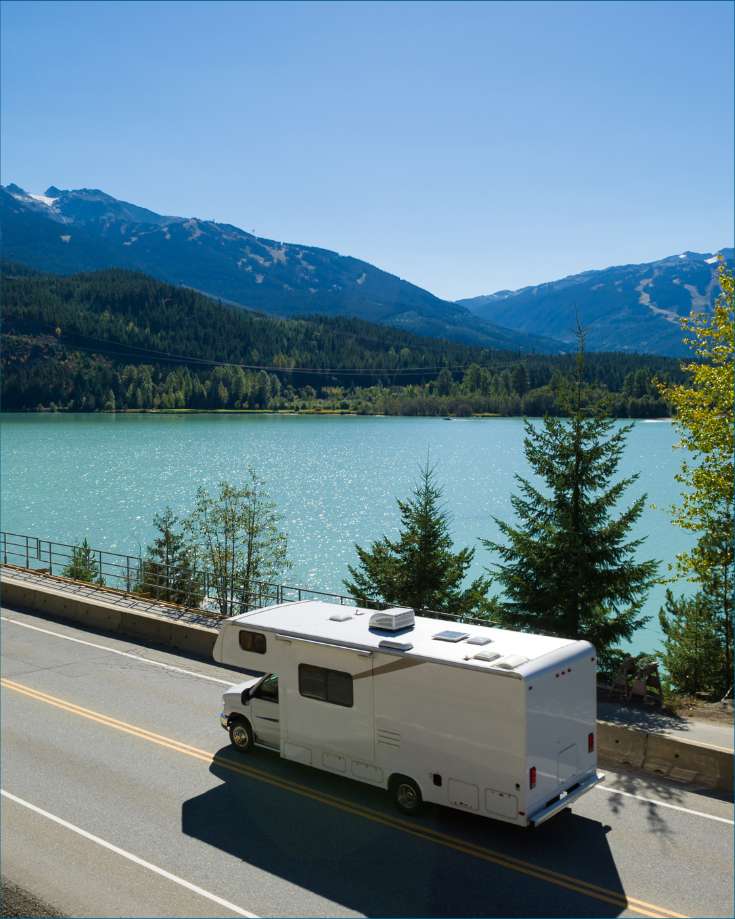
Optimizing RV Battery Life: Tips and Tricks
Proper charging is crucial in maintaining the health and longevity of your RV battery. Below are some effective charging techniques to help you get the most out of your battery:
- Choose the right charger : Select a charger specifically designed for the type of battery you have (lead-acid, AGM, gel, or lithium-ion). Using an incompatible charger may damage the battery or reduce its lifespan.
- Follow the manufacturer’s guidelines : Adhere to the battery manufacturer’s recommended charging voltage, current, and duration. This ensures optimal charging and helps prevent overcharging or undercharging.
- During the bulk stage, the charger delivers maximum current until the battery reaches approximately 80% capacity.
- The absorption stage gradually reduces the current while bringing the battery to 100% capacity.
- Finally, the float stage maintains the battery at full charge, preventing overcharging.
- LIthium-Ion chargers use a particular charging profile for Lithium batteries and cannot be used for AGMs or GELs as they use very different charging voltages.
- Monitor battery temperature : Keep an eye on the battery temperature during charging. Extreme temperatures can affect the charging process and battery performance. If the battery becomes too hot, pause the charging process and allow it to cool down before resuming.
- Charge before storage : If you’re not using your RV for an extended period, fully charge the battery before storage. Disconnect it from the RV’s electrical system to prevent parasitic drains, and periodically check the battery’s charge level.
- Inspect and maintain connections : Regularly inspect and clean the battery terminals and cable connections to ensure proper contact and prevent corrosion. Tighten any loose connections to maintain efficient power flow during charging.
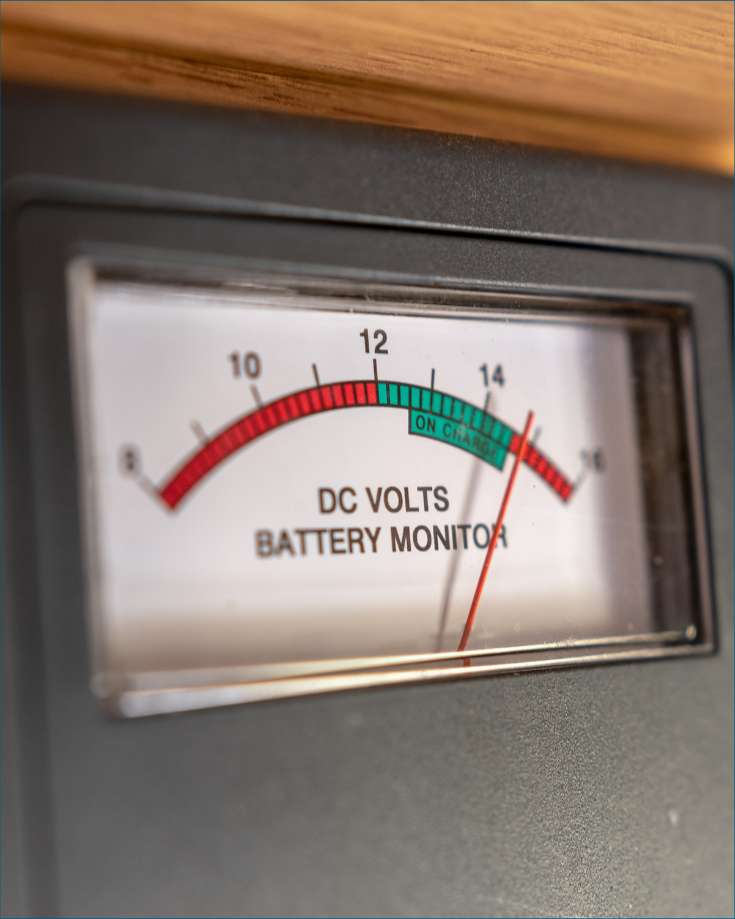
How To Charge RV Batteries
Keeping your camper’s battery charged is essential to optimize its life. So, multiple ways to keep them charged in different scenarios is a must.
With numerous charging options available, it’s crucial to understand the advantages and disadvantages of each method to select the most suitable one for your needs.
Fortunately, there are several ways to charge RV batteries .
Plus some can be used simultaneously, so it reduces the time it takes to fully charge!
Shore Power
Charging your battery using shore power involves connecting your RV to an external power source at a campground or RV park.
This method provides a stable and continuous supply of electricity, allowing your battery to recharge while using your RV’s appliances.
RV Solar Panels
Solar panels convert sunlight into electricity, providing a renewable and eco-friendly way to charge your battery.
Solar charging systems typically consist of solar panels, a controller, and wiring.
This method is ideal for off-grid adventures and boondocking.
A portable generator produces electricity by running on fuel, such as gasoline, propane, or diesel.
It can be connected to your RV to recharge the battery when shore power isn’t available.
Generators are helpful in providing backup power and charging during extended trips or emergencies.
Alternator Charging
Many RVs have a built-in alternator charging system that charges the house battery while the engine runs.
This method takes advantage of the vehicle’s existing electrical system and is convenient for maintaining your battery’s charge during long drives.
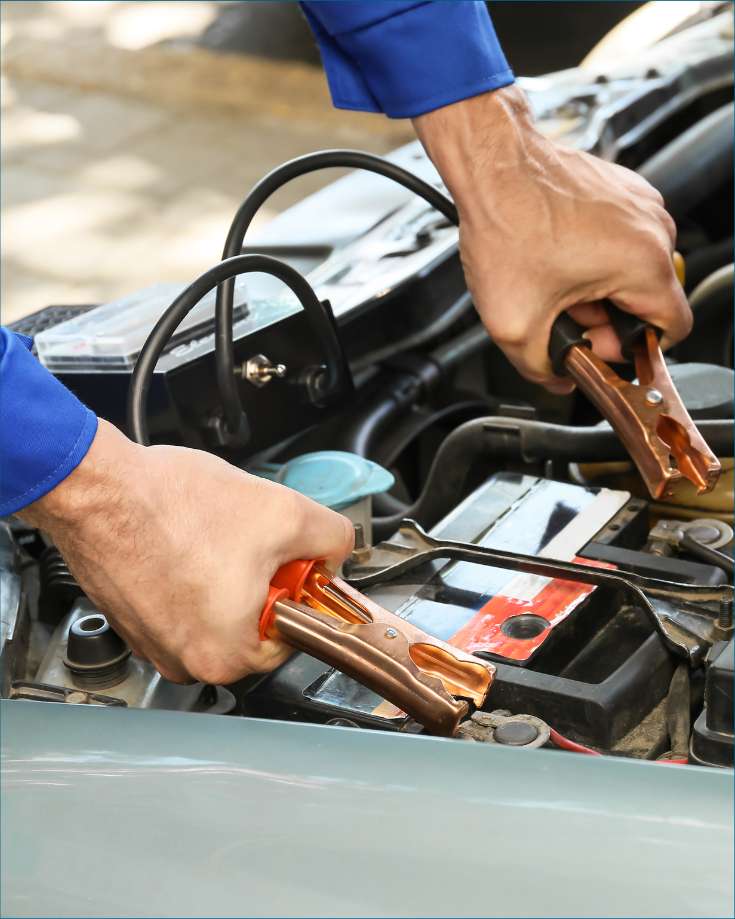
Monitoring Power Usage
Monitoring power usage is crucial to prevent excessive discharge and prolong your RV battery life.
A battery monitor can help you keep track of your battery’s state and ensure it doesn’t go below the recommended capacity.
Disconnecting the ground wire while in storage will also help prevent parasitic loads from draining the battery.
Monitoring power usage and implementing power-saving habits can extend your boondocking adventures and keep your battery in top shape.
Upgrading Your RV Battery System
Sometimes, upgrading your RV battery system is the best way to extend your battery life and improve performance.
Additional batteries, higher-capacity batteries, lithium batteries, or alternative power sources can significantly enhance your RV’s electrical capabilities.
Or you could improve the battery charging profiles from the alternator by using DC to DC chargers instead of a Voltage Sensing Relay.
That will allow you to enjoy your adventures without worrying about running out of power.
Upgrading your battery system can be a great way to ensure that you have enough power to last through your travels. With the proper setup, you can enjoy your RV without worrying about running out of fuel.
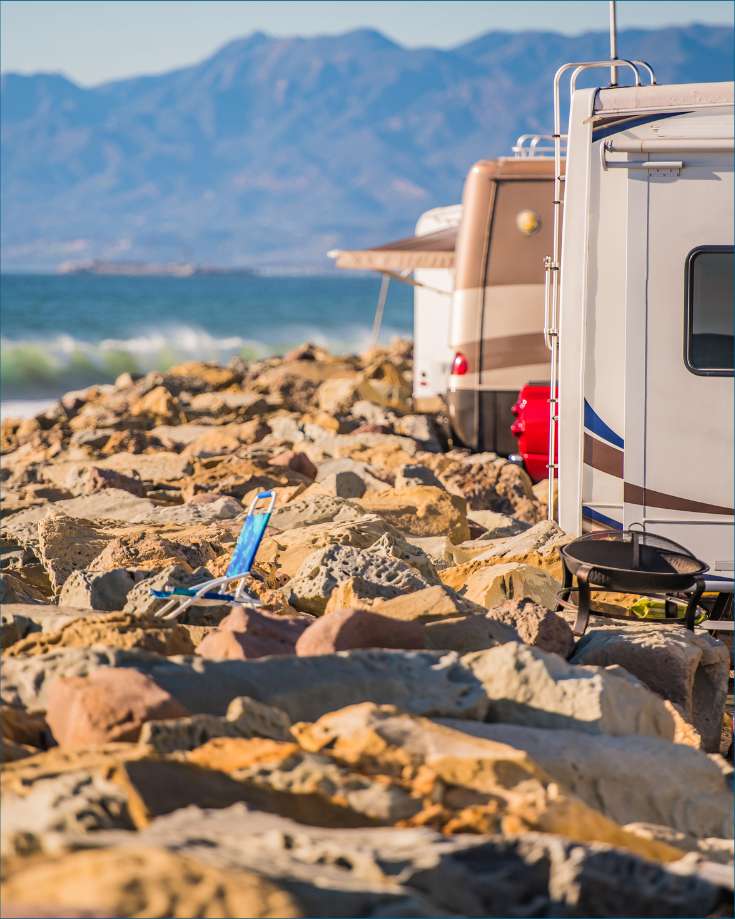
Adding Extra Batteries
Installing extra batteries in your existing battery bank can increase overall capacity and provide more power for more extended periods.
Adding more batteries and wiring them in parallel will allow you to boost your battery bank’s capacity and maintain the appropriate voltage, giving you more power for appliances and devices.
With extra batteries, you can spend more time off the grid and enjoy longer boondocking adventures.
However, this approach add extra cost, extra weight, and loss of precious storage space.
This can be a great way to explore the outdoors and escape the hustle and bustle of everyday life.
You can also save money on campsite fees and enjoy the freedom of camping.
Switching to Higher Capacity Batteries
Upgrading to higher capacity batteries, such as 12V 200 amp hours deep cycle batteries, can improve performance and extend your RV battery life.
These batteries can boost your RV battery system’s total capacity, allowing you to stay out longer while boondocking.
Switching to Lithium Batteries
Lithium batteries, especially RV lithium batteries , offer numerous advantages over traditional lead-acid batteries, making them an excellent choice for upgrading your RV battery system.
They have a longer lifespan, lighter weight, and higher efficiency, allowing you to enjoy extended trips without worrying about battery life.
If you want to enhance your battery system and extend your battery life, switching to lithium batteries is smart.
And the prices of these batteries keep falling, making it a wise investment if you can afford the upfront cost.
Efficient Power Usage While Boondocking
While boondocking, efficient power usage is crucial to ensure your RV battery lasts as long as possible.
Choosing energy-efficient appliances and implementing power-saving habits can make a significant difference in your battery life, allowing you to enjoy the great outdoors without worrying about running out of power.
By selecting the right appliances and being mindful of your power usage, you can make the most of your RV battery and enjoy your time in the great outdoors.

Choosing Energy-Efficient Appliances
Selecting energy-efficient appliances, such as LED lights and 12V DC appliances, can help reduce your power consumption and extend your RV battery life.
By choosing appliances that require less energy, you can conserve your battery power and enjoy longer boondocking trips without constantly monitoring your battery levels.
These appliances can help reduce your power consumption and extend your RV battery life.
Implementing Power-Saving Habits
In addition to using energy-efficient appliances, adopting power-saving habits can further conserve your RV battery power.
Strategic use of lights, limiting water pump use, and using tablets instead of laptops are just a few habits that can help reduce power consumption.
By implementing these habits, you can extend the life of your RV battery and enjoy your off-grid adventures without constantly worrying about battery levels.
Troubleshooting Common RV Battery Issues
While proper maintenance and usage are essential for extending your RV battery life, it’s also crucial to troubleshoot common RV battery issues.
Parasitic loads and temperature fluctuations are just a few problems that can damage your battery and shorten its lifespan.
By addressing these issues, you can ensure your battery remains in optimal condition and lasts as long as possible.
Taking the time to troubleshoot and address any issues can help you get the most out of your RV battery and keep it running for years.
Dealing with Parasitic Loads
Parasitic loads are electrical draws from appliances that drain power from your RV battery even when you’re not plugged in.
Identifying and addressing these loads can prevent unnecessary battery drain and premature failure.
Using a digital multimeter , you can test your battery and detect any electrical draws from appliances continuously using RV battery power when not connected to a power source.
Managing Temperature Fluctuations
Temperature fluctuations can significantly impact your RV battery’s performance and lifespan.
Maintaining proper battery storage conditions and monitoring heat and humidity levels can prevent damage caused by temperature changes.
The solution could be as simple as adding an old PC cooling fan into the battery storage area on a 12v switch.
Combined with a cheap thermometer taped to the battery case provides all the tools to manage temperature changes.
In Conclusion
Maximizing your RV battery life is crucial for enjoying worry-free adventures on the open road.
By understanding the different types of RV batteries, practicing proper charging techniques and maintenance, upgrading your battery system, and incorporating energy-efficient appliances and power-saving habits, you can extend the life of your RV battery and make the most of your off-grid experiences.
So gear up, hit the road, and enjoy the freedom of a reliable and long-lasting RV battery.
Graham Bogie

Graham is a seasoned marine electrical engineer with two decades of experience designing customized electrical systems for plant machinery and converting campers and overland vehicles. His expertise has led him to author the reputable Campervan Electrics Handbook and become the chief designer of our Campervan Electrical Design Service. As a knowledgeable figure in the field, his YouTube channel , blog, Facebook group , and newsletter, offering electrical advice and product reviews, reach more than a million users each year.
Related Posts
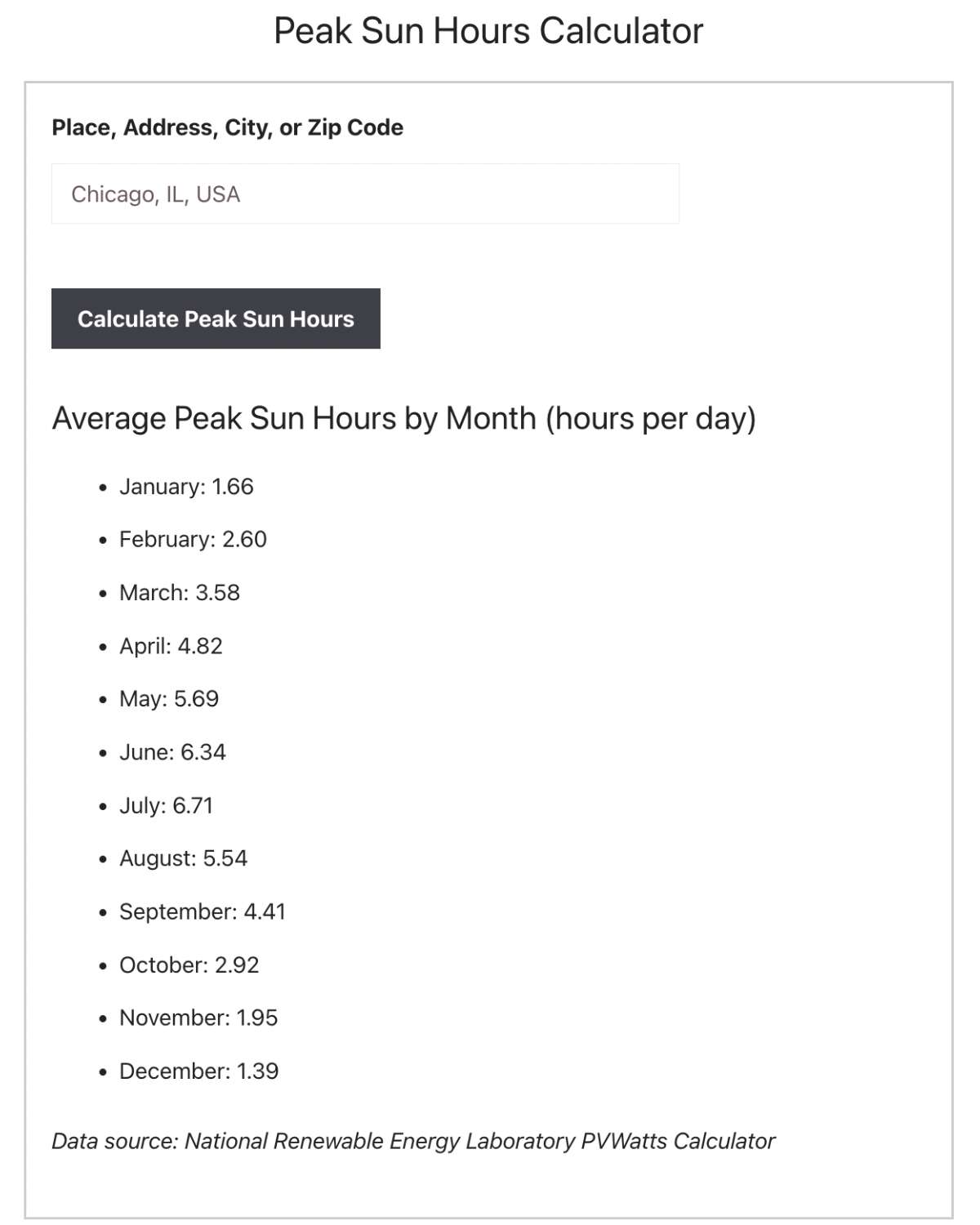
Peak Sun Hours Calculator by Zip Code, Address & City
November 23, 2023
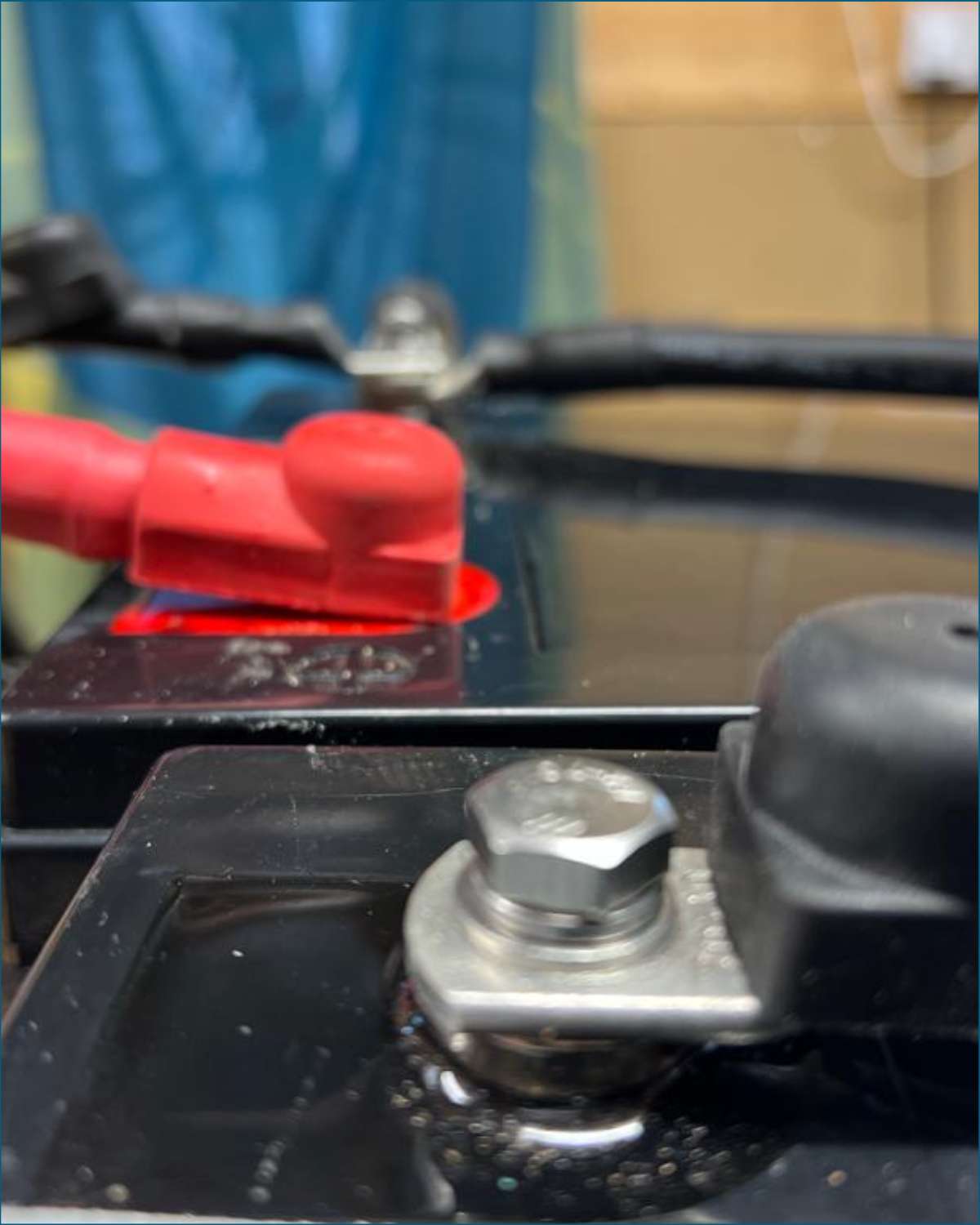
Why is My RV Battery Not Charging: Troubleshooting Guide
October 9, 2023

© 2024 mowgli adventures
Privacy Policy | Terms Of Service | Sitemap
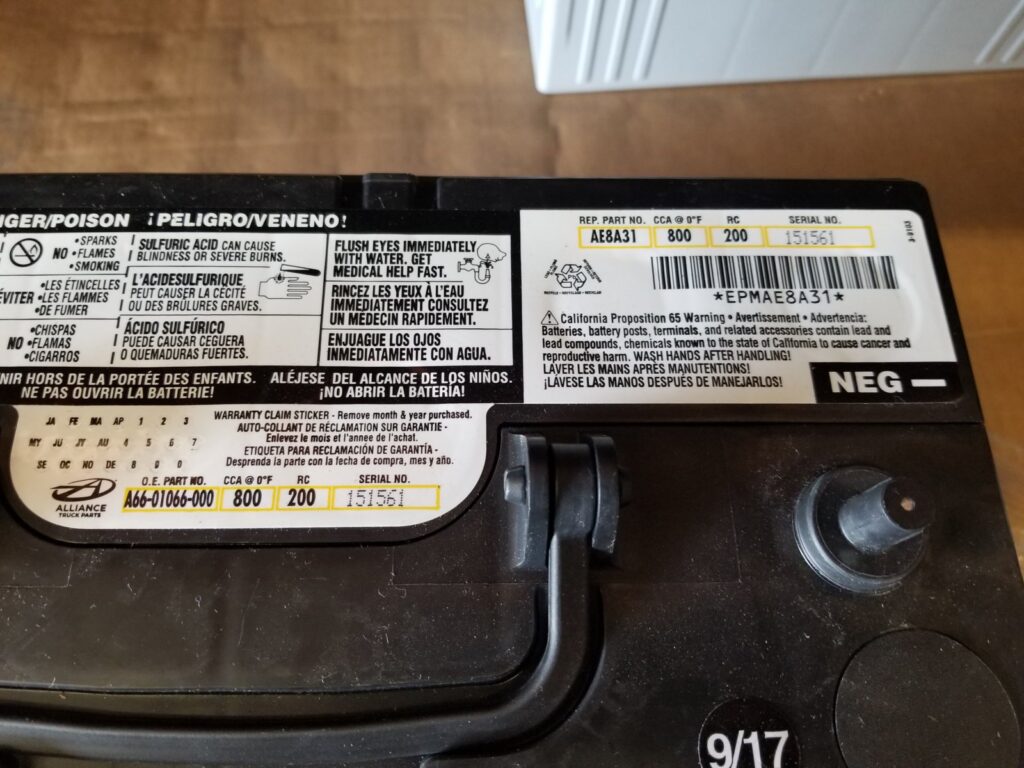
This post may contain affiliate links or mention our own products, please check out our disclosure policy
How Long Will My Batteries Last In Amp-Hours?
- Dave Helgeson
- November 13, 2019
- 33 Comments
Table of Contents
Note: As in the last two installments, this information is designed to help newbie RVers better understand the electrical needs of their RV. As with anything electrical, there are exceptions to every rule of thumb, but the basic information shared below is applicable in most RVing situations. Results will vary depending on temperature, battery condition, large loads, and loads over long periods of time.
In our previous article , we looked at how to calculate your RV’s 120-volt shore power needs by calculating watts and watt-hours. In this post, we will look at how to determine the electrical demands of your 12-volt battery system by learning about amps and amp-hours.
As we shared in the last couple of installments, the electrical needs of 120-volt appliances are typically expressed in “watts” on the back of the appliance. When they aren’t expressed as watts, we looked at how to multiply voltage times amperage to determine watts , then by including run times to determine watt-hours.
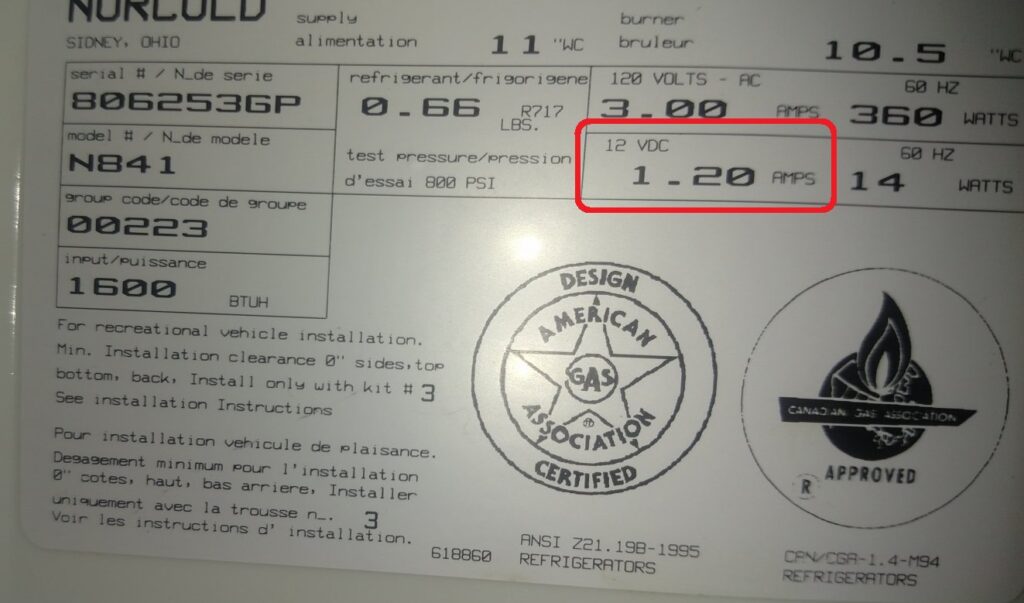
Norcold 12-volt needs – Photo from iRV2
While watts and watt-hours can also be applied to the 12-volt system in RVs, it seldom is. Rarely are the electrical requirements of the 12-volt appliances (water pump, furnace motor, lights, etc) expressed in any form other than amps.
This is definitely more convenient than watts as deep-cycle RV batteries (aka “House Battery”) are rated in amp-hours rather than watt-hours. Note that amp-hours are commonly abbreviated as “A.H.”, “Ah” or similar.
Just as we added up the 120-volt shore power needs in watt-hours, we will add up the needs of 12-volt (battery-powered) appliances in amp-hours.
- An incandescent 12-volt ceiling light bulb has a draw of 1.5 amps. If you leave the light on (burning) for one hour it will consume 1.5 amp hours of battery power. If you burn it for 2 hours it will consume 3 amp hours of battery power, etc.
- The blower motor and related 12-volt components of your propane furnace draw 7 amps while running. If the furnace runs a half-hour, it will consume 3.5 amp hours from your battery bank. 7 amps X .5 hours = 3.5 amp hours
- An LPG leak detector that draws .2 amps and operates 24 hours will consume 4.8 amp hours from your batteries.
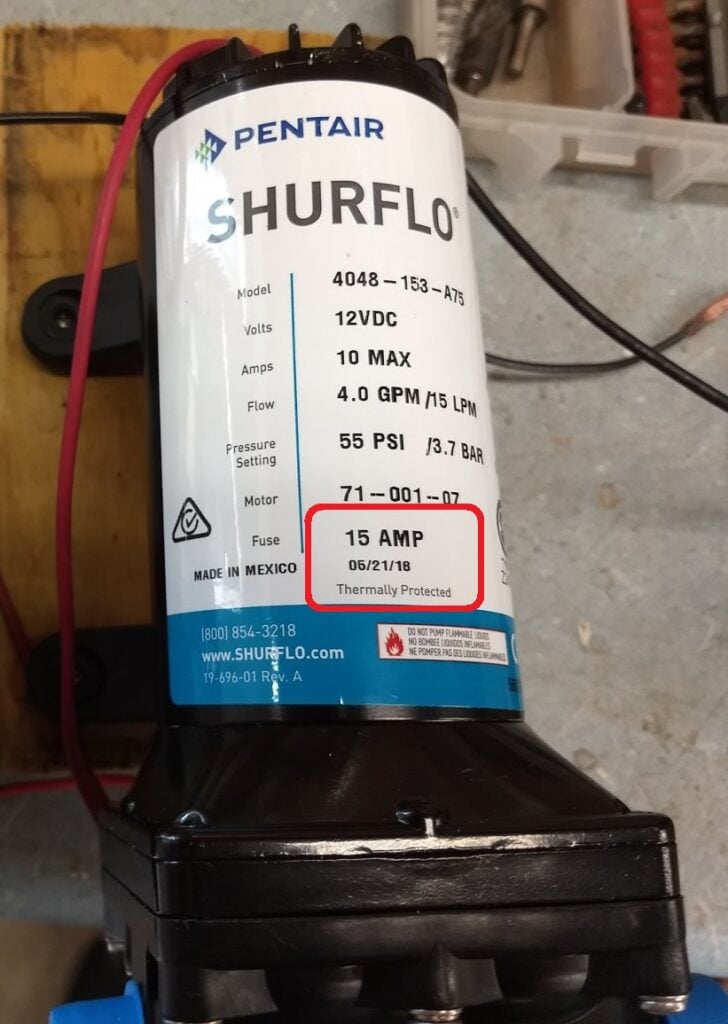
Water pump requirements – Photo from iRV2
Now, if you are connected to 120-volt shore power, none of the above matters much, as your converter charger will replenish the RV batteries as loads (amps) are drawn. Where it becomes important is when you are dry camping (no shore power) and the reserve power (amp-hours) in your RV batteries is all you have to supply your electrical needs.
A typical deep-cycle RV battery will be rated around 80 amp-hours, which in theory would supply one amp for 80 hours. However, in reality, if you discharge a lead-acid battery (what you likely have in your RV) more than 50% of the rated capacity you will greatly shorten the life span of the battery. Therefore, when calculating the reserve amp-hours of your RV’s batteries, the usable power will be 50% of the rated capacity.
Now, it is just a matter of adding up your amp hours for every 12-volt item in your RV (like we did for watt-hours in the last installment ) and divide that number into the amp-hours available in your RV’s battery bank to determine approximately how long the battery will last.
Now that you know how long your batteries are likely to last, you can plan accordingly for your next dry camping adventure in RVing!
See our previous installments here:
How To Determine Your RV Power Needs
- What’s A Watt? How To Calculate Your RV Power Needs
You May Also Like:
What size generator do i need for my rv, can i leave my rv plugged in all the time, 10 must-have rv electrical supplies, camping generators: everything you need to know, 5 rv storage problems & how to fix them, what’s a watt how to calculate your rv power needs, 7 useful items for dry camping without power, 33 thoughts on “ how long will my batteries last in amp-hours ”.
When you have two batteries say 1- 80ah and 1-70ah would that mean a total of 150 ah and half of that is usable (75ah) before being hard on the batteries? Or does it effect the first/last battery differently than the other one?
Thanks for all the help you’ve offered along the way!!!
It is not a good idea to have dissimilar battery pairs eg 80 amp/hr and 70 amp/hr You will only have 140 amp/hrs as the higher amp/hr battery only charges to the lower
Good information for beginners.
For starters if the batteries are wired together in parallel ALWAYS use like batteries. Now to answer you question – yes you would have 150 total amp hours capacity, but only 75 amp hours usable (50% of rated capacity). If the batteries are alike and wired together parallel correctly they would draw down evenly under load. If you must use dislike batteries you should keep them isolated and draw them down separately.
Dave, Oops! Just backwards.
To determine useful time divide battery Ah capacity (actually 1/2 battery capacity) by Ah usage. If usage is 20 Ah per day and battery capacity is 80 Ah you can go two days without significant battery damage. That is, 40 Ah capacity (1/2 rated battery capacity) divided by 20 Ah per day.
Thanks Dave!
Wilyoung, Thanks for the comment – I could have worded it a bit better. “divide that number into the amp hours available” AH capacity / amp hour load = hours
Is battery disconnect switch necessary. If so, what do you recommend.
A disconnect switch is not necessary, but is convenient for keeping your batteries from parasitic loads (gas detector, clock radio, etc) while in storage.
Thanks for your reply. Any recommendations on disconnect switch.
Amp hr ratings on batteries are close to true when brand new. After use it lowers and not equally for each battery. Batteries need to be well maintained and kept full of distilled water. As far as batteries I have found with experience of of about 20 yrs of using power inverters that the only battery I would buy is Trojan batteries . After using many brands and capacity I for the last 8 years would buy the highest rating amp hr they sold. They are expensive but worth the money. I found a site where I could buy them at Hodkins in Tucson,AZ and pick them up at any Trojan dealer will call and pre-paid. These batteries would perform more than 2 times better. Even over the well over states Interstate batteries. As far as amp hr or amp ratings of devices what is posted on device is maximum and not operational. Operational is usually a lot lower than the rating. Sometimes motors like AC units have may even be higher than ratings when older. That is why putting a real high rated and well maintained battery pack will serve you well.
Someone told me that two 6 volt batteries in series is better than two 12 volt batteries in parallel. The Ah becomes higher. Is this true? I need to replace my two batteries and wonder if two 6 volts is the way to go. A little more expensive. Thanks.
Not if the amp/hrs are equivalent on the 6 and 12 volt batteries When you add the 6 volt batteries together to make 12 the amp/hrs stay the same where as the 2 12 volt batteries amp/hrs would double in a 12 volt system
I’m going to the trip soon but I scare that my RV batteries not as good as befor. The information is very useful for me. Thanks so much!
I had no idea that deep-cycle batteries are measured in amp-hours. I look forward to getting an RV before Christmas so I can go on a big road trip with my family. I’ll look into getting a deep-cycle battery that is amp-hours instead of watt-hours.
So if I have 1 80ah battery and I am using 20 amps a day it would last 2 days?
How many watts solar suit case would I need to keep the battery charged ?
Dave, good article that covers the basics. Our trailer came with two new RV deep cycle batteries and I soon learned that I never got the expected life from them (or I should say half life as I didn’t want to drain them beyond 50%). I eventually found that the WFCO converter in the trailer did not fully charge them to 100%. I installed a Renogy DC-DC charger and they now charge to 100%. Deep cycle and AGM batteries need higher voltage than a wet cell (Maintenance Free) battery used in most vehicles.
I’m looking at a 12v fridge that has a rating of 340w/24 hours. I’m confused on how to get an amp hour rating. Help! 🙂
340 / 24 = 14.2 watts per hour / 12v = 1.2 Ah. Cheers
That is completely wrong. Watts per hour is meaningless. You have probably read the specifications wrong. It is probably 340wh per 24 hours would mean something useful. That would give 340wh / 12v = 2.8 ah per day.
If your appliance actually uses 340w while running continuously for 24 hours, then 340w * 24 hours / 12v = 680Ah / day which would be very bad. The appliance actually runs only a fraction of the time, this fraction is called the “duty cycle”. You must know or estimate this to calculate useful numbers. If the duty cycle is %10 then you would be down to 68Ah / day, if the duty cycle is %1 then you would be at 6.8Ah / day.
Appliances are generally not rated in terms of watt-hours or amp-hours because it would depend on how long they were running. They are rated in watts or amps while running.
Note that in the photo of the water pump in your post, you circled the size of the fuse (in amps), not the water pump’s consumption in amps. Above the fuse notation that you circled, the label shows that the pump uses 10 amps max.
I’m going to throw some motor terms out that generally are only specified for AC motors but also apply to DC motors. 10A ‘max’ is usually ‘LRA’ or ‘locked rotor amps’ which the pump only experiences the instant power is applied and the rotor is not moving (at startup), and then, only for a fraction of a second. Pumps do not experience ‘stall’ which would occur if there was not a pressure switch and the pressure accumulation stopped the motor. The pressure switch cuts the power long before the rotor stalls. In practice, I’ve never seen a pump draw more than 6A but each pump is different (but likely never 10A and most certainly never 15A). Additionally, because a pump shuts itself off when it reaches pressure, it is important to note, it only consumes power when it is actually turning, not just because power is applied.
How Long Do RV Batteries Last??? Normally, A 12-volt travel trailer battery can last about two to three days, on average. This battery life reflects normal electric appliance usage, including lighting, water pump, phone charging, running the propane refrigerator, and others. Using more electric appliances and gadgets will drain your RV battery faster. In general, a two to three-day RV battery life is sufficient for most RV owners. There are some Tips to Extend RV Batteries’ Life: Use a different battery for running the various equipment to avoid draining your RV battery. Check the battery’s water level regularly, temperature extremes can shorten battery life. Always use distilled water to refill the battery fluid. Do not use tap water because it can produce calcium sulfation.
Not allowing your RV battery to discharge below 50% can help extend its lifespan. So do check for parasitic loads, observe the correct battery charging process, and manage the battery’s fluid levels. Moreover, you can always choose to replace your 12-volt RV batteries with 6-volt units.
I have a full size Whirlpool refrigerator that is AC in my 2018 Thor Challenger. It runs off AC through the inverter. I have two Napa 6 Volt 235 AMP hr wired to make 12 volt. Is the rating the same draw going through the inverter making the 120 volts for refrigerator? The refrigerator draws 725 watts or 6+/- amps.
Your battery capacity is 2 x 235Ah@6V = 235Ah@12V. Assuming you observe 50% depth of discharge (DOD), you have 235Ah x .5=117.5Ah of usable capacity. Furthermore, inverter inefficiency of ~90% reduces your usable (120V delivered) capacity, 117.5Ahx.9 = 105.75Ah. Furthermore, battery Ah capacity is rated OVER A 20 HOUR DISCHARGE. Using it faster than that rate incurs further inefficiency so your adjusted, usable amp-hours (over ~8 hours) might be closer to 100Ah. I doubt your refrigerator actually draws 725W continuously. That sounds like a staring draw. A running consumption is likely ~200w. Even at that, it would need to be a very large refrigerator (20+ cuft). Because the refrigerator’s compressor turns on and off as cooling is required to maintain a constant internal temperature, it is impossible to determine daily power consumption without some detailed measurement. If you truly want to know, you would need to buy a wattmeter such as a ‘kill-a-watt’ brand or similar, that can sum all power drawn over a given time period. Understand, this is only the AC power and will not include DC inefficiencies of the inverter or rapid drawdown of the batteries.
725 watts at 120 volts is 6 amps 7250 watts at 12 volts or 60 amps
This is difficult to wrap your head around but is often the reason for claiming the battery does not produce the rated capacity; Rated Ah capacity is specified to be over a 20 hour, full discharge. Drawing faster than that rate, will result in more losses inside the battery and thereby less electricity delivered.
For example, a 200Ah capacity battery drawn down over 20 hours, 200Ah/20h = 10A. It should deliver 10A over 20 hours and likely will. By calculation, 10A is the ‘maximum’ rated current for full capacity. If you attempt to draw 20A over 10 hours, theoretically the same amount of power, the battery will likely be exhausted at 8.5-9 hours. The ‘lost’ energy went into heating inside the battery due to inefficiencies of lead-acid chemistry.
Electricity has always been a puzzle to me all my life. I acquired a high top van to convert to a camper. My electrical needs day to day will simply be lighting, possibly a microwave, a fridge, possibly a freezer, probably some tool use with an inverter. No propane use, period. Heat will be a 12v, plug in cigarette lighter, car heater, with backup heater a small wood stove. Oh yes, forgot – TV, wifi, computer. KISS all the way (Keep It Simple Stupid). No shore hookup to power. Batteries will provide all powers, and charged with solar, small wind generator, DIY gas generator, or from the van’s alternator. I believe in backup plans. My question is: Would, or could, with these charging devices, can you give an approximate length of time I could expect my batteries to last in the boondocks (or anywhere else for that matter)? I am not far enough along with this project to tell how many batteries, battery size, brand, etc. Oh, another question: Would it be best to have the batteries outside (perhaps mounted in a box on the rear bumper, or running up along side the rear door, perhaps even on the roof), or would there be any problems having them inside – or if inside, should they be in a sealed container, that is perhaps vented to the outside. I try to do my homework in all phases of this conversion. Thanks.
I want to buy a Dometic refridge/freezer. CFX3 75DZ rated at 9.6 a dc. Is that .6 amps per hour? We will have 400AH lithium in the bank, can you help me understand what that will operational life that will provide before recharge? Thanks for your help. Marty & Robin
I’m about to have a not-too-long trip but I’m worried that my battery will drain quickly and if it does, what should I do? Thank you for writing this article, very helpful for me.
In a comparison of 6V and 12V deep cycle batteries, 6V batteries last substantially longer than two 12V batteries because they use thicker plates for each cell.
I liked your article, I have a HILO trailer. I need about 65 amps for the hydraulic motor to work. How do I tell how many amps the battery has, as I can not raise my top-up? It might be the Solenoid Relay which I just replaced last year. Without replacing the solenoid, can I see how many amps my battery is putting out since it is not working right? Thanks
Leave a Reply Cancel reply
Your email address will not be published. Required fields are marked *
Save my name, email, and website in this browser for the next time I comment.
Welcome! Please follow these guidelines:
- Be kind and respectful.
- Keep comments relevant to the article.
- Avoid insults, threats, profanity, and offensive remarks.
- Refrain from discussing gun rights, politics, or religion.
- Do not post misleading information, personal details, or spam.
We may hide or remove comments at our discretion.
I have read and accepted the Comment Guidelines and Privacy Policy *
Recent Posts

Browse By Category

How to Tell If My RV Battery Is Bad
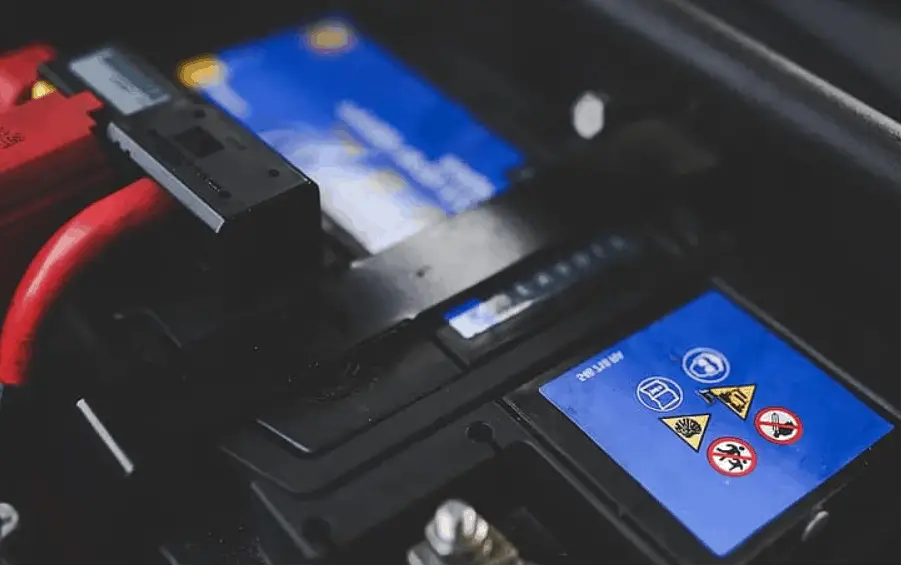
- BEGINNERS GUIDE
G. Yoganand
Your RV battery will not last forever. And this means it will need a replacement, at some point.
Worried and want to know if your RV battery is gone bad?
Read on to learn more about the signs that your RV battery is going bad, how to test it at home, how to extend its lifespan, and how to choose the best battery for your RV.
Signs that tell RV battery is bad
If you are experiencing problems with your RV battery such as erratic performance or failure to hold charge for long, there is a high chance that it’s going bad or it’s already damaged.
And unless this issue is resolved, then your battery will continue giving you issues, thus making your life on the road unbearable. To avoid these issues, you need to check your battery as soon as possible, so that you can determine whether it’s the cause of the power problems in your RV.
You can easily determine this by inspecting your RV battery. So, what signs tell you the battery is going bad or it’s already damaged?
You can verify if the flooded battery is bad by verifying for a physical damage but same cannot be done for sealed AGM or gel battery. Measuring Voltage is the best solution for such batteries. To verify, you can perform load testing on a fully charged battery; if the voltage drops down fast within around 30 seconds or goes down to 0 V then be sure the battery is going bad.
Here are some things to verify it visually:
- Bump or bulge in the case
- Broken terminals
- Ruptured or cracked plastic casing
- Discoloration
- Excessive leaking
If the terminals are loose or broken, then you are putting yourself in grave danger using the battery in that condition. They can lead to short-circuiting, and the battery may even explode, leading to serious injuries.
If everything else looks in good condition but your RV battery has a bulge or bump, then this is a sign of overcharging. Cracks, holes, and splits may not cause performance problems. However, it’s not safe to use the battery when it’s in that state, meaning it will be advisable to replace it.
Testing the Battery At Home
If you’ve conducted a physical inspection of your RV battery and you’ve found any damage that is causing the malfunctioning, then the issue may be coming from inside the cell.
And the only way to determine this is to conduct some tests. You can test your RV battery in two main ways – carrying out a voltage test and load testing your battery.
Voltage Test
You can test your battery’s voltage either using a voltmeter or multimeter, depending on your preferences. Regardless of the device that you use, make sure your RV battery is fully charged. Once it’s fully charged, you should then allow it to sit for at least 3 to 5 hours.
Below table shows what voltage it should read at different % levels.
After this duration is over, then you can use your device to test its voltage. Your battery should read somewhere between 12.7 volts to 13.2 volts if it has retained 100% charge.
If the device reads anywhere between 0 volts, then it’s highly likely that your RV battery experienced short-circuiting. If the multimeter can’t go past 10.5V, then it’s a sign your battery is already dead, and it will need a replacement.
A battery is fully charged but the multimeter reading is 12.4V or less, then there is a high chance your battery is sulfated. A sulfated battery will also need to be replaced since it will never attain a full charge. It will also discharge faster than normal.
Here is a detailed guide on how to test and monitor a RV battery .
Load-Testing the Battery
Load testing is an equally effective method of determining the performance capabilities of your RV battery. You can either take your battery to a local automotive shop for testing or do it at home.
If you opt to do the testing at home, then you will need a digital voltmeter, just like the one you used in the voltage test.
You should then connect your voltmeter to the battery’s terminals and start your RV. If your RV battery is in perfect condition, then it should comfortably maintain a load of approximately 9.5V to 10.5V for 30 seconds. If it holds the load for a few seconds and then drops steadily, then it has an issue.
As you can see, it’s not hard to determine whether your RV battery is getting bad or it’s already there. You simply need a battery charge and a testing device such as a multimeter or digital voltmeter.
If your RV battery has shown any of the symptoms discussed above, then it’s time to replace it.
Check out how you can troubleshoot a battery that does not hold charge .
How Long Should a Battery Usually Last?
On average, your RV battery should last approximately 5 to 7 years. However, the actual duration will depend on how often you use your battery, how well you maintain it, as well as the type of battery you are using in your RV.
For instance, deep-cycle batteries may only last approximately 500 charge cycles while a lithium-ion battery may last for 5,000 charge cycles or even more.
What to Do to Make Sure Battery Lasts Long?
As noted above, your RV battery’s lifespan will depend on how you utilize it and how well you maintain it. Therefore, proper use and maintenance will help to extend your battery’s life.
Before we see different actions you should take to increase the life of a RV battery lets understand what things lead to battery failure.
Below are the major factors that lead to failure of a lead acid battery in RV.
- Over charging
- Under charging
- Insufficient Maintenance
To start with, sulfating is a process that kills the battery over a period of time. When the battery is discharged, it starts to accumulate sulfate on the plates but when you recharge the battery, the sulfate is converted back into plates.
This is a normal process but if the battery remains discharged for a longer duration the sulfate conversion back into the plates becomes hard and that may result in damaging the battery. Such a battery can no longer be charged fully and then it leads to battery failure.
When the battery discharges, you also need to charge it to full. Undercharging will ultimately lead to sulfation over a period of time.
Next is overcharging . This is however prevented by most modern converters that prevent overcharging. But, on older batteries, overcharging the battery can result in boiling of the electrolyte leading to battery failure.
Parasitic loads on battery can result in discharging over a period of time. This are loads that can go unnoticed but the battery will continue to loose its charge. This normally happens when the RV is in storage for a longer period of time.
Things like CO detectors, TV, antennas can absorb power even when not in fully functional mode. Therefore, its always better to unplug the battery and store separately. Modern battery systems come with switch that completely disconnects it from the appliances.
Another thing is self discharging . Even when the battery is fully disconnected, it will still loose some charge. It can be as high as 10% per month and therefore, its always advisable to check the battery and recharge if needed specially during storage.
Here are some tips that will help your RV battery to last long .
✔️ Undertake Routine Care and Maintenance
Recharging your RV battery as soon as possible and undertaking routine maintenance will help to extend its life. If possible, don’t allow your RV battery to remain below 12V. Allowing your battery to remain discharged for extended periods may lead to sulfation, which will eventually ruin it permanently.
✔️ Avoid Exposure to Extreme Weather Conditions
Extremely high temperatures, as well as below-freezing temperatures, can ruin your battery and shorten its lifespan. For instance, extremely high temperatures may reduce your battery’s capacity by approximately 50%. In short, it will make your battery work harder, thus killing it eventually.
Excessive temperatures may also cause your battery to bulge or even blow up. Freezing temperatures, on the other hand, will drain your batteries faster, thus reducing their charge cycles.
Some lithium-ion batteries may even stop charging when exposed to extremely cold temperatures. So, you should always ensure your battery is placed somewhere away from excessive heat and cold.
✔️ Unplug the Parasitic Loads
Devices such as clocks, TV antenna power boosters, appliance circuit boards and LP gas leak detectors, will cause your RV battery to discharge over time.
And the faster they drain your RV battery, the sooner you will have to recharge it, thus reducing its charge cycles over time. Therefore, make sure you unplug all the non-vital appliances and systems whenever you are not using your RV.
✔️ Opt for a Portable Refrigerator
On average, an 8-cubic feet refrigerator will consume approximately 600 watts when it’s left running for the whole day. And as you can see, this is quite a considerable amount of power.
To minimize this power consumption, you can instead opt for a portable generator. Portable generators come equipped with inbuilt batteries, meaning it will not be relying on your RV battery. Using such type of refrigerator will significantly help to extend your RV battery’s life.
✔️ Charge Smaller Devices via Chassis Batteries
It’s advisable to charge smaller devices such as tablets, watches, cellphones, compatible laptops and cameras via the 12-volt USB ports powered by the chassis batteries – instead of turning on the inverter.
As you probably know, the inverter will first have to power itself, convert the battery’s power from DC to AC, and then run this power to all the outlets in the RV. And this will be a considerable amount of power drain on your RV battery.
Considering their power drain from the chassis batteries will be negligible, then there is no point in turning on the big inverter.
✔️ Use a Generator Temporarily For Heavy Consumers
If you regularly use electric frying pans, a microwave or a griddle, then you should consider powering them via the generator instead of the RV battery.
Even if you use them for half an hour or so, these appliances will drain your RV battery fast. So, if you will be on the road for several months, then you should consider bringing along a generator, which you can use to power these heavy consumers.
What battery is best for RV
There are several types of RV batteries on the market. And each battery comes with its pros and cons. With that said, deep-cycle batteries and lithium batteries are the two most popular RV batteries. Let’s take a closer look at each type of battery:
Deep-cycle Batteries
A deep-cycle battery is basically a lead-acid battery type. It’s similar to the one you will find in golf carts and boats. It operates just like a car battery. But unlike a car battery, a deep-cycle battery will produce a steady amount of power over a longer period.
Car batteries, on the other hand, produce a lot of power over a short period. Deep cycle batteries are available in different types such as absorbed glass mat or AGM, flooded wet-cell batteries as well as gel-type batteries. They are also available in different sizes, with the larger ones producing more power than the smaller ones.
Lithium-ion Batteries
Phones, laptops, tablets and other battery-powered portable devices, normally use lithium-ion batteries. Lithium-ion batteries are newer, lighter, smaller and more compact than lead-acid deep-cycle batteries.
Furthermore, their maintenance needs are lower, compared to lead-acid batteries. Also, lithium-ion batteries can completely discharge, without damaging the cells. But as you may expect, lithium-ion RV batteries are more expensive than deep-cycle RV batteries.
What type of battery is best for RV will depend will depend on your power consumption needs, your budget and personal preferences. For instance, if you are on a tight budget, then a deep-cycle battery will be ideal for your situation. On the other hand, if you have some dollars to spare, then you should opt for big, lithium-ion battery.
Final Thoughts
Your RV battery is a vital component in your motorhome or travel trailer internal setup. It will power all the electrical appliances in your RV, thus making your coach more comfortable. So, you need to ensure that your RV battery is in perfect working condition, at all times. And once it starts malfunctioning, then it’s time to replace and recycle it.
You Might Also Like
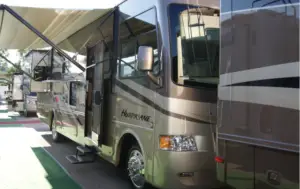
How to protect RV Awning

What is the Best RV for Boondocking (Tips For Choosing)
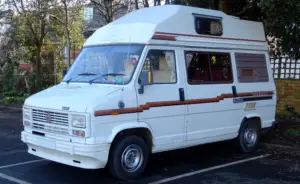
8 Reasons To Avoid Class B RV (Pros and Cons Compared)
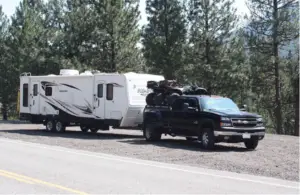
Should i buy a new or used travel trailer

How Long Do RV Batteries Last?
On average, a typical RV battery lasts between 4 to 5 years. However, with good care and the right temperature, your RV battery can last up to 8 years. Of course, this varies with the type of battery, discharge depth, and even the ambient temperature.
Extending the life of your battery is not that hard. You just need to follow some tips about basic care and maintenance.
Here’s all you need to know about your RV battery’s lifespan and how you can prolong it.
Table of Contents
Average Lifespan of An RV Battery
An RV battery typically lasts between 4 and 5 years. However, as you may have guessed, this depends on the type of battery you use and many other factors.
The 4–5 year estimate is for AGM batteries , which are rated at 12V. If properly maintained, your AGM battery can even last you 8 years. However, if you’re using gelled or golf-cart batteries, expect a dead battery by 2-6 years.
Maintenance is necessary for a battery. When neglected, any battery can die soon. And the worst part is, there’s almost no telling when a neglected battery will fail you.
Some battery manufacturers may also denote their battery’s lifespan in terms of the number of charge-discharge cycles. But this usually indicates the maximum charge-discharge cycles when the battery is only 80% charged. So, the estimate is quite rough but a good number to go off of.
How long does RV battery charge last?
We talked earlier about the lifespan of the battery throughout the years. But how much can a typical RV battery hold in a single charge?
On average, a 12V battery will last you about 2-3 days if you are going boondocking .
However, the answer isn’t set in stone and varies, given the number of electronics on your RV and how often you use them.
Your RV houses a lot of electronics, both inherent to the RV and external. Let’s assume a typical RV setup that includes a gas refrigerator, lights, and a water pump. And let’s also have a few power outlets for charging your phones.
But the battery life on a single charge goes down as the number of electronics and their usage goes up.
This is why you’ll need to manually calculate the power consumption of each electronic device and do the calculations yourself. Some devices will consume more power than others, such as a fridge or an air conditioner.
How To Make Your RV Battery Last Longer
Recharging a discharged battery.
First of all, never let your battery sit discharged for extended periods. A battery with a low charge will form small crystals on the plates, known as sulfation. This commonly occurs on lead-acid batteries.
To avoid this, always recharge the battery as soon as you can.
Don’t Discharge to 0%
When discharging the battery, never let it fall to 0%. The ideal discharging limit (or discharge “depth”) is about 20%. If possible, keep the battery charged to 50% or above at all times. A full discharge cycle will significantly lower the battery’s capacity over time.
Don’t Charge 100%
Just like you shouldn’t discharge to 0%, it’s also ideal to never charge to 100%. Both can be incredibly harmful to your battery’s life. Even the charge-cycle rating on your battery is measured at an 80% charge depth. So, ideally, you want to change the battery to up to 80%.
It seems quite inconvenient that you can’t enjoy all of the charges your battery has to provide. But if you want to squeeze those extra years out of your battery, that’s the way to go.
Avoid Parasitic Loads
Even when your battery isn’t connected to any outstanding loads, your RV still has many parasitic loads. These loads will slowly but surely deplete the battery’s charge. While not destructive in the long run, they may lead to unnecessary power loss.
Parasitic loads include LP gas leak detectors, stereos , antenna power boosters, and clocks. Some of these you may want to keep, such as the leak detectors. But others are just unwanted loads. If you have a battery disconnect switch, remember to turn it to the OFF position.
Avoid Overcharging
Overcharging occurs when your battery is charged past 100%. Now, on smarter batteries, this is relatively uncommon, as they have overcharge protection. But once overcharged, the acid in a battery can boil, which can, at best, lead to lower battery capacity. And at its worst? You could be looking at a fire hazard.
Avoid leaving your battery charging overnight or unsupervised. Even if your battery has overage protection, stay on the safe side, and disconnect as soon as the battery is charged. Of course, you shouldn’t be setting it to a full 100% anyway.
Maintain The Right Setting
Lastly, maintain the right ambient conditions. This means keeping the regular working temperature of the battery. So, don’t place the battery close to the engine or any place where it gets too hot or cold. Likewise, do not leave it out in the sun. And avoid exposing it to too much humidity.
With that being said, know when it is time to say goodbye to your battery. If the battery has visible damage, discoloration has lost its capacity and appears dead; it’s gone for good. Instead of trying to revive a dead battery, you can save yourself from a disaster by buying a new one.
Factors Affecting How Long RV Batteries Can Last
What causes an RV battery to lose its capacity over time? Here are a few things that can affect your battery life:
Type Of Battery
Different types of batteries have different lifespans. A typical RV battery has a lifespan of around 4-8 years. That range alone shows the stark difference between RV batteries. The max capacity of the battery has little to do with how long it will last. Instead, the construction and quality are major defining factors.
Ambient Temperature
This isn’t just some fancy specification. Most batteries will come with a rated working temperature on them. You must maintain that temperature if you want the battery to last longer. Batteries that get too hot risk acid boiling, which is never good. At best, this will take a few months off your battery’s lifespan. And at worst, it could kill the battery and cause a fire or electrical hazard.
Parasitic Loads
Some loads stay on even when you’re not using any electronic device and have unplugged all the power-hungry equipment. Parasitic loads include leak detectors, clocks, and antenna power boosters.
These loads will slowly suck out the battery’s juice. And in the long run, they will discharge your battery to 0%, which will reduce overall battery life.
Maintenance And Neglect
How well you maintain the battery decides how long it lasts. A neglected battery will die in no time. Check the maintenance manual of the battery to learn how to take proper care of it.
Boondocking On Battery Power
Boondocking, also known as Dry Camping, refers to camping in an RV without any hookups. If you don’t already know, a hookup is a service provided by the camping ground you’re camping at. Hookups include access to electricity, water, and sewage.
When you’re dry camping, you don’t have any hookups, which means you must generate and store the electricity yourself. So, where does the battery come in? In most cases, the power is either provided by a generator or a solar panel . The battery is used to store the power for later use.
While batteries supplied with the RV are suitable for a few boondocking adventures, they’re not suited for long-term use. So, if you plan on boondocking frequently, consider buying a battery suitable for boondocking .
Boondocking does not affect the battery’s lifespan. But since your battery has to power everything in the RV, it can often be overloaded or discharged to 0%. So, it’s critical to judge the battery’s capacity and your requirements beforehand.
The Minimum Battery Life
We talked about how many years you can extract from a healthy battery. But what’s the lowest battery life you can get from a battery? Depending on how you use and abuse it, your battery can even die instantly.
Most 12V RV batteries will last a minimum of 4 years on good maintenance. And if you’re keen on saving juice, you can extend that to 8 years.
On 6V batteries , on the other hand, the situation is a lot more different. You can extract a minimum of 2 years from the battery if you maintain it well.
And if you don’t? Well, it’ll hardly take a few months. After that, overcharging and heating can even kill the battery instantly!
Some people have the habit of replacing the battery every 1-2 years. A replacement that frequent isn’t necessary if you don’t notice any outstanding issues with the battery. You can often extend the battery life via several methods that we listed above.
Is It Bad to Leave Your RV Plugged-in All the Time?
Yes, an RV battery that stays plugged in will lose charge. This not only means low battery life on a single charge but can lead to long-term damage. However, you can overcome this by either disconnecting the battery when not using it or installing a 3 or 4-stage smart charger.
How Do You Know If Your RV Battery Is Bad?
Visually, if the battery has broken terminals, leaking, ruptures in the housing, discoloration, or a bulge, it isn’t good. Likewise, if the battery loses charge faster or takes longer to charge than it used to, that’s also a warning sign.
You can also check the battery’s output voltage using a digital multimeter or voltmeter. For example, a healthy 12V battery, on 100% charge, should provide 12.7V. And a battery on 50% charge should provide 12.20V. Of course, slight variations may occur depending on your equipment. But if the voltage is below those thresholds, you know you’re losing battery life.
Do You Need a Surge Protector for an RV?
Yes, a surge protector is a must on RVs. It protects the RV’s electrical systems from permanent damage caused by low voltage and power surges.
Should I Disconnect My RV Battery for Winter?
Yes, disconnect it and keep it in a warm area where the temperature is within the recommended temperature range. If the temperature falls below freezing, it could freeze over the water inside the battery. Also, note that, during the winters, the charging capacity of your battery may be lowered.
Can You Run an RV Without a Battery?
A battery is a great way to store charges for later use. Now, if you have a hookup or a generator, you can also use a power converter . So, you won’t need a battery in that case. But not all power converters are efficient. So, be sure to check the converter beforehand.
The battery on an RV is just as crucial as its engine. After all, how else will you power up all your electronics? RV batteries provide clean and consistent power to your devices. These include your air conditioner, fridges, and power sockets.
But the sad reality is that these crucial components are often overlooked during maintenance. Indeed, you can extend your battery life to up to 8 years with the right tools and right knowledge.
To conclude, RV batteries, when properly maintained, can last anywhere from 4 to 8 years. However, your RV’s battery life can be reduced with neglect, lack of proper use, too much heat, overcharging, and even parasitic loads.

I`m a current Law Enforcement Officer working within the Counterterrorism Bureau in New York State. I have been Camping for over 20 years. My styles of camping include tent, car, truck, van, and RV travel trailer. I have a YouTube channel where I teach all types of camping with an entertaining method: https://youtube.com/@TheSmallsRVAdventures
Similar Posts

How to Set Up a Campsite with a Teardrop Camper in Less than 5 Minutes
Setting up a campsite with a teardrop camper in less than 5 minutes may seem like an impossible task, but with the right equipment and a little bit of practice, it can be done. Want to know in what way? Here are some tips on how to do it. What should you consider before your…

How To Charge An RV Battery From A Tow Vehicle
RV batteries are heavy, large, and relatively new. If you own an RV and you need to move it, you may not have the tools to do so without the help of a tow vehicle. Most tow vehicles don’t have the capability to fully charge an RV battery. How To Charge An RV Battery From…

13 Amazing DIY Camper Remodel
As it ages and weathers, you search for different tactics to enhance the RV and get it modernized without needing to buy a completely new vehicle. Since an RV is a little space, it’s a really doable project in a few weekends time! Actually, remodeling the RV you have might be your best choice, or…

How to Mount a TV in Your Trailer: A Step-by-Step Guide
It’s time to mount your TV in the living room of your trailer. But where do you start? The first thing you’ll need is a drill, which will allow you to make holes in the wall for mounting screws or nails. You’ll also want some basic tools like a level so that everything lines up…

Tankless Water Heater Sounds Like A Jet Engine: 3 Handy Fixes Listed!
It can be very unsettling when a tankless water heater sounds like a jet engine. I faced the same problem a while back but luckily got it fixed. If you encounter foreign irritating sounds from your water heater, I will guide you on the causes and offer fixes to alleviate the malady. Without further ado,…

Keep Your RV Clean As A Whistle With These Useful Tips
Every DV owner loves the idea of taking their home on the road with them. There’s nothing like hitting the open road, free from the everyday hustle and bustle. However, one thing that can put a damper on the RV experience is a dirty and cluttered home away from home. No one wants to find…

You are here: Home // How Long Do RV Batteries Last?
This post may contain affiliate links or mention our own products, please check out our disclosure policy .
How Long Do RV Batteries Last?
Published on December 18th, 2021 by Lynne Fedorick
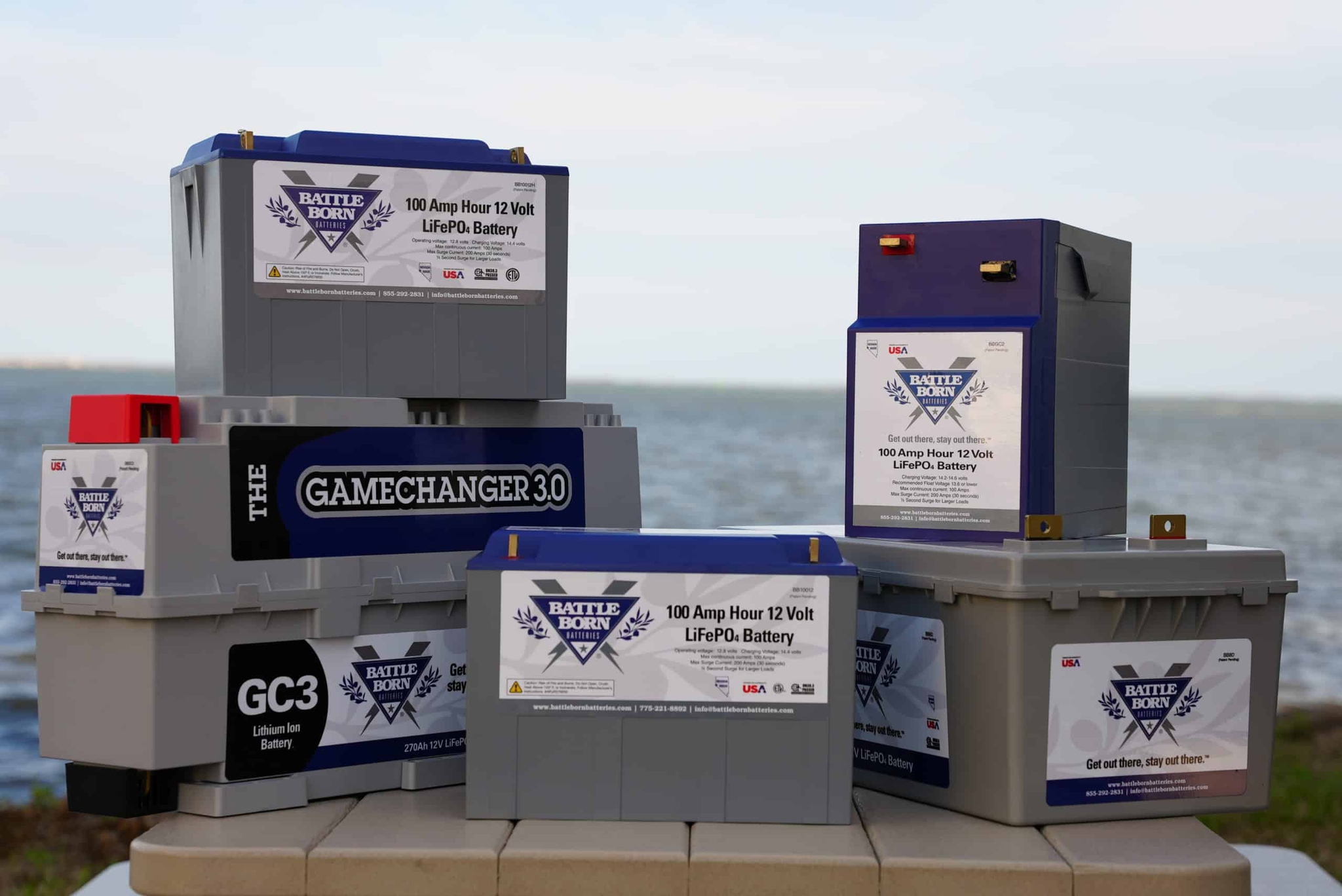
How long do RV batteries last? Well, that depends on a few things. The type of RV battery, whether it’s been maintained properly, and charge levels and discharge levels all factor into how long an RV battery will last.
3 Types Of RV Batteries
There are three types of RV batteries. Each type of RV battery has its own life expectancy between 6 years and 10 years. Flooded lead-acid batteries have the shortest lifespan and lithium batteries have the longest lifespan of all three battery types. No matter what type of battery you have, they require care to ensure that they last as long as they are supposed to, although LifePO4 lithium batteries are maintenance-free.
Each of the 3 types of RV batteries has its own life expectancy. Let’s dive into the 3 RV battery types, how long you can expect them to last, and what each of them needs to maximize its lifespan.
DON’T MISS OUT ON DO IT YOURSELF UPDATES
Sign up for the newsletter today.
Please enter a valid email address.
An error occurred. Please try again later.

Thank you for subscribing to the Do It Yourself RV newsletter, keep your eye on your inbox for updates.
Deep cycle rv flooded lead acid batteries, how long do flooded lead-acid rv batteries last 3-6 years.
Flooded lead-acid batteries are the most popular RV batteries. These batteries are usually the lowest priced of the three battery types and they are almost always the ones that come with our RVs. Flooded cell batteries contain 6 cells filled with lead plates that must be kept covered in liquid sulfuric acid in order to store electrical energy. This is where the name “flooded cell” comes from.
Maintenance needs:
Flooded cell RV batteries last longest if they are maintained according to the battery manufacturer’s directions. These batteries must be checked and refilled with distilled water every 2-6 weeks. The length of time between fills depends on how much you are using them, but allowing them to run dry even once will significantly impact their lifespan.
Flooded cell lead-acid batteries should never be discharged below 50% of their capacity, so you need to monitor their levels. DIscharging more than this will reduce their life expectancy significantly. It’s worth noting that these batteries self-discharge at a rate of 4% per week, so keeping them charged with a solar panel, or by other means, is necessary to maximize their life.
Deep Cycle RV Absorbed Glass Mat (AGM) Lead Acid Batteries
How long do agm rv batteries last 6-10 years or more.
Absorbed glass mat (AGM) type batteries cost more than flooded lead-acid batteries, but still cost less than lithium batteries. These batteries also contain sulfuric acid and lead plates, but they also contain a glass mat separator that wicks an electrolyte solution between battery plates.
As the battery operates, the electrolyte is transferred from the glass mat to the battery plates. The mat contains enough electrolyte for the battery to deliver its full capacity and if the battery is tipped over, the electrolyte will not spill.
Maintenance needs
AGM batteries are virtually maintenance-free, in that they are sealed and never require refilling. They will last longer if they are charged only with the manufacturer’s suggested charger and never over- or under-charged. Discharging AGM batteries more than 50% will reduce their life expectancy significantly. Self discarge ranges between 1%-4% per month.
Lithium Iron Phosphate Batteries
How long do lithium rv batteries last 10 years or more.
Lithium RV batteries have the longest lifespan of any RV battery and are completely maintenance-free. They cost around $700-$1600, so their cost keeps many RVers from using them. However, they have so many advantages over other battery types, they should definitely be on everyone’s RV wish list.
Lithium-ion batteries are sealed batteries that function in much the same way as lead-acid batteries. The difference is that lithium-ion RV batteries contain lithium iron phosphate instead of lead and acid. Known as LifePO4, lithium-ion batteries are far less susceptible to overheating and explosive chemical reactions than the lithium-ion batteries used in cell phones and laptops.
Lithium LifePO4 Batteries Have a Few Advantages
These sealed batteries weigh half of what other battery types weigh and can be stored in any position since they are sealed (and don’t contain any sulfuric acid). They can even be discharged to 100% and recharge much faster than any other type of RV battery, so you won’t need as many lithium batteries as lead-acid batteries.
“A high-end deep-cycle lead-acid battery costs about $180. Multiply that by 10 and you get $1800. In the time it takes to use up one $1300 lithium battery, you could have spent $1800 replacing lead-acid batteries. This is over the years of course. When determining if RV lithium batteries are right for you, it’s important to factor in cost over time and not just the initial cost of the hardware.” Levi Henley , Camper Report
Make sure you keep track of all your RV maintenance and repairs with an online tool such as RV LIFE Maintenance . Not only can you keep all of your documents in one place, but you’ll also receive timely reminders when maintenance is due to help you avoid costly repairs and potentially serious accidents.
Related articles:
- Protect Your RV Battery In Winter Storage
- Why It’s Important To Keep Your RV Batteries Charged Properly
Share this post:
Related posts:.

RV Survival Guide for Burning Man: Tips and Tricks

RVs With Built-In Solar: A Guide To The Best Models For 2024
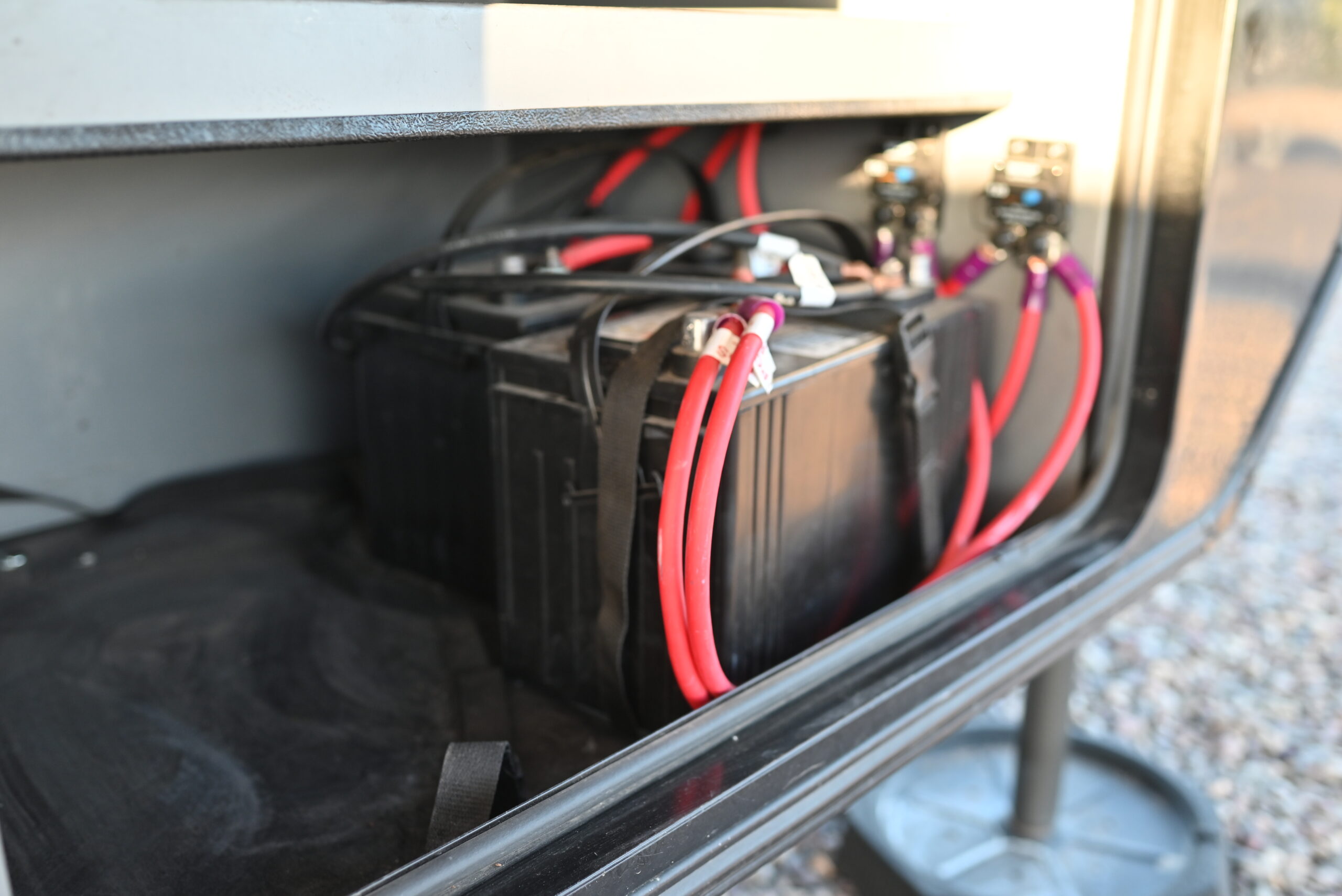
Keep Your RV Battery Safe From The Scorching Summer Heat
- News and Info
- Accessories & Gear
- Tips & Guides
How Long Do RV Batteries Last: Tips to Extend the Life of RV Batteries
- by Will Masoner
- June 23, 2020 September 13, 2023

Are you curious about how long do RV batteries last. The lifespan of an RV battery can vary depending on a few factors. Generally, a well-maintained deep-cycle RV battery should last between 4 and 8 years. However, many RV owners find themselves replacing their batteries more frequently than that.
One factor that can impact the lifespan of your RV battery is the type of battery you have. There are three main types of RV batteries: flooded lead-acid batteries, AGM batteries, and lithium batteries. Flooded lead-acid batteries have the shortest lifespan, typically lasting between 3 and 5 years. AGM batteries can last between 4 and 7 years, while lithium batteries can last up to 10 years. Keep in mind, these are just general guidelines and your battery’s lifespan may vary depending on usage and maintenance.
Another factor that can impact the lifespan of your RV battery is how you use it. If you frequently discharge your battery below 50% of its capacity, you may be shortening its lifespan. Similarly, if you frequently overcharge your battery, you may be damaging it. Proper maintenance and usage can help extend the life of your RV battery.
Understanding RV Batteries
As an RV owner, understanding your RV batteries is crucial. Your RV relies on its battery to power everything from lights to appliances, and it’s important to know how long your battery will last and how to maintain it properly.
Several types of RV batteries are available, including lead-acid, AGM, and lithium batteries. Lead-acid batteries are the most common type of RV battery and are often used in deep-cycle applications. AGM batteries are a newer type of lead-acid battery that are maintenance-free and have a longer lifespan. Lithium batteries are the most expensive type of RV battery but have the longest lifespan and are the most efficient.
The lifespan of an RV battery varies depending on the type of battery and how it is used and maintained. Generally, a lead-acid battery will last between 3-5 years, while an AGM battery can last up to 7 years. Lithium batteries have the longest lifespan and can last up to 15 years.
To extend the lifespan of your RV battery, it’s important to maintain it properly. This includes keeping it clean and dry, checking the water levels in the battery regularly, and ensuring that it is properly charged and discharged. It’s also important to avoid overcharging or undercharging your battery, as this can significantly reduce its lifespan.
In addition to understanding the lifespan of your RV battery, it’s important to know the difference between a deep-cycle battery and a starter battery. A deep-cycle battery is designed to provide a steady amount of power over a longer period of time, while a starter battery is designed to provide a burst of power to start the engine. It’s important to use the correct type of battery for each application to ensure optimal performance.
Related Posts:
- How Long Do Odyssey Batteries Last: Odyssey Battery Owner Experience
- Best Odyssey Battery Review: What Battery is Right For You
Factors That Affect Battery Life
The lifespan of an RV battery can vary widely depending on several factors. Here are some of the key factors that can affect the life of your RV battery:
- Discharge : The depth of discharge (DoD) is a crucial factor affecting your RV battery’s life. The deeper the discharge, the shorter the lifespan of your battery. It is recommended to keep the DoD of your battery below 50%.
- Age : The age of your RV battery is another important factor that affects its lifespan. Most RV batteries last between 4 and 6 years, but this can vary depending on the type of battery and how well it is maintained.
- Voltage : The voltage of your RV battery can also affect its lifespan. Overcharging or undercharging your battery can cause damage and reduce its lifespan.
- Temperature : The temperature of your battery can affect its performance and lifespan. Extreme heat or cold can cause damage to your battery and reduce its lifespan.
- Usage : Your battery’s use can also affect its lifespan. If you use your RV frequently and heavily rely on your battery, it will likely have a shorter lifespan.
- Parasitic loads : Parasitic loads draw power from your battery even when your RV is not in use. These loads can drain your battery and reduce its lifespan.
- Humidity : High humidity can cause corrosion and damage to your battery, reducing its lifespan.
- Ambient temperature : The ambient temperature of your RV can also affect the lifespan of your battery. If your RV is stored in a hot or cold environment, it can cause damage to your battery and reduce its lifespan.
Proper maintenance and care can help extend the lifespan of your RV battery. Be sure to keep your battery charged, maintain the proper fluid levels, and store it in a cool and dry place when not in use.
- Battery Ratings
- How Long Will A Deep Cycle Battery Last?
RV Battery Maintenance and Care
Maintaining and caring for your RV battery is essential to ensure it lasts as long as possible. Here are some tips to help you keep your battery in good condition:
- Check the water levels regularly and add distilled water as needed. Over time, the water in the battery will evaporate, so it’s important to keep an eye on the levels and top it up when necessary.
- Avoid overcharging your battery. Overcharging can cause damage to the battery and shorten its lifespan. Use a battery charger with an automatic shut-off feature to prevent overcharging.
- Keep the battery clean and free of corrosion. Use a wire brush to remove any buildup on the terminals and clean them with a mixture of baking soda and water. Dry the terminals thoroughly before reconnecting them.
- Monitor the fluid levels in the battery. If the levels are low, add distilled water to bring them back up. Low fluid levels can cause the battery to overheat and damage the internal components.
- Avoid undercharging the battery. If the battery is not fully charged, it can develop sulfation, which can reduce its capacity and lifespan. Use a battery charger with a float mode to keep the battery fully charged when not in use.
By following these tips, you can help extend the life of your RV battery and avoid having to replace it prematurely.
- 10 Tips to Extend the Life of RV Batteries
- How to Charge An AGM Battery: Step by Step Guide
Powering Your RV
Powering your RV is crucial to enjoying your travels. Your RV battery system provides power to your appliances, lights, and other electrical devices. Understanding how to power your RV is important for a comfortable and safe trip.
Several ways to power your RV include shore power, solar panels, and boondocking. Shore power is when you plug your RV into an electrical outlet at a campground or RV park. This provides a reliable power source and allows you to run all of your appliances and devices without worrying about running out of battery.
Solar panels are another option for powering your RV. They convert sunlight into energy stored in your RV battery system. This is a great option for those who enjoy boondocking or camping in remote areas where shore power is not available.
Boondocking is when you camp in a remote location without access to electrical hookups. In this case, you will need to rely on your RV battery system to power your appliances and devices. Monitoring your power usage and conserving energy to avoid draining your battery is important.
When it comes to your RV battery system, there are two main types: flooded lead-acid batteries and lithium batteries. Flooded lead-acid batteries are more affordable but have a shorter lifespan. Lithium batteries are more expensive but have a longer lifespan and are more efficient.
In addition to choosing the right type of battery, it is important to properly maintain your RV battery system. This includes monitoring the battery charge, using a charger when necessary, and avoiding over-discharging the battery.
Understanding how to power your RV is essential to a successful trip. Whether you are using shore power, solar panels, or boondocking, choosing the right battery and properly maintaining your RV battery system is important.
- How Many Amp-Hours Do I Need For My RV
Storage and Safety
Proper storage of your RV batteries is crucial to extending their lifespan. When storing your RV for an extended period, it is recommended that you remove the batteries and store them in a cool, dry place. You may also want to consider investing in a battery tender or maintainer to keep the batteries charged and prevent them from discharging completely.
It is important to note that lead-acid batteries commonly used in RVs can release hydrogen gas during charging. This gas is highly flammable and can be dangerous if not properly ventilated. Therefore, it is important to store your batteries in a well-ventilated area and never smoke or use an open flame near them.
Another safety consideration is the battery disconnect switch. This switch is designed to disconnect the battery from the RV’s electrical system when the RV is not in use, preventing parasitic loads from draining the battery. Using this switch when storing your RV is important to prevent the battery from discharging completely and potentially damaging it.
In addition to proper storage and safety precautions, it is important to consider the cost of RV batteries. While lithium batteries have a longer lifespan than lead-acid batteries but also have a higher price tag. It is important to weigh the cost and benefits of each type of battery to determine which is the best fit for your motorhome or travel trailer.
Finally, it is important to know the potential for thermal runaway, which occurs when a battery overheats and can lead to a fire. This can be caused by overcharging, over-discharging, or a short circuit. To prevent thermal runaway, it is important to maintain and monitor your RV batteries properly and to replace them if they show signs of damage or wear.
Replacing and Upgrading RV Batteries
Eventually, you will need to replace your RV battery, whether it’s due to age, damage, or other factors. When that time comes, you have a few options to consider.
New Battery
The most straightforward option is to replace your old battery with a new one of the same type. This is a good choice if you are happy with the performance of your old battery and don’t want to make any major changes.
If you are needing an upgrade, consider switching to a lithium iron phosphate (LiFePO4) battery . These batteries are becoming increasingly popular among RVers because they offer several advantages over traditional lead-acid batteries. LiFePO4 batteries are lightweight, cost-effective, and have a longer lifespan than lead-acid batteries.
The advantages of LiFePO4 batteries don’t stop there. They also charge faster, have a higher discharge rate, and are more efficient than lead-acid batteries. This means you can use more of your battery’s capacity before recharging, which is especially useful if you’re boondocking or camping off the grid.
Lightweight
Another advantage of LiFePO4 batteries is their weight. They are significantly lighter than lead-acid batteries, which can be a big factor for RVers trying to keep their rig as light as possible.
Cost-Effective
While LiFePO4 batteries are more expensive upfront than lead-acid batteries, they are often more cost-effective in the long run. This is because they last longer and require less maintenance than lead-acid batteries.
If you’re considering upgrading to a LiFePO4 battery, one brand to check out is Renogy. Renogy offers a range of LiFePO4 batteries that are specifically designed for use in RVs. They are known for their high quality and reliability; many RVers swear by them.
No matter which option you choose, be sure to do your research and choose a battery that will meet your needs and fit your budget.

Troubleshooting and Repair
If you’re experiencing issues with your RV battery, you can try a few things before calling for service. First, check the battery for any signs of damage or corrosion. If you notice any, it’s best to repair or replace it with a professional.
If your battery isn’t holding a charge, it could be due to several reasons. One common issue is overcharging, which can lead to premature battery death. Be sure you’re not leaving your battery on a charger for too long after it reaches its maximum charge.
Another issue that can cause your battery to die is undercharging. Make sure your battery is getting enough charge by checking the voltage regularly. If it’s consistently low, you may need to replace your battery or have it serviced.
If your battery is emitting strange smells, it could be a sign of a serious issue. Battery acid has a distinct smell; if you notice it, you should have your battery inspected immediately. It could be leaking acid, which can be dangerous and cause damage to your RV.
Overall, if you’re experiencing issues with your RV battery, it’s best to have it inspected by a professional. They can diagnose the issue and provide the necessary repairs or replacements to get your battery back in working order.
How Long Do RV Batteries Last FAQs
How much do rv batteries cost.
The cost of RV batteries varies depending on the type and quality of the battery. Flooded lead-acid batteries are the most affordable, ranging from $50 to $200. AGM batteries are more expensive, ranging from $150 to $500. Lithium-ion batteries are the most expensive, ranging from $500 to $2000.
How long will an RV battery last boondocking?
The lifespan of an RV battery while boondocking depends on various factors, such as the type of battery, the number of appliances used, and the frequency of charging. On average, a deep-cycle battery can last up to 2-3 days while boondocking. However, this can be extended by using energy-efficient appliances and charging the battery using solar panels or a generator.
Should I disconnect my RV battery when plugged in?
It is not necessary to disconnect your RV battery when plugged in. Leaving your battery connected while plugged in can help maintain its charge and extend its lifespan. However, it is important to ensure that your battery is charged properly and that the charging system works correctly.
How long can a deep cycle battery last without charging?
The lifespan of a deep cycle battery without charging depends on various factors, such as the type of battery, the number of appliances used, and the temperature. On average, a deep-cycle battery can last up to 2-3 days without charging. However, this can be extended by using energy-efficient appliances and minimizing battery usage.
How long will a deep cycle battery last with an inverter?
The lifespan of a deep cycle battery with an inverter depends on various factors, such as the type of battery, the size of the inverter, and the number of appliances used. On average, a deep-cycle battery can power a 1000-watt inverter for around 2-3 hours. However, this can be extended by using energy-efficient appliances and minimizing battery usage.
How often should an RV battery be replaced?
The lifespan of an RV battery depends on various factors, such as the type of battery, the frequency of charging, and the level of maintenance. On average, a deep-cycle battery can last 4-6 years, while an AGM or lithium-ion battery can last up to 10 years. Monitoring your battery’s performance and replacing it when necessary is important to ensure optimal performance.
Privacy Overview

How to Maintain and Replace Your Travel Trailer’s Batteries
Proper maintenance and replacement of your travel trailer’s batteries are essential for optimal performance and ensuring a comfortable and enjoyable RV experience. In this article, we’ll explore various aspects of battery care, from understanding battery types to troubleshooting common issues.
Table of Contents
Understanding the Types of Batteries Used in Travel Trailers: Lead-Acid, AGM, and Lithium
There are three main types of batteries used in travel trailers:
- Lead-acid batteries : These traditional batteries are affordable and widely available but require regular maintenance, such as checking and refilling water levels.
- Absorbent Glass Mat (AGM) batteries : AGM batteries are maintenance-free and more resistant to vibrations and temperature fluctuations, making them a popular choice for travel trailers.
- Lithium batteries : Although more expensive, lithium batteries offer longer life, faster charging, and better performance in a wide range of temperatures.
How to Properly Store and Maintain Travel Trailer Batteries During Off-Season Periods
During off-season periods, it’s essential to properly store and maintain your travel trailer batteries to prevent damage and extend their lifespan. Follow these steps:
- Disconnect the batteries and remove them from the travel trailer.
- Store the batteries in a cool, dry place, away from direct sunlight or heat sources.
- Use a battery maintainer or trickle charger to keep the batteries charged during storage.
The Role of Battery Chargers and Maintainers in Extending Travel Trailer Battery Life
Battery chargers and maintainers play a crucial role in prolonging the life of your travel trailer’s batteries. While battery chargers replenish a depleted battery, maintainers help keep the batteries at an optimal charge level, preventing overcharging and undercharging. Invest in a quality battery charger and maintainer to ensure your batteries remain in top condition.
Take a look at our article on: Best 6 RV Battery Box For Your RV And Camper
Regularly Inspecting and Cleaning Travel Trailer Battery Terminals and Connections
Regular inspection and cleaning of battery terminals and connections are vital to prevent corrosion and ensure efficient power transfer. At least once a year, remove the battery cables, clean the terminals and cable ends with a wire brush or terminal cleaner, and apply a corrosion inhibitor to protect against future corrosion.
Troubleshooting Common Travel Trailer Battery Issues: Sulfation, Low Voltage, and Short Circuits
Some common travel trailer battery issues include:
- Sulfation : Occurs when the battery is left in a discharged state, causing lead sulfate crystals to build up on the battery plates. Sulfation can lead to reduced battery capacity and performance. Use a desulfating charger to help reverse the process.
- Low voltage : If the battery voltage drops below the required level, appliances and systems in the travel trailer may not function correctly. Check the battery charger and connections for any issues.
- Short circuits : Short circuits can cause battery drain and damage. Inspect the wiring and connections for signs of damage or wear, and replace as necessary.
How to Safely Remove and Replace Your Travel Trailer’s Battery
To safely remove and replace your travel trailer’s battery:
- Turn off all appliances and systems in the travel trailer.
- Disconnect the battery cables, starting with the negative cable, followed by the positive cable.
- Remove the old battery and replace it with a new one, ensuring it’s the correct type and capacity for your travel trailer.
- Reconnect the battery cables, starting with the positive cable, followed by the negative cable.
Upgrading Your Travel Trailer’s Battery System for Increased Capacity and Performance
To upgrade your travel trailer’s battery system, consider the following:
- Replace older lead-acid batteries with AGM or lithium batteries for improved performance and longevity.
- Add additional batteries in parallel to increase your travel trailer’s overall battery capacity.
- Install a battery monitoring system to help you track battery health and performance, enabling more efficient energy management.
- Consider adding solar panels or other alternative charging methods to supplement your travel trailer’s electrical system.
The Importance of Proper Battery Ventilation in Your Travel Trailer
Proper battery ventilation is essential to prevent the build-up of dangerous gases, particularly hydrogen, which can be emitted during charging. Ensure your travel trailer’s battery compartment has adequate ventilation and is not sealed to allow gases to escape safely.
How to Accurately Test Your Travel Trailer’s Battery Capacity and Performance
To test your travel trailer’s battery capacity and performance:
- Use a multimeter to measure the battery’s voltage. A fully charged 12V battery should read around 12.6-12.8 volts.
- Perform a load test using a battery load tester to check the battery’s ability to deliver power under load.
- Check the specific gravity of each cell in a lead-acid battery using a hydrometer to evaluate the battery’s state of charge.
The Benefits of Solar Panels and Other Alternative Charging Methods for Travel Trailer Batteries
Solar panels and other alternative charging methods offer several benefits for travel trailer batteries:
- Reduced dependence on shore power or generators, allowing for more off-grid camping opportunities.
- Extended battery life, as solar panels help maintain an optimal charge level.
- Lower environmental impact and reduced noise from generator use.
Travel Trailer Battery Maintenance: Water Levels, Specific Gravity, and Electrolyte Levels
For lead-acid batteries, proper maintenance involves regularly checking:
- Water levels : Ensure the water levels are maintained between the minimum and maximum markers. Refill with distilled water as needed.
- Specific gravity : Use a hydrometer to measure the specific gravity of each cell, which indicates the battery’s state of charge.
- Electrolyte levels : Inspect the electrolyte levels in each cell to ensure they are covering the battery plates.
Understanding the Impact of Temperature and Climate on Travel Trailer Battery Performance
Temperature and climate can significantly impact travel trailer battery performance:
- Cold temperatures can reduce battery capacity and slow down the charging process.
- Hot temperatures can cause the electrolyte to evaporate, leading to battery damage and reduced life.
To minimize the impact of temperature and climate, store your batteries in a temperature-controlled environment and keep them properly charged.
How to Choose the Right Battery for Your Travel Trailer’s Specific Power Requirements
To choose the right battery for your travel trailer:
- Determine your travel trailer’s power needs by calculating the total amp-hours required for your appliances and systems.
- Choose a battery with a capacity that can meet your power needs for the desired duration of use.
- Consider upgrading to AGM or lithium batteries for improved performance and lifespan.
Tips for Extending the Life of Your Travel Trailer’s Batteries Through Proper Charging Habits
To extend the life of your travel trailer’s batteries:
- Avoid overcharging or undercharging your batteries, as both can cause damage and reduce battery life.
- Use a quality battery charger and maintainer to maintain optimal charge levels.
- Regularly monitor and test your batteries to ensure they are functioning correctly.
The Role of Battery Isolators and Protectors in Maintaining Your Travel Trailer’s Electrical System
Battery isolators and protectors help maintain your travel trailer’s electrical system by:
- Preventing power from being drawn from the starting battery when using appliances and systems in the travel trailer, ensuring you can still start your tow vehicle.
- Protecting your batteries from overcharging, undercharging, and short circuits.
How to Properly Store and Transport Travel Trailer Batteries to Prevent Damage and Ensure Safety
Proper storage and transportation of travel trailer batteries are crucial to prevent damage and ensure safety. Follow these guidelines:
- When transporting batteries, keep them upright to avoid electrolyte leakage and secure them to prevent movement during transit.
- Store batteries in a cool, dry, and well-ventilated area, away from direct sunlight or heat sources.
- Use protective covers or battery boxes to shield the batteries from damage and accidental short circuits.
- Disconnect the batteries from the travel trailer and any charging sources during storage.
- Installing a Battery Monitoring System to Track Your Travel Trailer’s Battery Health and Performance
A battery monitoring system is an invaluable tool for keeping tabs on your travel trailer’s battery health and performance. It provides real-time information on battery voltage, current draw, state of charge, and more. Installing a battery monitoring system can help you manage your power usage more efficiently and identify potential issues before they become significant problems.
The Significance of Battery Recycling and Proper Disposal of Old Travel Trailer Batteries
Battery recycling and proper disposal are essential for several reasons:
- Many battery components, such as lead and acid, are hazardous to the environment and human health.
- Recycling batteries helps conserve natural resources and reduces the demand for raw materials.
- Most states and localities have regulations governing battery disposal, and improper disposal can result in fines.
When it’s time to dispose of your old travel trailer batteries, take them to a designated recycling facility or participate in a battery recycling program.
Maintaining and Replacing Travel Trailer Batteries in Parallel and Series Configurations
When maintaining and replacing batteries in parallel or series configurations, it’s essential to:
- Use batteries of the same type, capacity, and age to ensure even charging and discharging.
- Check all connections and wiring for signs of wear or corrosion, replacing as necessary.
- Replace all batteries in the configuration simultaneously to prevent imbalances and potential damage to the new batteries.
Troubleshooting and Resolving Issues with Travel Trailer Battery Chargers and Converters
Common issues with travel trailer battery chargers and converters include:
- Not charging : Check for loose or corroded connections, blown fuses, or a faulty charger/converter.
- Overcharging or undercharging : Inspect the charger/converter’s settings and verify that they’re appropriate for your battery type.
- Erratic voltage output : This could indicate a problem with the charger/converter’s internal components and may require repair or replacement.
Addressing these issues promptly will help ensure your travel trailer’s batteries remain in optimal condition and provide reliable power when you need it.
Good luck, and happy camping!
Check out our article on: What Are The Best Rv Battery (Deep Cycle, Lithium, AGM)
Please keep in mind that we may receive commissions when you click our links and make purchases. However, this does not impact our reviews and comparisons. We try our best to keep things fair and balanced, in order to help you make the best choice for you.
As an Amazon Associate, I earn from qualifying purchases.

Guiding Adventurous Souls Through RV Life

How Long Does an RV Battery Last?
Share with a friend
Last Updated on April 14, 2023 by Jessica Lauren Vine
Many RV owners have questioned, “How long does an RV battery last?” A common occurrence is RV batteries which don’t last as long as they were designed to. Most RV owners report replacing their RV batteries before their expiration date. While this may be inconvenient and costly, every RV owner needs to know how long RV batteries last.
An RV battery lasts between 5 and 7 years. Unfortunately, some RV owners have had to replace their RV battery every 1-2 years. The lifespan of an RV battery is affected by a few factors, including lack of maintenance, over and undercharging, sulfation, self-discharging, and parasitic loads.
Some RV owners, especially the newbies, may not be familiar with the care required for an RV battery. There are a few methods to extend the life of your RV battery and save you time and money on having to replace it. While maintenance should be carried out on any vehicle, some RV owners may neglect to consider the necessary care required for maintaining the battery.
Table of Contents
How Long Can An RV Battery Last?
Typically, an RV battery should last between 5 and 7 years. The reduction in an RV’s battery life comes primarily down to maintenance. Of course, each RV owner will have different views on maintaining their RV, but they should not neglect to look after their RV batteries .
RVs have two battery systems. One powers the motor home part of the RV, while the other is like a standard battery. Similar to those found in a car. The RV house battery is supposed to have a longer lifespan as it powers the electrical components of the motorhome. They are also known as deep cycle batteries and expel less energy at once.
These deep cycle batteries are said to last up to three times longer than a typical vehicle battery; however, this is not always the case. Poor maintenance and an inferior battery will result in you having to replace your RV battery more often than you’d like.
Boondocking On An RV’s Battery Power
If you aren’t familiar with boondocking , it’s a term that refers to off-the-grid traveling and camping without the amenities. Most RV’s can manage to boondock for a day or two, but most aren’t kitted out to go longer than that. Boondocking requires RV owners to store and use electricity off the grid. The RV battery can supply this but only for a short period .
If you want to go on longer trips and stay in off-the-grid locations, you may need a battery upgrade or a secondary system to provide electricity.
Which RV Batteries Have The Best Lifespan?
There are a few good choices for RV batteries on the market. While they all may sound appealing, not all batteries are made equal. Here are two of the most commonly used batteries for an RV:
Deep Cycle Batteries For An RV
A deep cycle battery produces a steady current over an extended length of time. Deep cycle batteries have many variants, including flooded wet cell batteries, gel batteries, and absorbed glass mat batteries, and these batteries usually last 4 times longer than regular batteries.

Lithium Batteries For An RV
Many RV owners who use solar power opt to use lithium batteries. Lithium batteries are a bit more costly but have other benefits, including being more lightweight, smaller, and may not require as much maintenance as the others.
How Often Should I Charge My RV Battery?
Deep cycle batteries can last 400-500 charges, while lithium batteries can last up to 5000 charge cycles. The frequency in which you need to charge your RV battery depends on the type of battery you have. The best practice in charging your RV batteries is to charge them while they naturally discharge.
If you aren’t using your RV regularly and it is in storage, the battery should not be left on charge but should be disconnected. It should be charged once a month while stored. You can charge an RV battery with solar panels , but avoiding doing this while your RV is in storage is best.
The Main Reasons Why An RV Battery Does Not Last
There are a few typical reasons why your RV battery is dying or not lasting as long. These include the following:
- Incorrect recharge and discharge of the battery. Often an RV battery will be charged too soon before it has time to discharge. Knowing your battery type and when it needs to be charged is crucial to avoiding battery failure. The most common charge method is charging to 100 %, allowing the battery to discharge to 50%, and then recharging to 100%. However, all batteries are different, and you should read up about your specific battery before incorporating a charging method.
- Deep cycle batteries need a constant charge. Therefore, if possible, your deep cycle battery should always be charged. If you overcharge your deep cycle battery, there can be degradation in the electrolytes and lead to aging of your battery.
- Thermal runaway. Overcharging your RV batteries can lead to thermal runaway due to more heat or charge being placed on an already charged battery.
- Undercharging the battery. If your RV battery is always undercharged, there is too low of a voltage given to the battery. This results in damage to the battery over time.
- Batteries kept in storage. If your RV is kept in storage and the battery is not charged, it can quickly discharge by 10% per month.
Tips On Extending The Lifespan Of Your RV Battery
If you’re looking at getting the best out of your RV battery, there are a few things you can do to extend the lifespan.
- Avoid sulfation by charging your RV when needed.
- Use a digital volt meter to check the level of charge in your RV battery
- Avoid parasitic loads (things that run while your RV is not being used) that cause your RV batteries to discharge
- Insulate batteries to prevent them from being exposed to adhesives or solvents
- Instore RV batteries tightly for shock absorption
- Keep the operating temperature stable, and avoid overheating your RV battery.
- Turn off the battery connecting switches when the RV is not being used and while it is placed in storage.
RV Battery Frequently Asked Questions
Learn more about RV batteries by getting your RV battery questions answered.
Are RV batteries deep cycle?
Yes. RV batteries are typically deep cycle batteries. However, you can search for your specific model to make sure.
How does an RV battery charge?
An RV battery can charge when hooked up to shore power or when connected to your tow vehicle.
What is the best RV battery for solar?
Battle Born batteries are some of the best batteries you can find, and the owners seem cool too.
The lifespan of an RV battery is directly linked to its usage and maintenance. While there are a few batteries on the market for RVs, some require more care and upkeep than others. Incorrect use, over or undercharging, and not correctly inspecting your RV battery before a trip could mean you’ll need to replace your RV battery in just a couple of years.
- Latest Posts
- Dangers of Living in an RV - May 12, 2024
- Best RV Campgrounds & RV Parks Near Anchorage Alaska - December 17, 2023
- Best RV Campgrounds & RV Parks Near Birmingham, Alabama - May 22, 2023
Related Posts

Best Inverter Generator for RV – Guide & Reviews with 5 Top Picks for 2024
Rv wattage calculator – what size generator do i need for my rv.

Best RV Generator Reviews & Guide with Top 5 Picks in 2024

Best Portable Generator for RV – 5 Top Picks Guide & Reviews for 2024
Leave a comment cancel reply.
Your email address will not be published. Required fields are marked *
Save my name, email, and website in this browser for the next time I comment.

This post may contain affiliate links or mention our own products, please check out our disclosure policy .
How Long Will My RV Battery Last While Boondocking
Published on May 17th, 2022 by Levi Henley (Full-Time RVer, Content Manager and Media Specialist for RV LIFE)
So you’ve decided to try boondocking , and like many before you, one of your first questions is How long will my battery last boondocking? It’s a pretty straightforward question, but the answer is relatively individualized to your RV and setup. For clarity, this article will assume that the question refers to how long your batteries will last without a charging source like solar or a generator . You will learn how to figure out your total battery capacity and two ways to estimate how long that battery capacity will last before recharging. We’ll also touch on the most popular boondocking recharging methods to increase your boondocking capability.
Finding Your RV’s Battery Capacity
12V DC battery capacity is typically rated in amp-hours abbreviated as Ah. A batterie’s amp-hours can be found either on a sticker on top of the battery or printed on the side. Some RVs have more than one battery, and motorhomes will have a battery devoted to starting the engine and the rest will power the RV. Typically the house battery (the one that powers your RV’s 12V system) will be labeled as a deep cycle battery, while the one used to fire up the engine will be a starter battery.

Starter Batteries VS Deep Cycle
Like the battery that starts your car or truck, starter batteries are designed to release a lot of power fast to turn over and fire an engine. Deep cycle batteries, on the other hand, are designed to output lower amp draws over a long period and to withstand being depleted and recharged regularly. There are different types of deep cycle batteries used in RVs.
DON’T MISS OUT ON CAMPER SMARTS UPDATES
Sign up for the newsletter today.
Please enter a valid email address.
An error occurred. Please try again later.
Thank you for subscribing to the Camper Smarts newsletter, keep your eye on your inbox for updates.
Traditional flooded lead-acid (fla).
This is the type of battery you have to maintain and add water to periodically. It is the least expensive type of battery, and RVs will commonly have either 12V or 6V versions of FLA batteries installed. If they are 6V batteries, they will be wired in a series to produce 12 volts. More on that later. The important thing to note here is that it is recommended to only drain FLA batteries down to 50% capacity to get the most out of the battery life. In other words, if your FLA battery says 100Ah, following best practices results in half or 50Ah of usable power.
Absorbed Glass Matte (AGM) Batteries
These are often referred to as sealed or maintenance-free because they don’t require you to add water. These are also lead-acid batteries, but instead of a free-floating liquid sloshing around, their electrolyte solution is held in an absorbent fiberglass matt. Sort of like holding a soaked sponge to a plate. RVers like AGM batteries because they don’t require much maintenance, and when used properly, they typically last longer and can charge faster than open FLA batteries. Once again, battery manufacturers recommend only discharging these batteries down to 50% before recharging them.
Lithium Batteries
Lithium batteries are the newest kid on the RV battery block. They combine the maintenance-free aspect of AGM with the ability to withstand a much deeper depth of discharge (DOD). They work on completely different chemicals and metals than lead-acid batteries. The most common type of lithium battery found in RVs is lithium iron phosphate. You will see this marketed using the compound’s chemical formula LiFePO4.
According to RELiON , “LiFePO4 batteries can be continually discharged to 100% DOD and there is no long-term effect. However, we recommend you only discharge down to 80% to maintain battery life.”
In other words, if your lithium batteries are 100Ah, they can technically use all 100Ah.
Parallel Wiring VS Series
So you look in your RV battery compartment and find two batteries. To find the total Ah capacity of your rig, you just add them up, right? Well, not exactly. There are two ways to wire batteries into a battery bank. One increases the voltage, while the other increases the capacity.
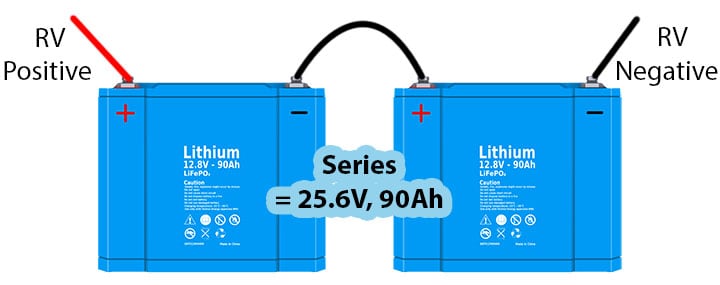
If you have multiple batteries connected by the positive and negative terminals, that is a series. Typically RV batteries are wired in a series if they are 6V deep cycle batteries because a series doubles the voltage to bring the battery bank to 12V. The Ah rating remains the same, however. To calculate your RV battery capacity, you simply look for the Ah reading on one of the batteries. 6V golf cart batteries typically come in pretty high capacities of over 200Ah. But, remember, if you stick to the 50% rule, only half of the Ah capacity is usable if you plan on maximizing battery life.
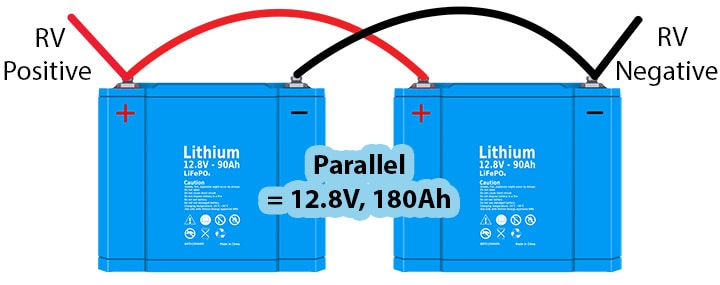
If you have two or more 12V batteries connected to your RVs system, they will be wired in a parallel setup. The positive terminals will be connected together, and so will the negative terminals. Wiring batteries in parallel increases the battery bank’s capacity while the voltage remains the same. If you have multiple batteries wired in parallel, they should always be the same voltage and Ah capacity, so multiply the Ah by the number of batteries wired in parallel, and that will give you your total Ah capacity. If they aren’t lithium batteries, remember that you can only use half the total capacity if you want to maximize battery life.
Monitoring Your Batteries While Boondocking
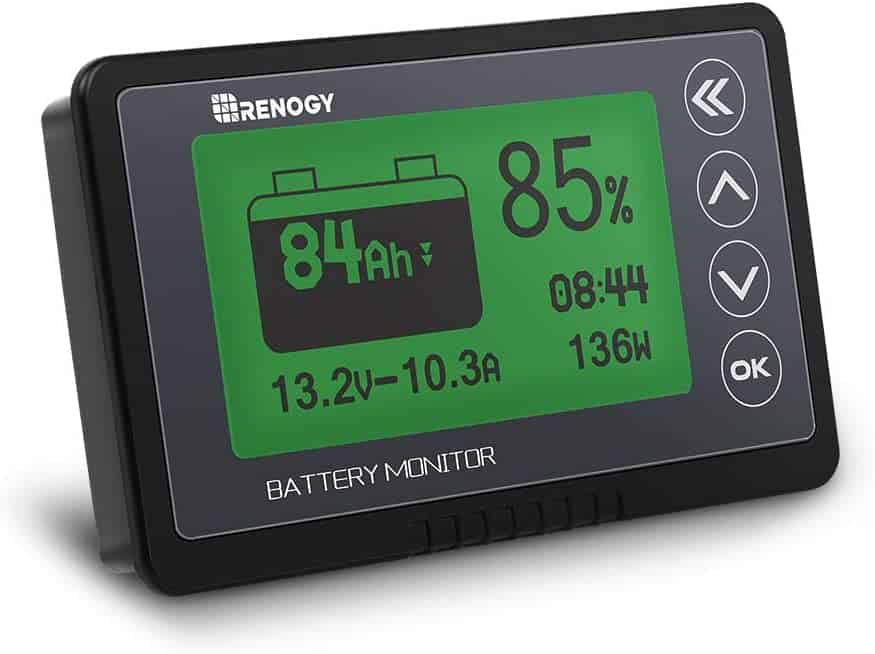
There are several ways to determine how much battery power your RV has left , but the easiest way by far is a battery monitor. A good battery monitor like the Renogy 500A Battery Monitor or the Victron Energy BMV-712 Smart Battery Monitor available on Amazon will tell you your battery’s state of charge, power draw, and how many amp-hours remain.
Finding Out How Long Your RV Battery Will Last
Now that you know where to look for and calculate your total battery capacity, you can start calculating how long your RV battery will last boondocking. You can use two main methods for this. The first requires you to do a little math and guesswork. The other requires much less math and a little more real-world experimentation. If your phone’s calculator is set to scientific mode and there’s a shortcut to it on the home screen, you may fall in love with all the mathematical guesswork of method one. If, however, the previous sentence triggered your fight or flight response or awoke long-forgotten childhood trauma, you can skip to method two.
Method 1: The Math
To calculate how many amp-hours you are using, you must first determine how many amps the devices you want to run draw. If you can pick up the device and look at it, you will most likely find the power consumption information on a sticker or stamped into the plastic casing of the appliance. Devices that run on 12 volts will typically list the number of amps they pull, which makes calculating easy. The formula looks like the following:
Calculating Amp-Hours
(Device Amp Draw) X (Hours You Intend To Run Device Per Day) = (Estimated Ah Used By Device Per Day)
Sometimes, a device’s power consumption will be listed in watts. To find the amps used by a 12V device from watts, you will need the following formula:
Watts / Volts = Amps (It may help to remember “West Virginia” W / V = A )
Recalling from middle school algebra, you may have already figured out that you can rearrange that equation to find out the wattage of a device if you know the amperage.
Watts = Volts X Amps
From Watts To Amps To Amp-Hours
Let’s take a 12V water pump that uses 50W of power when running, and determine how many amp-hours per day a boondocker might use.
50W / 12V = about 4 Amps
Daily Use Estimate: (5 min for dishes) + (10 min for showers) = 0.25 hours
4 Amps X 0.25 Hours = 1 Amp-Hour(s) per day
Calculating Amp-Hours For 120V AC Appliances
If you have an inverter , you can run some of your AC appliances from your batteries. An inverter does two main things.
- It converts the DC (direct current) from your batteries into AC (alternating current).
- An inverter also steps up the voltage from 12V to around 110V so that you can run your 110-120VAC appliances.
There are a couple of key things to remember when calculating amperage draws from AC devices through an inverter.
- If a 110-120V device’s sticker lists its amperage, that amp draw is for the voltage stated on the sticker. A 160W AC fan will draw around 1.4 amps at 120 volts (160W / 120V ≈ 1.4), but the same fan will draw closer to 13 amps from a 12V battery source depending on its state of charge (160W / 12.6V ≈ 12.7 amps).
- It costs energy in the form of heat for the inverter to work. In other words, you will get a power loss of up to 15% when using an inverter. You must add this power loss into your calculations.
Note: A full lead-acid battery will put out between 12.7 and 13 volts when full, and lithium batteries will read up to 14 volts.
Pulling together the above information gets you the formula for calculating a 12V amp draw through an inverter.
First, find the 12V amp draw using the wattage listed on the device sticker (160W in our example).
160W / 12.6V = 12.7A
Next account for the 15% energy loss of the inverter by dividing the amperage by 0.85.
12.7amps / 0.85 ≈ 15 amps total
Adding It All Up
To help you estimate, approximate amp draws for common 12V DC appliances are listed in Table 1 below. Now that you know how to find your total battery capacity in amp-hours and calculate amp-hours from your various appliances, you are ready to figure out how long your RV battery will last. All you have to do is add up all of the estimated amp-hours for each appliance you intend to run per day and divide your total battery capacity by the estimated daily Ah usage.
Say, for example, I estimated my daily amp-hour total was 40Ah, and my rig has a 200Ah battery bank.
Lead Acid Batteries
Keeping with the 50% rule mentioned above, I have 100 usable Ah when using lead-acid batteries.
(200Ah / 2) / 40Ah per day = 2.5 days until batteries are at 50% capacity.
If using lithium, you can use the entire Ah rating.
200Ah / 40Ah per day = 5 days on lithium
Table 1: Approximate 12V RV Appliance Amp Draws
Method 2: the real world test.
If you read method one and thought it seemed a bit involved, you’re not alone. Fortunately, there is another way to estimate how long your batteries will last boondocking. By testing it at a campground. The simple steps are as follows.
- Find out your total battery capacity.
- Head to an RV park or campground for a couple of days.
- After making sure your battery is full, keep your RV unplugged from the park’s power and pretend you are boondocking. Make sure to power devices and appliances as if you were actually boondocking.
- Keep an eye on your battery monitor periodically to ensure you don’t drain your batteries further than you should. After a full day and night, note how many Ah you have left according to your battery monitor.
- Simple subtraction will tell you how many Ah you used in a 24-hour period. You can then divide the total battery capacity in Ah by the Ah used in a day to find out how many days you would last on a single charge.
- Plug your rig into the RV park when done and recharge your batteries.
If you want a closer estimate, try doing the above test for multiple days and then calculating an average daily Ah usage.
Ways To Extend Your Boondocking Trip
If you’ve run the numbers and feel your battery capacity doesn’t buy you as much boondocking time as you’d like. The following video has some useful information on getting power and recharging your batteries off the grid to extend your boondocking time.
Do you have an awesome boondocking power-saving tip you’d like to share? Tell us about it in the comments.
Share this post:
Related posts:.

Why Voltage Isn’t a Reliable Indicator for Lithium Battery State of Charge

How to Find Boondocking Spots: 6 Quick Tips

High Altitude Haven: Mountain Boondocking Safety Essentials
About the author:.

Levi Henley, RV LIFE’s Content Manager and WordPress specialist, is renowned for his expertise in RVing and workamping, having lived on the road since 2015. He’s the author of the popular guide “Seasonal Workamping for a Living: How We Did It” , a testament to his deep knowledge in the RV community. For more insights into Levi’s nomadic lifestyle and expertise, visit Henley’s Happy Trails .
Levi Henley: Content Manager, Media Specialist at RV LIFE
Levi Henley stands at the forefront of RV-centric content, wearing multiple hats as a Content Manager and Media Specialist for the RV LIFE network. With his deep-rooted expertise in RVing, workamping, and the full-time nomadic lifestyle, Levi has been writing about and living the lifestyle since he hit the road in 2015 with his wife Natalie.
Their journey, punctuated by innovative approaches to nomadic income, has culminated in the guide, " Seasonal Workamping for a Living: How We Did It ," a testament to their hands-on experience and knowledge. This resource, available on Amazon and through their personal website, Henley's Happy Trails , offers invaluable insights into the mobile lifestyle. Levi's has written for RV industry media key organizations like Coach-Net, Escapees, and Workamper News.
Beyond his professional prowess, Levi is a man of diverse talents and interests. He's not only an actor and magician but also a certified scuba diving instructor. His adventures across the country in a 2011 Sunstar Itasca, accompanied by Natalie and their two feline companions and rambunctious dog, embody the spirit of exploration and lifelong learning.
12 thoughts on “How Long Will My RV Battery Last While Boondocking”
This type of battery is available as well. Some very useful properties. http://azimuthsolarproducts.com/product-category/batteries/sio2/
Those can definitely be useful. The SiO2 is sort of like a sub-type of glass-matt (AGM), but with a slightly different electrolyte, I believe. It has an excellent lifespan, can be discharged almost completely on a semi-regular basis, and does very well in cold temps. Some RVers have had great success with that type. I could be wrong due to the lack of non-marketing info about SiO2 batteries, but Lithium batteries have a longer life span and have a better voltage level drop curve as the battery drains. They may also be lighter. But if you will be RVing in very cold or excessively hot weather, SiO2 may be a better choice than lithium, depending on where you plan to store them. Thanks for bringing those to my attention, and thanks for reading.
If only 50% of a lead acid battery’s capacity is “usable”, what happened to the other 50%? Just what happens if I “cross the line” past 50%? Why would a manufacturer specify a given capacity if it’s not true? Isn’t there a cost tradeoff depending on how often and how deeply you discharge any kind of battery?
Thanks for the question. I’m right there with you on not liking this lead-acid battery factoid (I have deep-cycle lead-acid batteries in my rig).
Technically yes, a 100Ah battery will last for around 100Ah. So you can use the total capacity of your battery. Many RVers do routinely drain their batteries past 50%, and one would be hard-pressed to find an RVer who hasn’t run their house batteries dry on at least one occasion. Like anything that wears out, if you do it infrequently enough, you may not notice much difference. But, every battery expert agrees that doing so all the time will drastically shorten the battery’s lifespan. According to battery manufacturer, MkPowered , “If you are always recharging your battery in a complete cycle, you could expect to get just over 220 complete cycles when you drain the battery 80% each day, whereas you would get almost 750 complete cycles if you only discharge 50%.” That’s a significant decrease in life and an increase in money spent on new batteries.
In contrast according to https://battlebornbatteries.com/ , “Lithium-ion batteries are better able to sustain deep discharges than their lead-acid counterparts. For example, if you discharge your lead acid battery to 50% or so routinely, that battery will likely give you around 500-800 cycles before it needs to get replaced. By comparison, a lithium-ion battery discharged down to even 20% is said to deliver around 5000 cycles. The extended lifespan of the lithium-ion battery, then, is significant.”
So, you are absolutely correct. Frequent deep discharges will affect the life of any battery. However, the science shows it damages lead-acid batteries (especially flooded) far faster than lithium. So the official recommendation by battery manufacturers is to try not to drain LA below 50% for maximum lifespan. Therefore, while it’s perfectly possible to use the entire capacity all the time, in an effort to not give advice that could cause unneeded damage and shortened lifespans to other RVers’ equipment (batteries), and in order to convey information that most closely follows industry standards and manufacturer’s recommendations, it is recommended in the article to only discharge a lead-acid battery down to 50% charge before recharging it and to have enough battery capacity on board to make that possible when boondocking.
Thank you again for being a Camper Smarts reader. Travel safe, and happy trails.
Very good article, thanks for sharing this!!
Thank you for being a Camper Smarts reader.
Lithium batteries have some history of bad fires. Is there any data on rv fires? If I convert to lithiums from lead/acid do I have to change the inverter and/or converter?
Good questions. Q: Is there any data on rv fires and lithium batteries? A: I couldn’t find any specifically for RVs. However AutoinsuranceEZ.com used data collected from NTSB, BTS, and government recall data from Recalls.gov, and broke down incidents of car fires by vehicle and fuel type.
Hybrid vehicles: 3,474 fires per 100K sales Gas vehicles: 1,529 fires per 100K sales Electric vehicles: 25 fires per 100K sales
Electric vehicles have very large lithium battery banks and they catch fire less. Also, cell phone batteries experience thermal runaway are one type of lithium battery, the LiFePO4 chemistry in RV lithium batteries is considered very low risk.
Q: If I convert to lithiums from lead/acid do I have to change the inverter and/or converter?
It depends on your converter charger. Many modern converter chargers have a lithium setting. If you’re unsure, it’s best to refer to a manual or contact the manufacturer. If you plan on charging them with an alternator, depending on your setup, it may require a Battery Isolation Manager (BIM). Battery companies like https://battlebornbatteries.com/ can help with what components are needed for your setup.
If you plan on installing solar or increasing your battery bank/capacity considerably, lithium is the top choice. But if you are just looking for something to replace traditional flooded batteries, AGM or the newer version of sealed lead batteries (SiO2) may be the most plug-and-play choice.
Thanks For Reading, I hope that helps.
I question the value of the lithium battery for any but the hard core boondockers. My experience as a camper, auto Tech, and as a marine technician leads me to believe that the AGM battery is the best bang for the buck. It is not unusual to get 5-7-10 years from a battery. Depending on how often you trade your rig, one or two batteries can last for your ownership. Again, in my experience most battery failures are a result of overcharging in the off season. A fully charged battery will get through the winter with only a minor discharge as long as at least one cable. preferably the ground (-) cable is disconnected. At the marina where I worked standard practice is to disconnect the negative cables and leave the battery in the boat for the winter. Winter temperatures routinely well below 0 and many batteries are lasting 10 years or so.
I agree with you there. RVers who only boondock occasionally for one or two nights and spend the rest of their time plugged at an RV park. AGM would most likely be the cost-effective solution. For RVers who plan to go solar and go boondocking more regularly, though, Lithium is able to charge faster and discharge deeper along with other advantages (can be mounted inside the rig for larger banks) besides lifespan in those cases. But a good AGM that is taken care of would certainly work for a solar setup and a more frequent boondocking if lifespan and budget are the only determining factors.
Thanks for being a Camper Smarts reader. Safe travels.
Tanks for the info – The other side of the question “How long will my RV Batteries last while Boon Docking” is the “supply side” (consumption vs production). There are four conventional ways of charging the batteries for a boondocker. 1. RV Generator, 2. Vehicle Alternator 3. Solar Panels and 4. Wind Turbine. To achieve electrical energy independence, #’s 2 and 3 allow the RV boondocking time duration to be constrained by factors other than battery capacity.
RV fuel capacity, potable water availability, need for heating and cooling and propane capacity will limit the boondocking time duration before battery capacity will.
> every battery expert agrees that doing so all the time will > drastically shorten the battery’s lifespan.
But few correctly interpret the experts. One has to correctly quantify “lifespan”. For batteries, it’s not calendar life or number of cycles but the number of amp hours it has the potential to deliver. It would be accurate to say that a battery used more deeply and more often would “die” sooner, but that doesn’t mean it failed or was damaged. It was just used up more quickly. Greater discharge depth does result in fewer cycles (the “experts” agree) but there is also a greater energy delivery as well. You still get all the Ah you initially paid for, the only thing that changes is how quickly you used it. All batteries die no matter how lightly they’re used or if they’re even used at all, so “preserving” them through limited DOD only carries you so far.
Cycles are an indicator of battery wear but not of “life”. For each cycle there is a quantity of energy delivered corresponding to the depth of discharge, specifically in amp hours. It works out that over the entire range of depth of discharge the delivered amp hours is pretty constant. Meaning, whether you use 10% of your battery thousands of times or 90% of your battery hundreds of times, the net power delivery is roughly the same. If you cycle a battery too lightly you will never realize all it’s potential number of cycles – it will go dead for other reasons before you have enough chances to use it up. If you consistently run it dead you will ultimately kill it, and probably at an inopportune time. So the correct answer is to consider the application – Ah’s to deliver over what time – size the battery/bank to accommodate that plus some margin, and stop there. Buying too big a battery or underusing the one you have is false economy as you lose utility during use, and money in unused life when it ultimately needs to be replaced. The 50% rule has no practical place in RV house battery applications because the use profiles are so varied. There are reasons to use a given DOD from a charge management standpoint – to make sure you have enough power to run your stuff when you need it – but battery preservation is not a valid DOD strategy. Batteries fail for numerous reasons and DOD/cycles is low on that list. You would be hard pressed to actually wear a battery out in RV service before it dies of other causes. The “50% Rule” is often cited in RV circles but when you investigate the specifics of DOD, cycle and calendar life you find there are few if any RV scenarios where that arbitrary DOD point has any effect on service life at all.
Leave a Comment Cancel reply
Welcome please follow these guidelines:.
- Be kind and respectful.
- Keep comments relevant to the article.
- Avoid insults, threats, profanity, and offensive remarks.
- Refrain from discussing gun rights, politics, or religion.
- Do not post misleading information, personal details, or spam.
We may hide or remove comments at our discretion.
I have read and accepted the Comment Guidelines and Privacy Policy *
Follow Camper Smarts:
- Follow Us On Facebook
- Follow Us On Twitter
- Follow Our Pins

Do I Need a Battery for My Travel Trailer?
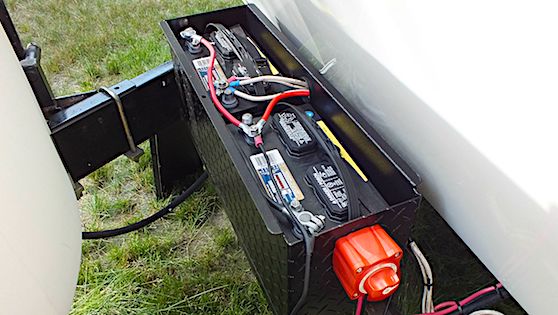
Sharing is caring!
Thanks for your support! If you make a purchase using our links in this article, we may make a commission. And, as an Amazon Associate, I earn from qualifying purchases. See the full disclosure here .
RV batteries are a fundamental feature of your travel trailer, yet they are the least recognized. In reality, the travel trailer battery is the backbone of just about every electrical component. But, people always seem to ask: Do I need a battery for my travel trailer?
While operating your trailer without this power source is possible, it is an unnecessary risk to take. Instead, learning about travel trailer batteries, how to use them, and which kind to get is the only way to encourage their lifetime and efficiency.
Do I Need a Travel Trailer Battery?
In most cases, yes, you do need a travel trailer battery or battery bank. While it is possible to use your trailer without batteries, you won’t get the most out of it with no power.
Almost every travel trailer sold nowadays come with batteries pre-installed. If you have an older model with dead batteries or no batteries altogether, you should consider getting some.
Why Do I Need a Travel Trailer Battery?
There are various reasons you should use an RV battery in your travel trailer.
First, batteries give power to the system that allows your tail lights, brake lights, marker lights, electric wheel brakes, and dash accessories to function. These features must be operating correctly to pull your trailer legally.
Moreover, most if not all, of your electrical appliances and lighting run on 12-volt DC power and the batteries provide this power. The 120-volt alternating current (AC) power, or shore power, charges the 12-volt DC house battery system. The 120-volt AC power converts into 12-volt DC power, which provides energy components, such as the fridge, furnace, lights, and water pump.
Even those who park their trailer at a campsite need a battery to convert the current. It will also keep your systems functioning correctly if the shore power fails due to an outage.
Without a battery, your detectors for propane leaks, carbon monoxide, and fires will not operate, potentially leaving you and your family in a life-threatening situation. Additionally, you will not be able to use any 12-volt lighting, meaning you will need to rely solely on flashlights. Therefore, having a battery in your travel trailer will keep you safe and out of the dark.
Battery power will charge your 12-volt propane appliances since the last thing you want is for your refrigerator full of fresh groceries to go to waste. Luckily, with this source of power, you will be able to continue running your pre-cooled unit, and, in turn, save your food.
What Kind of Battery Do I Need for My Travel Trailer?
Although batteries may look similar, they are very different. Taking the time to choose the best battery for your camper will pay off in the long run.
Travel trailers only run on deep-cycle batteries. Boats, materials handling equipment, golf carts, and other larger units also rely on this RV house battery, as it is dependable and efficient.
These lead-acid batteries provide continuous power over more extended periods making them more reliable than others. Most versions run dependably until 80% discharged; however, discharge should never exceed 45% to promote battery life.
Travel Trailer Battery Types
There are two main types of batteries for RVs and travel trailers: lead-acid and lithium.
Lead-acid travel trailer batteries have long been the most common, but they’re quickly being replaced by lithium and we’ll talk about why in a second.
Lead-acid deep cycle batteries come in two different varieties – flooded and sealed. Each has unique features but are comparable for their increased recharge frequency and longer lifespan.
Conventional flooded electrolyte batteries are cheaper yet require more maintenance. With this system, users must monitor the water levels and fill them as needed. Flooded batteries also corrode faster and only handle a discharge of 50%, meaning they need to be cleaned and charged more often.
Flooded batteries are the cheapest, but they also provide the lowest performance, require maintenance, and do not last as long.
Sealed batteries, on the other hand, are divided into two subcategories. Both are pricier than flooded but require less maintenance and last longer.
AGM Travel Trailer Batteries
Absorbed glass mat (AGM) batteries accommodate users, as they do not need regular care. They also charge up to five times quicker than flooded, can handle a discharge up to 80%, and will easily withstand the cold temperatures of winter. Users should be aware that these batteries are highly susceptible to overcharging, resulting in irreparable damage.
Gel Travel Trailer Batteries
Gel batteries are also sealed and do not need as much care. They are great for extreme temperatures and handle excess vibration. Note that these batteries are not for inexperienced RVers due to their slow charging rate and high risk of damage.
Lithium Travel Trailer Batteries
Lithium batteries for RVs and travel trailers cost the most up-front, but they last much longer, have a longer warranty, and are substantially more efficient.
Lithium ion batteries are also smaller and weigh less than lead acid battery types.
With proper care, lithium batteries have a lifespan of 10+ years.
And compared to lead acid batteries which can only be discharged 50%, you can discharge lithium batteries all the way without worry of damaging the battery.
What Size Battery Do I Need for My Travel Trailer?
Battery size for your travel trailer is vastly dependent upon your needs as a camper. Choosing two 6-volt batteries versus a 12-volt battery makes all the difference when it comes to cost and longevity.
Although 6-volt batteries may seem small, they have a lot more spunk than you might think. Also called a “golf cart” battery, 6-volts are the only real deep cycle battery. They have more space between each of its 2.1-volt cells, which means their thicker plates will increase its life. Due to their deeper discharge and higher amperage output, they work best for those who boondock or live off-grid.
Conversely, a 12-volt battery is a deep cycle and starting battery hybrid . When in parallel, it will only charge to the weakest cell’s level, making it less desirable than the 6-volt counterpart. Aside from this disadvantage, these batteries are perfect for those who travel from campground to campground.
Keep in mind that you will need to purchase either four to six 6-volt batteries or two 12-volt batteries to accommodate your trailer. Wire the 6-volts in a series and the 12-volts in a parallel configuration to obtain the most amperage.
How to Charge RV Batteries
Learning how to charge RV batteries for your travel trailer properly takes time and practice. Knowing how the system works makes the experience much more pleasant, as well.
While a converter is technically a charger, it does not do the best job. This device transforms 120V AC to 13.2V DC, which powers the 12V DC systems. Although the converter gives out over 40 amps, it charges batteries between three and five amps. Unfortunately, fully charging batteries at this amperage takes a considerable amount of time.
Purchasing high-quality chargers, on the other hand, will effectively juice up your batteries at a faster rate. They will also help you decide when and how long to charge the batteries. Today, there are various chargers on the market that are guaranteed to fit your needs.
Microprocessor-controlled chargers, or “smart chargers,” use algorithms to adjust for the needs of the battery. This method is the most precise and trustworthy for charging, as it changes the voltage and current as needed. Using a smart charger also eliminates worry about overcharging or damaging your battery. I like the Schumaker Fully Automatic Battery Charger and Engine Starter . My Battery charger is over 10 years old and still works great.
If you are looking to charge your RV batteries with solar panels, be sure to use maximum power point tracking (MPPT). Like the smart charger, the MPPT also uses algorithms to measure voltage and alter the current. Unique to this device, however, is the way it regulates power depending upon light conditions. As with any solar-powered device, charge your batteries during the day to utilize the sun’s energy.
For those who dry camp, or boondock, generator power is the best way to charge your batteries. On its own, this method does not work well, as its 8-amp maximum does not supply enough energy. Instead, plug your smart charger into the generator’s 120V AC outlet to increase the charging speed.
How to Make Your RV Battery Last
RV batteries are not cheap, so make the most of your money by following these suggestions to promote its lifespan. Also, consider purchasing a battery monitor to track the amount of charge, voltage, usage, and time left to charge. This feature will alleviate any confusion and keep you informed about the status of your battery.
Perform routine maintenance and immediately recharge discharged batteries to make your batteries last longer. Furthermore, purchasing a digital voltmeter is highly recommended to monitor the status of your batteries.
Note that a 12-volt battery is 12.7-volts, meaning you should never allow discharge to dip below 50% or 12 volts. Realistically, you should not let it drop under 80%, or 12.4 volts to avoid sulfation, or the formation of small, lethal crystals. Hot temperatures and overcharging will also destroy your battery. Try to keep the system from getting too hot and avoid charging too long. Frequently check your water levels and replace electrolyte levels whenever necessary. Only use distilled water, as regular water causes calcium sulfation.
Always charge your battery in stages. During the first phase called bulk charging, boost it up to 90%. Next, switch to absorption charging for the remaining 10% to prevent gas buildup and water loss. The last step is called the float stage and works to maintain a full charge. As a reminder, prevent water loss by leaving vent caps on while charging and water only after powering is complete.
Travel Trailer Battery Replacement Tips
Deep cycle batteries for RVs are not like starter batteries, as you cannot jumpstart them. If your battery no longer maintains a charge, each requires a replacement. For example, if you have two batteries in parallel or six in a series, change them all to avoid ruining the others. Fortunately, swapping them out is rather straightforward once you get the hang of it.
First, remember to put on goggles and rubber gloves to protect yourself from sulfuric acid. In preparation, make sure the main disconnect switch is turned off. Power down individual breakers and switches instead if your travel trailer does not have this switch.
Next, open the battery hatch and check if your battery has spilled at all before handling. If there is any damage or corrosion, seek professional help to fix the issue.
Now, you’re ready to take out the old battery. Remove the negative cable (black) first to prevent any shortages or blown fuses. To loosen the wing nut, use a socket wrench or pliers. Then, disconnect the positive cable (red), but do not let it touch the negative cable. Furthermore, do NOT touch the black and red terminals with your hands, as this can cause a lethal electric shock.
With the terminals detached, carefully remove the house battery. If it is dead, properly dispose of it by visiting your locally approved recycling facility. Otherwise, move it into a secure storage area for next season.
Before installing the new unit, clean the connections and holding area. After completion of this step, place the batteries in their compartment. First, attach the positive cable (red), then connect the negative cable (black). Secure the area, check the voltage, and turn on the main breaker switch or individual breakers to confirm the success of the installation.
Should I Disconnect the RV Battery When in Storage?
Properly winterizing your trailer before storing makes all the difference come spring. It is during this time that you should also be thinking about your RV battery.
Freezing temperatures will kill flooded cell batteries; therefore, you should never leave them in your trailer during storage. Alternately, take them home with you and tend to them over the winter months. Even when batteries are disconnected, they will eventually discharge over time. To prevent sulfation, check them every month and perform an overnight charge if they fall below 80%.
Removing your batteries is also important to avoid excess drainage. For example, utilities that run on standby power, such as your LP gas leak detectors, clocks, appliance circuit boards, stereos, and tv antenna power boosters, decrease the life of your battery. As a preventative, turn off these appliances when they are not in use or while the trailer is in storage.
If you choose to leave in your batteries, you will likely purchase a new one the following season. For those who must leave their batteries in storage, check on your trailer frequently. Taking these simple precautionary measures saves you in the long run, as your battery is the most valuable feature of your travel trailer.
What is the Best Travel Trailer Battery?
Today, many brands offer lower cost, efficient batteries. How long they last, however, varies depending on your maintenance and care routine. Regardless, choosing a high-quality battery gives you a head start and leads you in the right direction.
As previously mentioned, AGM batteries are perfect for campers who enjoy low-maintenance, easy-to-use systems. They are pricier than flooded batteries, yet their benefits outweigh the cost.
The Universal Power Group 12V 100Ah is one of the newest and highest-ranking batteries on the market. It holds a charge well during both storage and usage time and lasts much longer than competing brands. For example, during a month of storage, it only discharges 3%!
AGM batteries are known for their fantastic storage ability and resistance to corrosion, sulfation, and hydrogen gas explosions. For these reasons, they are currently the safest lead-acid batteries to date.
Although the Universal Power Group 12V is a tad heavier than others and a bit more expensive, its safety features and maintenance-free needs make up for its shortcomings.
What is the Best RV Battery for Dry Camping?
Dry camping, or boondocking, requires more thought than campground stays. Without an electric hookup, RVers must be mindful of their energy output.
Some batteries are much better than others for boondocking. Mainly, you want to find one that increases your amperage while maintaining lifespan.
The top-rated VMAXTANKS 6 Volt 225Ah AGM battery does just that, as it is ideal for dry campers looking to get the most bang for their buck. Combining up to six in a series will allow you to power your entire RV longer with no issues. It can also be used to accumulate solar and wind energy and works well as a backup power source.
This battery is leak-free and spill-proof due to its sealed design, and with the appropriate care, it will last you longer than most. The price is well worth the quality, as it is both reliable and convenient.
How Can I Protect My Travel Trailer Batteries From Theft?
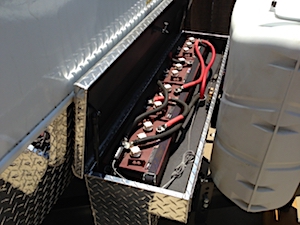
Every year someone’s batteries are stolen from their travel trailer. It’s a shame but batteries are valuable because they are expensive and they are easy to get to especially if they are mounted outside of your camper trailer. So, the battery box was invented to protect your batteries from theft. A battery box mounts on the tongue of your travel trailer and keeps your batteries secure under lock and key.
RELATED READING: Check out our article 10 Most Googled Travel Trailer Camping Questions for even more popular questions about Travel Trailer camping.
Be sure to give your battery the love and care it deserves, as it works hard to keep your trailer powered and functioning. Contrary to belief, you do not need to replace your battery every year if you follow the proper guidelines. By choosing high-quality batteries and performing routine maintenance, your battery will last you much longer.
Do you have any advice about how to maintain your batteries? Please share your comments below!
For more helpful articles about travel trailers please check out our articles below:
- 20 Amazing Decorating Ideas for Your Travel Trailer or RV
- The Best SUV for a Towable Travel Trailer
- 250+ Perfect Names for Your RV or Travel Trailer
- RV Weight Explained – Travel Trailers, Motorhomes, and 5th Wheels
- Travel Trailer Depreciation: What’s My Travel Trailer Worth?
- Travel Trailer Turning Radius Tips
- Can I Legally Ride In A Travel Trailer?
- 8 Best Small Camping Trailers with Bathrooms
- 25 Beginner Tips for Travel Trailer Camping
- What Size Generator Do I Need For a Travel Trailer?
- How To Level a Travel Trailer on a Slope

1 thought on “Do I Need a Battery for My Travel Trailer?”
You missed the obvious reason to have a battery in your travel trailer: it’s the law! Most jurisdictions require a battery to provide power to the electric braking system in the event of a separation from the tow vehicle,
Leave a Comment Cancel reply
Save my name, email, and website in this browser for the next time I comment.

Travel Trailer Batteries – All You Need for an Epic Road Trip
Best travel trailer batteries.
Are you planning an epic road trip and need the best travel trailer battery? If you don't have a good quality battery, or if you haven't replaced your old one for a long time, you're risking it.
Imagine getting ready to embark on your next road trip, only to find that you've run out of power. It happens, and it's very inconvenient to say the least.
You can prevent these problems with the aid of a travel trailer battery that can supply constant power to your RV electronics without any worry. There are many different types of batteries on the market, so it can be difficult to decide which one is right for you.
So, if you're look for a battery for your trailer, we've reviewed some of the best on the market, including the different types and different price entries, too.

- Offers quick charging
- Requires the least maintenance
- Ideal for off-grid applications
- Resistant to shock and vibrations
- Safe for all types of terrain
- Full seal guarantees that it will not spill or leak
- Suitable for recreational vehicles and solar charging
- Features heavy-duty plates to provide work without any interruption
- Features short hub terminals
- Not completely corrosion-proof
- Some risk of ABS plastic breakage in time
If you're looking for a deep cycle battery with superior performance and renowned for its durability, the WindyNation deep cycle battery should be high on your list. What we love most about this travel trailer battery is that it’s fully sealed and perfect for many applications including marine, airports, healthcare facilities, and many more. This battery provides 100 amp hours at a rate of 10 hours and is perfectly suited for all off-grid power supplies in case of emergency or extended use. The durability is guaranteed by ABS plastic material of high-quality, which ensures that the battery performs under the toughest conditions. What's more, the voltage for charging is about 12 volts and operates at temperatures between roughly 25 degrees Celsius and 50 degrees Celsius. Additionally, this battery features heavy-duty plates to make it suitable for longer run times, these plates can be easily discharged. The lead used to lower the discharge rate is pure virgin lead, thus guaranteeing durability and efficiency. Bottom Line Competitively priced, this WindyNation battery is specifically designed to offer excellent deep-cycle performance. This versatile and ideal travel trailer battery ensures the most value of your investment.
Runner-up: Mighty Max 12V 100AH for Solar Wind Deep Cycle

- Requires very little maintenance
- Holds high battery reserve capacity
- Available at a reasonable price
- Being completely sealed, it is spill-free and leak-free
- Many applications on water, land, and sea
- Able to withstand tough outdoor conditions and changing temperatures
- Offers a short warranty of one year
- Does not come with mounting wire and harness accessories
One of the best 12-volt deep cycle batteries, the Mighty Max battery is well-known for its versatility and top-notch performance. Apart from its applications in electric vehicles, golf carts, and medical mobility, it's ideal for access control devices, emergency lighting, and portable tools. And we like that it can be used as storage for solar or wind energy. This battery has a sealed design that makes it spill-proof and leak-proof regardless of its mounting position. There's no worry of adding water or checking of an electrolyte by virtue of AGM technology. It can be operated at all temperatures, which is something you should definitely be looking for. It can perform well, no matter the conditions, and is certified safe for use in many types of terrain, including water, land, and sea. This travel trailer battery is a better choice than a flooded wet cell battery that needs time to time fluid addition. Bottom Line This heavy-duty battery can be used anywhere you need 12V power. Whether it’s for travel trailers or boats, you can totally depend on its sealed design, solid performance, and long lifespan.
Best travel trailer battery for the money: interstate batteries deep cycle battery.

- There is no risk of leak and spill
- Able to withstand extreme conditions
- The sealed design guarantees reliability and durability
- Offers versatility in operations and has many applications
- Not suitable to use in a golf cart
This Interstate travel trailer battery is a dependable source capable of working for a long time without relinquishing itself. It offers reliable power needed for lighting , agriculture, and medical mobility. This sealed battery is easy to install without any worry of a specific position. The sealed covering will save the risk of spill and any leak. Even under tough conditions, it will keep working as intended. As mentioned above, this deep cycle battery can deal with extreme temperature and all types of weather and will keep its top performance. There's no need for adding water to check for specific gravity during its float life. All in all, this battery is versatile and acts as power storage that provides constant power to your electronics and appliances onboard. Bottom Line With this Interstate battery, you don’t have to worry about its performance even in snow. It's impressive for its versatility and is ideal for all types of transport, including on water, air, or ground. And it's at a good price entry, too!
Vmaxtanks vmax 12 volt battery.

- Able to resist shock and vibrations
- Boasts of its maintenance-free operation
- Top-quality grids enhance its performance
- Tank is impressively tough to protect the plates
- Recovers quickly even after repeated deep discharges
- Battery is non-hazardous and non-spilling, thanks to AGM technology
- Does not work for chargers other than VMAX chargers
- Unable to hold the charge longer than other deep cycle batteries
- Comes with a heavy weight that makes it hard to carry around
The small and standard size makes VMAXTANKS VMAX batteries a great choice for recreational vehicles. One of the stand out points with this battery is the chemical and physical structure of its plates, which are more reliable and higher in quality than others. What we like most about this is the absorbed glass matt or AGM between the plates. This design maximizes its ability to resist any vibration or shock. The sealed tank is tightly packed with the inner plates, reducing the chances of spilling. This battery is specifically designed for cyclic applications which make it capable of recovering fast even after doing repeated deep discharges. Another feature to highlight is the heavy-duty grids that offer improved performance and better service life, whether you use it for cyclic or float applications. Bottom Line This small-sized battery works with heavy-duty purposes and allows users to enjoy uninterrupted power supply. Safe from the hassles of maintenance, this is an excellent choice to provide the promised output.
Best travel trailer deep cycle batteries: universal power group 12v.

- No risk of any spill or leakage
- Sturdy plastic body ensures durability
- Sealed and requires no regular maintenance
- Offers a multi-purpose power source
- Comes with a valve to regulate the performance
- AGM technology makes it resistant to shock and vibration
- Battery is quite heavy
- Holds short stainless steel hardware
- Usually takes a long time to recharge
One of the top-rated batteries fro travel trailers in stores, the Universal Power Battery is well-known for its solid performance and heavy-duty build. Its flexibility gives you the opportunity of mounting it in various positions, and also gives you a multi-purpose source of power that can be used in RVs, boats, golf carts, scooters, and other gadgets that need such a battery. With a simple design, this battery uses 12 volts to charge and gives output of rates up to 100 AH hours. Additionally, it is specifically manufactured to recharge and discharge without compromising the durability of the plates. Based on AGM technology, this battery is resistant to shock and vibration, no matter the position. Plus, you have the opportunity to control and regulate the performance by virtue of a valve. And if that's not enough, it can store energy as well as any other on the market. Bottom Line If you are looking for a versatile and flexible battery for a multitude of vehicles, you shouldn't miss this Universal Power battery. You can have peace of mind throughout its lifespan, as the rugged design and strong exterior makes it more durable.
Renogy lithium-iron phosphate 12 volt battery.

- Charges really fast
- Robust build makes it highly durable
- Features reduced weight compared to other models
- Does not require much maintenance
- Ideal for use as backup power or for daily use
- Sturdy exterior makes it spill-proof and leak-proof
- Compatible with plenty of charge controllers and smart chargers
- Bulky to carry around
This Renogy travel trailer battery is our top choice for a Lithium-ion model. Available at a premium price, this battery lasts 10X longer than a regular wet lead-acid deep cycle model. Its low weight and compact design make it a great option to build a power back with several batteries in parallel. This deep cycle battery features a built-in battery protection system, ensuring that it runs at peak performance. Additionally, the short circuit protection and an internal cell fuse make this model truly plug-and-play.
The sturdy exterior embodies fire retardant additives and an explosion-proof stainless steel case, and the battery won’t falter even with repeated 100% depth of discharge. bottom line it's expensive, but you won't regret investing in this unit as it's more lightweight than other models, robust, and incredibly durable. plus, it charges really fast , so you’ll have no major issues with it., optima deep cycle travel trailer battery.

- Quick recharge time
- Comes with a lightweight and unique design
- Made waterproof to guarantee durability
- Strength of the battery is resistant to shock and vibration
- 120 minutes of constant power supply makes it highly efficient
- Boasts high reserve capacity of up to 120 minutes for constant performance
- Housing is prone to damage when hit
- Does not have an efficient output system
If you are looking for solid performance and a true deep cycle battery, then look at this Optima deep cycle battery. What is really impressive about this is its dual service. Besides functioning as a deep cycle unit, it also operates as a starting battery. The 12-volt charging capacity makes it safe and suitable for daily use. It can be used to start an engine, plus it acts as a great power supplier for uninterrupted supply. The design of this model allows for operation in all positions without worrying about the strength of the job needing to be done. It provides optimum performance, thanks to a distinctive Spiral-Cell design together with continuous lead plates. This battery is 15 times more resistant to various forms of vibration compared to other marine batteries. It's also versatile enough for applications such as dry camping, boondocking, and other outdoor adventures. Bottom Line Ideal for RV, boats, and motorhomes, this battery is a fantastic source of power even in harsh conditions. With durable and solid features, you can rely on this battery to maximize your investment.
Odyssey pc925 travel trailer battery.

- Boasts considerable power
- Quick recharge efficiency
- 70% longer lifespan compared to other deep cycle models
- Ideal for many applications, including RVs and travel trailers
- Features more plate surface area to ensure more power
- Offers resistance to shock and vibration, thanks to its non-spilling design
- Heavy to carry around
- Slightly expensive for those on a tight budget
To get the most value for your purchase, this Odyssey PC925 travel trailer battery is strongly recommended for its superb performance and superior functions. With this battery, you get 15% more when it comes to the plate surface area, which ensures more power storage. This will give you peace of mind that you can rely on a steady power supply for your appliances.
The huge starting power of this battery cannot be compared with other traditional batteries available on the market. designed in a sturdy manner, it can withstand any shock and vibration. the battery is highly powerful and comes with a longer lifespan, which is 70 percent longer than other models. plus, you can mount it in any position thanks to its ability to tolerate even the most extreme conditions . the most striking feature of this battery, however, is that it can supply 330 cold cranking amps, giving you great ease in starting your vehicle or appliances. it is an efficient option to offer up to 400 cycles and at an 80% discharge depth. and if all the above isn't enough, it boasts quick charging and a warranty of 4 years. bottom line built with a sturdy design, this odyssey battery is ideal for daily or emergency use, as it can withstand even the harshest weather conditions. you should not miss this travel trailer battery for its ultimate versatility, durability and overall performance., best 12 volt trailer battery: renogy deep cycle agm battery 12 volt.

- Battery serves multiple purposes
- Guaranteed to be maintenance-free
- Requires only 14.4 to 14.5 volts to be charged
- Highly efficient when handling solar energy storage applications
- Can connect to another deep cycle battery through a simple wire
- Quite heavy and bulky
- Does not have an overcharging safety lock
Whether you're looking for a battery specifically designed to offer backup power or daily use, this Renogy battery serves its purpose well. It's suggested to potential users, and it is highly favorable to work as a general-purpose deep cycle battery, meaning it can serve many functions. The most impressive thing about this battery, however, is that it works well when it comes to dealing with solar energy storage applications. And the sturdy design makes it maintenance-free, spill-proof, and leak-proof.
It's also highly suited for a steady temperature of 25 degrees celsius. another advantage of this battery is that it can prevent the risk of over-discharging batteries. and, you can interconnect this battery to another deep cycle battery by employing interlinking cables. it is, therefore, an ideal option for off-grid applications and recreational vehicles. bottom line with a robust design, this renogy travel trailer battery guarantees full and safe recharge. it's a suitable option for a flexible battery for the recreational vehicle. you can totally rely on it for many applications, ensuring more value and versatility of your investment., best trailer breakaway battery: mighty max battery ml5-12 - 12v.

- Can be easily mounted in all positions
- Backed by a 1-year warranty and 30-day refund policy
- AGM/SLA spill-proof design that resists vibration and shock
- Ensures exceptional performance in both low and high temperatures
- Wide operating temperatures, deep discharge recover, and high discharge rate
- Does not come with a wire harness or any mounting accessories
What Recent Buyers Report
Most buyers stated that this travel trailer battery offers the great value of money and perfectly matched the connections and size of the factory battery. Users appreciate the fact that it comes fully charged and that it holds a charge for a long time.
Why it Stands Out to Us
Providing power whenever you need it, this battery boasts a calcium-alloy, heavy-duty grid that offers outstanding service life and performance in both cyclic and float applications. The model further features a valve regulated design and AGM technology, enabling use in indoor environments without having users worry about maintenance or leakage.
Bottom Line
This Mighty Max unit is, undoubtedly, one of the best travel trailer batteries because of its top performance and versatility. With its long lifespan and sealed design, the ML5-12 is perfect for people looking for a high-quality and heavy-duty RV battery.
Buyer's Guide
Now for more general information on travel trailer batteries. Here you'll learn what features to look for in a good quality device and exactly which size battery you'll need for your set up. We also look at the tell tale signs of when it's likely time to replace your old battery.
We also look at the different types of batteries available for RVs, and offer a step-by-step guide on how to install one. There's an FAQ section to wrap things up so you should know all there is to know about RV batteries by the end of the article.
What Size Battery Does My Travel Trailer Need?
The size of your travel trailer battery is crucial, but there's no specific answer to this question. It all depends on the power requirements in your rig, plus the hours you're running each appliance or electronic on board. A larger battery will store and provide more power, and always consider the space and weight carrying capacity you have available.
The amp hour rating of most batteries helps a user estimate the amount of power a battery contains. So, you should first determine the power needed and compare the different options available before making a purchase.
When Is It Time to Replace My Travel Trailer Battery?
If a deep-cycle battery is properly maintained, then it can last for more than six years. However, some RVers replace their RV’s batteries every one or two years. You’ll need to replace your battery if it reads 0 volts, as it can be a sign of a short circuit. If your battery is unable to reach higher than 10.5V when it’s being charged, then it has a dead cell and needs to be replaced.
Lastly, if you have a fully charged RV battery, but have a voltage of 12.5 or less, then it's sulfated , and it’s better to install a new one.

People Also Ask - Travel Trailer Battery FAQs
How long should a battery stay charged in a travel trailer.
The answer to this question depends on how long you’re going to power the appliances, lights, and other electrical devices in the RV. Typically, the battery should last two to three days while dry camping. However, this time can be extended if you’re not going to use any lighting or heat.
How Much Do Batteries For a Travel Trailer Cost?
With such a wide range of batteries available, the price range is just as wide. Low-quality batteries can cost around $50, while higher quality ones can cost as much as $700.
Do I Need a Battery For My Travel Trailer?
Yes, you must have a battery for your travel trailer as it powers the system that allows the brake lights, electric wheel brakes, dash accessories, tail lights, and marker lights function. If these features are not operating correctly, then you can't legally pull your trailer.
Adding a Second Battery to a Travel Trailer, How Do I Do it?
When installing a second battery, it’s advisable to choose a model that’s identical to the first one. Make sure the bridge cables are of the same length and are routed through the same path. Link the batteries to each other and make sure you only have one connection to the chassis.


Hello, fellow wanderers! I’m Alyssia. Since 2008, my husband and I have called an RV our home, journeying through life one mile at a time. Our nomadic lifestyle has led us to over 70 countries, each with their unique tales that have shaped our own.
I share our stories and insights right here, hoping to inspire and guide you in your own adventures. Expect tips on RV living, our favorite camping spots, breathtaking hiking trails, and the joys and challenges of an ever-changing view from our window. Alongside, you’ll also find practical advice on outdoorsy stuff, designed to equip you for any journey. Join us as we continue to explore the vast, beautiful world on wheels!

Home » Guides » What Size Battery Do I Need For My Travel Trailer
What Size Battery Do I Need For My Travel Trailer

- Last Updated: Aug 3, 2024
When you’re choosing a battery for your travel trailer, it’s important to select the right size. A battery that is too small will not be able to provide enough power, while a battery that is too large will take up unnecessary space and add extra weight.
In this blog post, we’ll discuss the different factors you need to consider when choosing a battery for your travel trailer. We’ll also provide some advice on how to choose the right size battery for your needs. So, if you’re looking for a new battery for your travel trailer, read on!
Battery Size
When choosing a travel trailer, one of the things you’ll need to consider is the size of the battery you’ll need. The three most common battery sizes for travel trailers are group 24, group 27, and group 31. Here’s a quick guide to help you choose the right size battery for your travel trailer:
- Group 24 batteries are the most popular choice for travel trailers. They’re small and lightweight, making them easy to maneuver and store.
- Group 27 batteries are slightly larger and heavier than group 24 batteries, but they offer more power and capacity. They’re a good choice for larger travel trailers that require more power.
- Group 31 batteries are the largest size battery available for travel trailers. They offer the most power and capacity, but they’re also the heaviest and most difficult to maneuver. If you have a large travel trailer that requires a lot of power, a group 31 battery is probably your best option.
The first step is to determine the size of your travel trailer’s battery compartment. This will give you a good idea of the physical size of the battery you need. Next, you’ll want to consider what type of electrical devices you’ll be using while camping. If you plan on using electricity for cooking or running air conditioners, then you’ll need a larger battery that can handle those loads.
Think about how often you’ll be using your RV and how long you’ll need the battery to last. If you only camp for short weekends, then a smaller battery may suffice. However, if you plan on extended camping trips or live in your RV full-time, then a larger battery will be necessary to keep everything running smoothly. Choosing the right size battery for your travel trailer is an important decision that will help make your RVing experience more enjoyable.
With a little research, you can find the perfect battery to keep your travels on track.
Types Of Travel Trailer Batteries
Travel trailers are a great way to explore the outdoors without giving up all the comforts of home. However, they can be difficult to maintain, and one of the most important components is the battery.
There are three main types of batteries used in travel trailers: lead acid, gel cell, and AGM.
- Lead acid batteries are the most common type used in RV systems. They are reliable and reasonably priced but require frequent maintenance and replacement.
- Gel cell batteries are more expensive than lead acid, but they provide a longer lifespan and require less maintenance.
- AGM batteries are the most expensive option, but they offer the longest lifespan and require little to no maintenance.
When choosing a battery for your travel trailer, it is important to consider your budget and your needs. Lead acid batteries may be the most affordable option, but if you don’t want to deal with constant maintenance, gel cell or AGM batteries may be a better choice.
How Many Batteries & What Voltage?
Batteries are essential for any travel trailer. They provide power for lights, appliances, and other electronics. Without batteries, it would be difficult to enjoy a camping trip. But how many batteries do you need for a travel trailer? And what voltage should they be?
The number of batteries you need will depend on the size of your travel trailer and the number of devices you plan to use. A small travel trailer might only require one or two batteries, while a larger one could need four or more. As for voltage, most travel trailers use 12-volt batteries . However, some RVs have 24-volt systems, so you’ll need to check your specific vehicle to see what voltage it uses.
No matter how many batteries you need or what voltage they are, make sure to keep them charged up. A dead battery can ruin a camping trip, so it’s always best to err on the side of caution and bring along extra batteries just in case. With a few fully charged batteries in tow, you’ll be able to enjoy your travels without worry.
With a little bit of research, you can ensure that your travel trailer has the right battery bank to keep everything running smoothly.
How To Charge RV Batteries
There are a few things to take into consideration when charging RV batteries. The first is the type of battery you have. There are lead-acid, lithium-ion, and nickel-based batteries. Each type requires a different charging method, so it’s important to know which kind you have. Once you’ve identified the battery type, you’ll need to determine the right voltage and amperage for the charger.
This information can be found in the owner’s manual or on the battery itself. Once you’ve selected a charger, you’ll need to connect it to the RV’s battery terminal. It’s important to make sure that the polarity is correct; otherwise, you could damage the battery. Finally, turn on the charger and monitor the progress until the battery is fully charged. Properly charging an RV battery is essential for ensuring that your RV is ready for your next adventure.
Final Thoughts
So, what size battery do you need for your travel trailer? The answer may surprise you. You don’t need a huge battery to power your RV; in fact, a smaller one will do the trick just fine. We hope this article has helped clear up some of the confusion around batteries and given you the information you need to choose the right one for your needs. Thanks for reading!
You May Be Interested In
7 Best Travel Trailer Leveling Blocks (2022 Review)
3 Best Electric Heaters For Your Travel Trailer (2022 Review)
5 Best Wheel Chocks For Travel Trailers (2022 Review

Leave a Comment Cancel reply
Recently published guides.
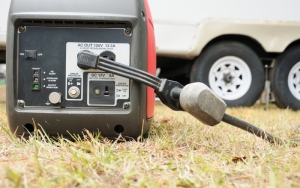
Buying a Generator for RV Life

RV Refrigerators: How Do They Work?

How to Repair Norcold Fridge Flap
- United States - English
- United Kingdom - English
- Canada - English
- Australia - English
- Other Europe - English
- Germany - Deutsch

- Buyer's Guide
- General Solar
- Off-Grid Power
- Home Backup
- What’s the Difference Between N-Type and P-Type Solar Panels?
- What is TOPCon Technology?
- What Factors Should You Consider When Selecting Solar Panels for Increased Power Output?
- Why Choose Renogy N-Type TOPCon Solar Panel?
- Closing Thoughts

RV Battery Size Chart | Renogy Battery Buying Guide
- The 2-in-1 12V 200Ah LiFePO4 battery with self-heating & BT
- Double active safety design for comprehensive safety
- Flame-retardant casing stops vertical burning from spreading in 10s

If you are still a little confused about how to go about finding the right battery size for your RV, you're in the right place.
Looking at an RV battery sizes chart empowers you with the facts you need to select the correct battery for your RV. RV battery size charts also help narrow your choices and make the selection process easier.
Let’s get started.
What are RV Battery Sizes?
RV batteries come in a wide range of sizes and types. Common sizes are 6-volt, 12-volt, and 8D batteries.
1. 6-Volt Batteries : A 6-volt RV battery provides half the 12V voltage used in RVs. Therefore, to be used in RVs, two 6V batteries are wired together in series to produce the required 12V.
2. 12-Volt Batteries : This is the most common type of RV battery and is typically used for everything in an RV, from starting the vehicle to running the RV's appliances.
3. 8D Batteries : These are the largest 12V RV batteries available. They are usually big and boast very large energy storage capacities.
RV battery sizes can also be arranged according to their physical dimensions or size into Group classifications such as Group 24, Group 35, etc. These Group classifications only refer to the physical size and not the energy storage capacity of the battery.
Renogy RV Battery Size Chart
Renogy has a diverse selection of RV batteries that differ in terms of type, size, or energy storage capacity. It’s important to remember that the size and storage capacity of batteries are usually proportional – so the bigger the battery the bigger the capacity.
We mainly sell long-lasting Lithium (LFP), AGM, and Gel RV batteries rated at different capacities. For the best results, we always recommend you, our valued customers, invest in Lithium Iron Phosphate batteries that can last over 10 years if properly used and maintained.
Besides the type (Lithium, AGM, or Gel), Our RV battery sizes vary in terms of the following capacities:
For more in-depth information about our RV battery sizes, you can check out the following RV battery size chart and click each to skip to their product page.
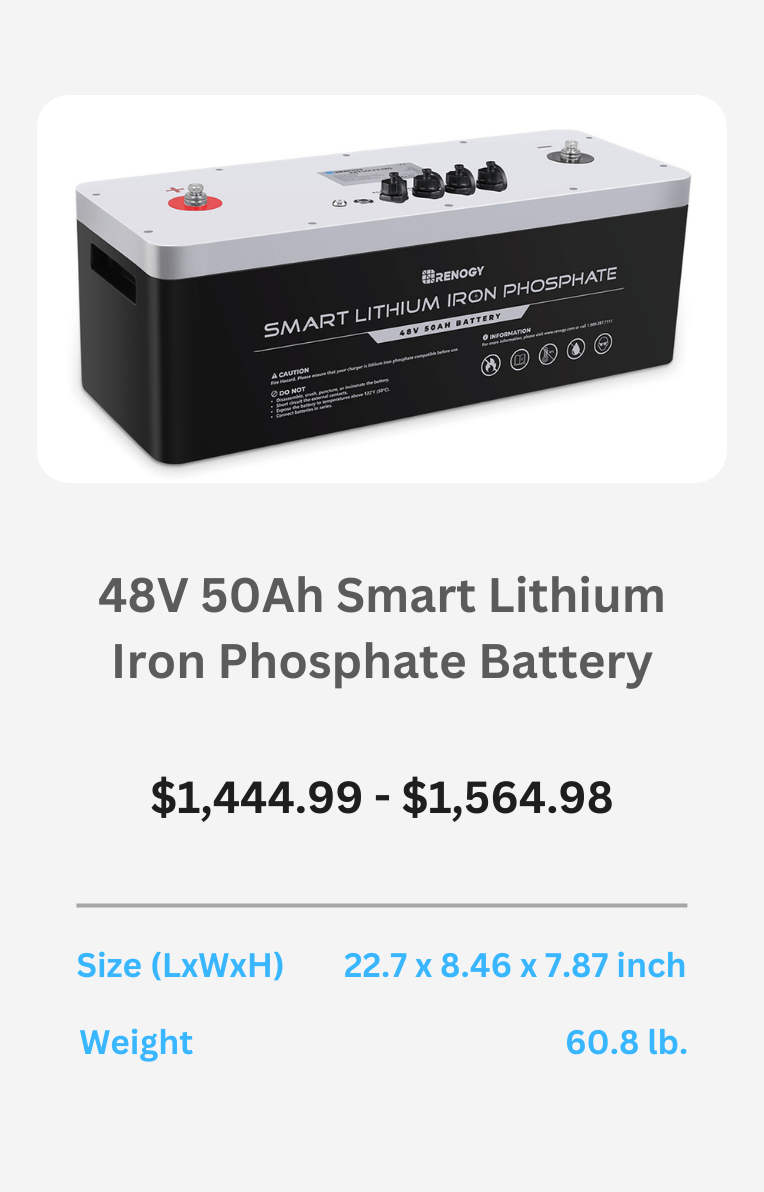
Online RV Battery Size Calculator
If you're still not sure which battery is best suited for your RV, try out Renogy's online Battery Size Calculator, a powerful and convenient tool for anyone looking for an efficient energy storage solution. This online calculator helps you determine the battery bank size that best fits your individual needs.
You just need to input simple information about your off-grid RV setup, like the type of your devices, daily watt-hours used, and your backup power requirements, and the calculator will display your required battery size and capacity.
Renogy’s online battery size calculator will give you a custom recommendation within seconds after submitting your selections.
The Battery Size Calculator will also give you an estimate of the cost and total kit price of all the components needed to set up your off-grid RV solar installation. This is incredibly useful if you want an accurate budget overview that doesn't overwhelm you with technical calculations.
How Long Do RV Batteries Last?
Different types of RV batteries have different life cycles. In other words, the lifespan of your RV battery depends upon its type and quality.
RV deep cycle batteries are divided into two major categories:
1.Lithium Based Batteries
2.Lead-Acid Based Batteries
These two major categories can be further divided into smaller classifications, for example, Lead- Acid batteries are divided into:
1.Flooded or Wet-Cell Lead-Acid Batteries
2.Absorbent Glass Mat AGM Lead-Acid Batteries
3.Gel Lead-Acid Batteries
On the other hand, Lithium-based batteries, AKA Lithium-ion (Li-ion) batteries have many different types, including:
1.Lithium Iron Phosphate LFP LiFePO4
2.Lithium Nickel Cobalt Aluminium Oxide NCA LiNiCoAlO2
3.Lithium Cobalt Oxide LCO LiCoO2
4.Lithium Manganese Oxide LMO LiMn2O4
If you refer to the battery chart below, you will see that at the same size (Ah rating), longer lasting batteries like LiFePO4 are more expensive.
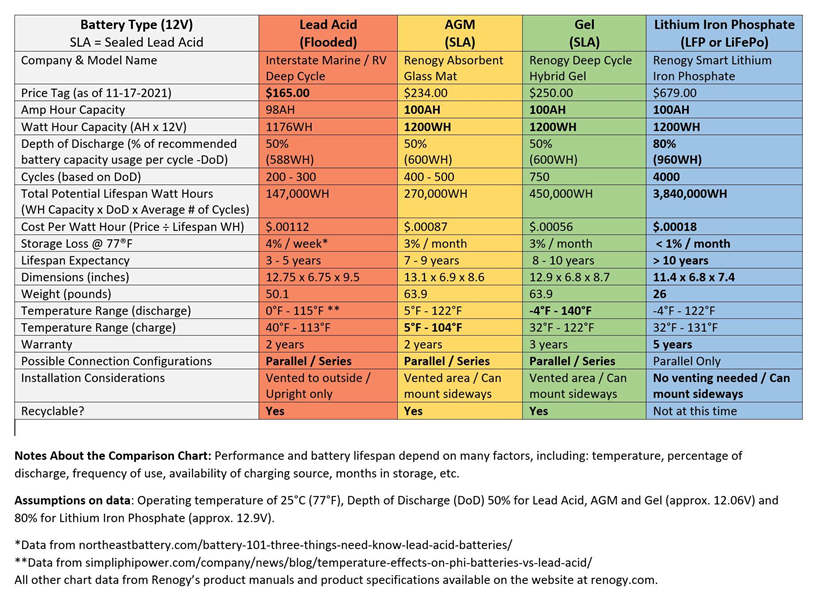
So how long does each type of RV battery last?
Flooded Lead-Acid Batteries are the most affordable batteries. However, they are also the shortest-lived RV batteries you could buy. In addition, Flooded batteries are also the most demanding in terms of maintenance as their electrolyte needs to be regularly topped off.
On average, Flooded or Wet-Cell Lead-Acid batteries can last for around 500 life cycles. Depending on how you use your RV, this translates to approximately 2-4 years of reliable use.
Second on our list are AGM and Gel Lead-Acid batteries. These batteries share many similar characteristics and lifespans. On average, AGM and Gel can support between 600 and 1200 cycles of use, depending on the battery type and quality. This translates to around 3-8 years of use.
Lastly, we have Lithium Iron Phosphate batteries. LiFePO4 batteries typically have a lifespan of over 3000 charge-discharge cycles. Sometimes they even go over 4000 cycles of use. This translates roughly to over 10 years of conscientious use. For more related information, you can read another article: How long do LiFePO4 batteries last?
Best Lithium Battery for RV - Renogy LiFePO4
There are few better choices than Renogy's diverse selection of the best lithium batteries for RVs , campers, and other mobile homes. Our range of 12V Lithium Iron Phosphate batteries is designed and engineered for use in RVs, boats, and other mobile homes.
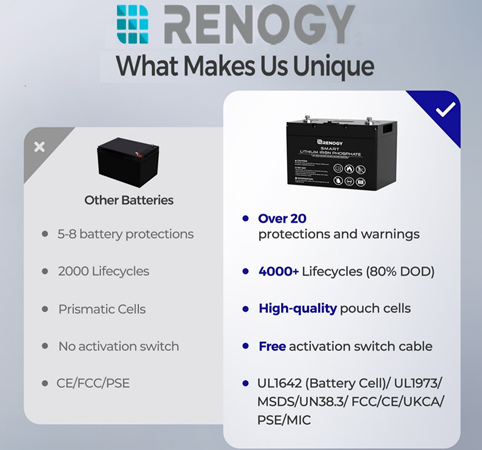
Renogy Lithium batteries for Rvs offer the best-in-class performance with features such as:
●High Capacity
●Self-heating function
●Durable IP65 Water and Dust Proof Protection
●Smart Battery Management System
●Auto-balancing Function for Battery Banks
●Automatic Energy Saving Mode when not in use
●Remote Monitoring Functionality
●80% Depth of Discharge without Reducing Battery Lifespan
●3-5 Year Product Warranty (REGO)
Here are some of our top-selling RV lithium batteries:
12V 100Ah Smart Lithium Iron Phosphate Battery
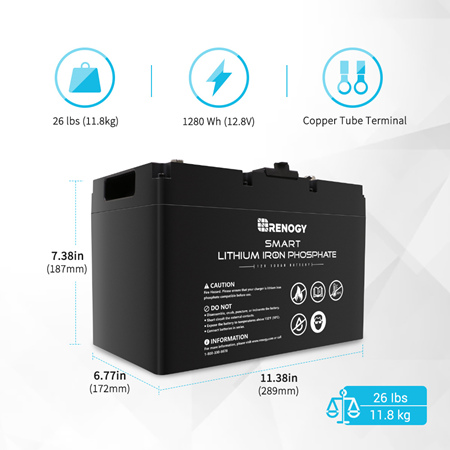
The 12V 100 Ah battery is a great replacement battery for RVs because of its high quality. It can store approximately 1.2 kWh of energy, which is enough for emergent backup power usage. With a compact size of 11.4 inch x 6.8 inch x 7.4 inch, the battery takes up to 15% space less on your RV compared to other types of battery.
12V 200Ah Lithium Iron Phosphate Battery w/ Bluetooth
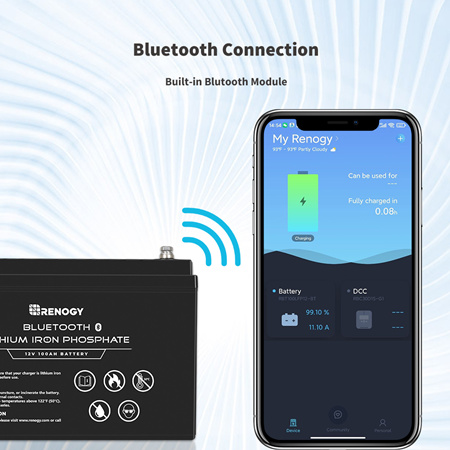
This battery is a perfect substitute for deep-cycled lead-acid batteries with a standard BCI group size. Designed with built-in automotive-grade battery cells, the lithium battery delivers excellent performance even under the effect of various loads. And if you are looking for monitoring functions on a lithium battery, it is also your ideal option. It offers stable access to Bluetooth connections as its Bluetooth 5.0 technology enables faster and higher-quality data transmission.
12V 100Ah Smart Lithium Iron Phosphate Battery w/ Self-Heating Function
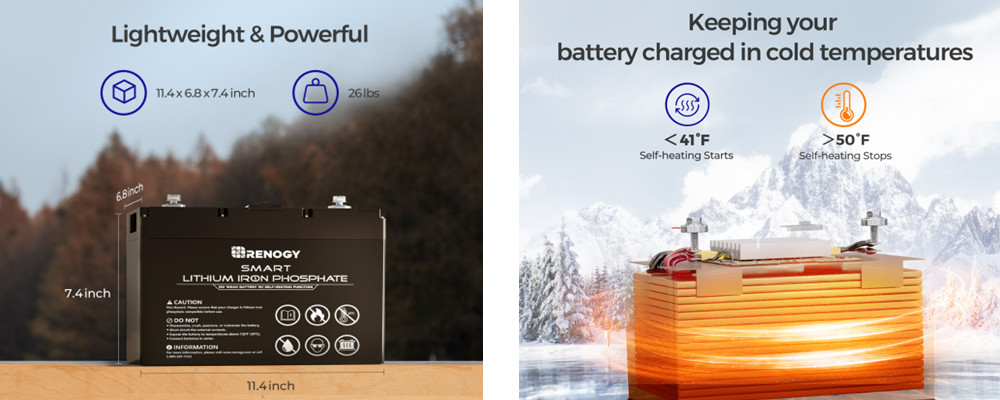
Have you ever run into the trouble of your lithium batteries dying in freezing weather? If you have, you may learn the importance of working temperature and self-heating functions for a lithium-ion battery. Hence, if you live in a cold area, we highly recommend you have a look at this self-heating lithium iron phosphate battery. The heating function of the battery will be activated once the temperature falls below 41 °F and stop working when the internal temperature returns to 50 °F upward.
If what you need is more than a solar battery, please visit Renogy online store for a wider range of selections. Our product lines range from monocrystalline solar panels to wiring accessories.
Related articles:
How Long Do LiFePO4 Batteries Last?
Best Battery For Trolling Motor
What Does Ah Mean On A Battery?
What Is An AGM Battery?
Is A Solar Battery Necessary For My Solar Energy System?

Be the first to receive our latest news and exclusive deals!
- Solar Panels
- Off Grid Solar Kits
- Charge Controllers
- IoT Monitoring
- Deep Cycle Batteries
- Battery Chargers
- Accessories & Wiring
- Renogy Gear
- Troubleshooting
- Shipping/Warranty/Return
- Service Center
- Learning Center
- Success Stories
- Renogy Power Plus
- Special Discount
- Renogy Discord Group
- Become a Dealer

- Accessibility |
- Privacy Policy |
- 4G App Privacy Policy |
- Do Not Sell My Personal Information
Create an account with us and you'll be able to:
- Join Renogy Power Plus and earn Rays
- Get exclusive rewards
- Track new orders
- Access your order history
- Save multiple shipping addresses
Create Account

- Replacement Parts
- Batteries & Accessories
Add to your order

- No Additional Cost: You pay nothing for repairs – parts, labor, and shipping included.
- Coverage: Plan starts on the date of purchase. Drops, spills and cracked screens due to normal use covered for portable products and power surges covered from day one. Malfunctions covered after the manufacturer's warranty.
- Easy Claims Process: File a claim anytime online or by phone. Most claims approved within minutes. If we can’t repair it, we’ll send you an Amazon e-gift card for the purchase price of your covered product or replace it.
- Product Eligibility: Plan must be purchased with a product or within 30 days of the product purchase. Pre-existing conditions are not covered.
- Terms & Details: More information about this protection plan is available within the “Product guides and documents” section. Simply click “User Guide” for more info. Terms & Conditions will be available in Your Orders on Amazon. Asurion will also email your plan confirmation with Terms & Conditions to the address associated with your Amazon account within 24 hours of purchase.
- Buy a lot of stuff on Amazon? Tons of items eligible for coverage, from the latest tech like laptops, game consoles, TVs, phones, and cameras to major appliances, sporting goods, tools, toys, mattresses, personal care, furniture, and more.
- Accidents happen. That’s why for your portable products we cover accidental damage from handling such as drops, spills and cracked screens. We also cover electrical and mechanical malfunctions,power surges, and wear and tear.
- Past and future purchases covered. 30 days after you are enrolled,all eligible past purchases (up to 1 year prior to enrollment) and future eligible purchases made on Amazon will be covered by your plan as long as you are enrolled.
- Fast, easy claims. Frustration-free claims, with most filed in minutes. We will fix it, replace it, or reimburse you with an Amazon e-gift card for the purchase price of your product (excluding tax).File at Asurion.com/amazon.
- No hidden fees.For just $16.99 a month + tax you’re covered for up to $5,000 in claims per 12-month period. *THIS PROGRAM IS MONTH-TO-MONTH AND WILL CONTINUE UNTIL CANCELED* Coverage for all products ends 30 days after the plan is canceled. Cancel any time.
2 Year Auto Accessories Protection Plan
3 year auto accessories protection plan, asurion complete protect: one plan covers all eligible past and future purchases on amazon.

Image Unavailable

- To view this video download Flash Player
ExpertPower 12V 100Ah Lithium LiFePO4 Deep Cycle Rechargeable Battery | Bluetooth | 2500-7000 Life Cycles & 10-Year Lifetime | Built-in BMS | RV, Camper, Solar, Trolling Motor, Overland, Off-Grid
Purchase options and add-ons, about this item.
- Trusted by Industry Professionals and Installers: With a proud legacy of 36 years in the industry, now our LiFePO4 batteries have earned widespread adoption across various industries, endorsed by professionals and installers alike. Selling over a million batteries and over 80 Megawatt-hours of energy every year and growing, our track record speaks volumes about our product's reliability and performance.
- Unmatched Prismatic Cell Technology: Our larger application LiFePO4 batteries are crafted using state-of-the-art Grade A+ prismatic cells, setting a new standard in battery design. Lighter, safer, and more efficient than the cylindrical cells used by others, our batteries outshine the rest. Our LiFePO4 batteries provide 4000 to 7000 cycles & a 10-year expected lifetime compared to others. Supports expansion up to 4 batteries in series at 48V 100Ah, or max. 10 batteries in parallel at 12V 1000Ah.
- Cutting-Edge BMS for Superior Battery Performance: With our proprietary Battery Management System (BMS), precisely optimized to complement our specific cells, you can expect maximum useful life and unparalleled battery protection, ensuring years of uninterrupted enjoyment. Our industry leading built-in Battery Management System (BMS) protects the battery cells from overcharge, deep discharge, overloading, overheating, low-temperatures and short circuits. Built-in Bluetooth allows easily track the battery level and BMS Status on your phone with the handy app.
- Unparalleled Resilience through Rigorous Testing: Our prismatic cells undergo rigorous testing across a multitude of conditions: from puncturing, to fire, short circuit, and even high impact damage, our cells are tested against all types of damage, providing outstanding resilience and the peace of mind you deserve.
- The Expert Promise: Experience Hassle-Free Purchasing with Our Unwavering Warranty and World-Class Tech Support: When you choose our LiFePO4 batteries, rest assured of a seamless and reassuring buying process, backed by our exceptional warranty and dedicated technical support.
Additional Details

Frequently bought together
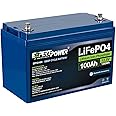
Videos for similar products

From the brand

ExpertPower is a Los Angeles-based energy solutions company located in the heart of beautiful southern California. Since its establishment in 1987, ExpertPower has worked hard to earn its reputation as the most dependable in the business. Our product reviews are from actual customers who both appreciate and trust the quality they have come to expect from our products.
What We Do?
From our smallest battery pack to our largest energy storage system, ExpertPower designs, manufactures, distributes, services and supports energy storage solutions that provide customers with superior value.
Our broad global network provides a wide variety of energy storage equipment, storage solutions and support services.
What is Our Mission?
Our mission at ExpertPower is to empower individuals and communities to live sustainable and fulfilling lives by providing innovative energy solutions that enable energy independence and a greener future.
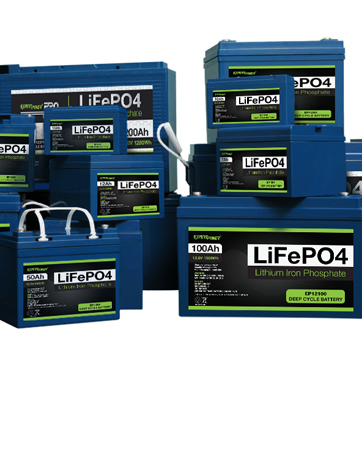
LiFePO4 Battery
ExpertPower’s newest line of batteries.

Solar Panel Kits
Visit the Store
Product Description

SPECIFICATIONS
Product details.
- Product Dimensions : 13 x 6.8 x 8.4 inches; 22.6 Pounds
- Item model number : EP12100BT
- Batteries : 1 Lithium Ion batteries required. (included)
- Date First Available : August 27, 2019
- Manufacturer : ExpertPower
- ASIN : B07X4Z8FML
- #658 in Automotive Replacement Batteries
Compare with similar items
Videos for this product.

Click to play video

Will Review Aolithium 12V 100Ah Lithium Battery
ExpertPower - LiFePO4 Lithium Battery
ExpertPower Direct

ExpertPower Solar Panel Kits - From Small to Giant.

ExpertPower Solar Kits
Important information, bulb voltage, legal disclaimer.
Statements regarding dietary supplements have not been evaluated by the FDA and are not intended to diagnose, treat, cure, or prevent any disease or health condition.
Looking for specific info?
Customer reviews.
- 5 star 4 star 3 star 2 star 1 star 5 star 70% 9% 5% 6% 10% 70%
- 5 star 4 star 3 star 2 star 1 star 4 star 70% 9% 5% 6% 10% 9%
- 5 star 4 star 3 star 2 star 1 star 3 star 70% 9% 5% 6% 10% 5%
- 5 star 4 star 3 star 2 star 1 star 2 star 70% 9% 5% 6% 10% 6%
- 5 star 4 star 3 star 2 star 1 star 1 star 70% 9% 5% 6% 10% 10%
Customer Reviews, including Product Star Ratings help customers to learn more about the product and decide whether it is the right product for them.
To calculate the overall star rating and percentage breakdown by star, we don’t use a simple average. Instead, our system considers things like how recent a review is and if the reviewer bought the item on Amazon. It also analyzed reviews to verify trustworthiness.
Customers say
Customers like the performance, capacity, and quality of the auto battery. For example, they mention it performs just as advertised, it holds power well, and it's extremely light weight. That said, some complain about the voltage.
AI-generated from the text of customer reviews
Customers like the quality of the battery. They mention that it's extremely light weight, holds power so well, and is still going strong. Some say that the battery performance was better than expected.
"Update 4/29/2021The battery is performing well . We made a trip to Florida to visit my parents which included one night without hookups...." Read more
"...They run my 12v fridges for days . And I don't have to worry about exceeding 50% depth of discharge like with deep cycle lead acid types...." Read more
"...my second ExpertPower battery and no issues so far, the light weight is much appreciated in my application...." Read more
"...The old ones lasted maybe 4 hours and these lasted 6 hours on the first outing . I'd have fished longer but I already had my limit...." Read more
Customers like the performance of the auto battery. They say it's well constructed, solid, and performs just as advertised. The BMS works, and the DC to DC charger works great. The force mode works instantly to reset the BMS and start charging. The 100AH is almost completely usable.
"...The DC to DC charger works great and the battery is not having any issues with performance...." Read more
"...I have a NOCO Genius 10. It has the "force mode". It worked instantly to reset the BMS and started charging...." Read more
"...at reciting their list of excuses as to why their cheap product continually fails ...." Read more
"...I now own four LiFePO4s from Expert and they're all performing great ! I'll likely be back for more, finances permitting...." Read more
Customers are satisfied with the capacity tests of the auto battery. They mention that it can run down to 10% of capacity, it passes its capacity tests, and it exceeds their expectations.
"...They also theoretically can run down to 10% of capacity ...." Read more
"...These babies are awesome! Passed their capacity tests and actually exceeded their listed rating. They run my 12v fridges for days...." Read more
"...It holds power so freaking well and It is nice increasing the capacity too. I couldn't recommend this battery more!" Read more
Customers find the auto battery easy to move around and safe to transport. They also say it's a wonderful power supply for portable needs.
"It’s not real heavy and easy to move around ." Read more
"Good buy and safe transport of it..." Read more
"Is the most Bang for my buck. This has been a wonderful power supply for my portable needs ...." Read more
Customers have negative opinions about the voltage of the auto battery. They mention that it does not charge properly, the trailer connector cable is not suited for proper charging, and the connectivity is poor.
"...First, I realized that the tow vehicle could not charge the battery when I noticed that it was lower after towing than before...." Read more
"...1-day it turned off. Could not get it to charge . BMP off. I was really stuck in the woods. Had an alternator to charger, nothing...." Read more
"...No issue, lasts all day, It stopped charging one day and customer support sent me a brand new one extremely fast free of charge. Highly recommend 👌..." Read more
"...I bought it and used 2 times after that it doesn't take charge anymore . I have contacted the seller 2 times no answer so far...." Read more
Reviews with images

- Sort reviews by Top reviews Most recent Top reviews
Top reviews from the United States
There was a problem filtering reviews right now. please try again later..
Disclaimer : While we work to ensure that product information is correct, on occasion manufacturers may alter their ingredient lists. Actual product packaging and materials may contain more and/or different information than that shown on our Web site. We recommend that you do not solely rely on the information presented and that you always read labels, warnings, and directions before using or consuming a product. For additional information about a product, please contact the manufacturer. Content on this site is for reference purposes and is not intended to substitute for advice given by a physician, pharmacist, or other licensed health-care professional. You should not use this information as self-diagnosis or for treating a health problem or disease. Contact your health-care provider immediately if you suspect that you have a medical problem. Information and statements regarding dietary supplements have not been evaluated by the Food and Drug Administration and are not intended to diagnose, treat, cure, or prevent any disease or health condition. Amazon.com assumes no liability for inaccuracies or misstatements about products.
- Amazon Newsletter
- About Amazon
- Accessibility
- Sustainability
- Press Center
- Investor Relations
- Amazon Devices
- Amazon Science
- Sell on Amazon
- Sell apps on Amazon
- Supply to Amazon
- Protect & Build Your Brand
- Become an Affiliate
- Become a Delivery Driver
- Start a Package Delivery Business
- Advertise Your Products
- Self-Publish with Us
- Become an Amazon Hub Partner
- › See More Ways to Make Money
- Amazon Visa
- Amazon Store Card
- Amazon Secured Card
- Amazon Business Card
- Shop with Points
- Credit Card Marketplace
- Reload Your Balance
- Amazon Currency Converter
- Your Account
- Your Orders
- Shipping Rates & Policies
- Amazon Prime
- Returns & Replacements
- Manage Your Content and Devices
- Recalls and Product Safety Alerts
- Conditions of Use
- Privacy Notice
- Consumer Health Data Privacy Disclosure
- Your Ads Privacy Choices

Complete Guide To Car Batteries And How Long They Last
I t is no secret that the automotive world is in an unstable state. Regulations from all corners force changes in vehicle mechanics that have led to the rise of fully electric vehicles. On paper, electric vehicles don’t produce emissions while running. This means that the air we breathe in cities is cleaner.
However, the actual production of electric vehicles produces a significant amount of emissions . And, let’s not forget that the electricity used to charge them comes from fossil fuel-burning factories. As is always the case with new technologies, the rise of electric vehicles has its pros and cons.
Of course, one of the most significant pieces of electric vehicles is the battery, and as you would expect, there are many different questions revolving around this new technology. Here's how the most common types of batteries work, their lifespan , and what one can do to prolong their usable life.
In order to give you the most up-to-date and accurate information possible, the data used to compile this article was sourced from various manufacturer websites and other authoritative sources such as Motortrend and Car and Driver.
Tesla vs Toyota: The Main Difference Between Their Batteries
The different types of ev batteries, lithium-ion batteries.
In the ever-changing world of electric vehicle technologies, there are two prominent battery types: lithium-ion and the now-rising solid-state batteries . Each of these has unique characteristics and applications. Lithium-ion batteries are currently the most widely used batteries in EVs, mainly due to their high energy density. This, of course, translates to longer driving ranges and more efficient power usage, making them much more appealing and convenient to customers.
Lithium-ion batteries function by transferring lithium ions between an anode and a cathode through a liquid electrolyte . This process occurs during both charging and discharging. Although these batteries are widely used, they have some rather large limitations.
For example, they are vulnerable to temperature extremes and gradual decrease in capacity over time due to cycling (charging and discharging). Furthermore, they pose safety risks, particularly with regard to overheating and the possibility of thermal runaway, which can lead to furious fires.
Solid-State vs. Lithium-ion Batteries
Solid state batteries.
Now, solid-state batteries represent a promising advancement in EV battery technology. On paper, they promise more efficient power delivery with fewer safety risks . The way they differ from traditional lithium-ion batteries is simple. The liquid electrolyte is replaced with a solid one. This alteration offers several advantages, including higher energy densities, potentially longer lifespans, and improved safety due to reduced flammability .
Solid-state batteries are also expected to charge faster and offer better performance in a wider range of temperatures compared to their lithium-ion counterparts. However, as of now, solid-state technology is still largely in the development phase, and, as is the case with most new technologies, it faces challenges in terms of manufacturing scalability and cost-effectiveness.
Both lithium-ion and solid-state batteries play pivotal roles in the future of EVs. Lithium-ion batteries continue to be the backbone of the current EV market, as they are still being improved and refined. On the other hand, solid-state batteries hold the potential to overcome some of the key limitations of lithium-ion technology and promise future EV performance that is far better than what we have now.
5 Minute Recharging: How Swappable Electric Car Batteries Could Change The EV Market
How ev battery works.
On paper, the way lithium-ion batteries work is rather simple . When the battery is charged, the lithium ions move from the cathode to the anode and are stored there. This process is facilitated by the use of a liquid electrolyte which helps in the transportation of ions. During discharge, the ions move back to the cathode and release energy that powers the electric motors of the vehicle.
Other than the overheating and fire risk mentioned above, Lithium-ion batteries aren’t all that efficient. They might be far more efficient than vehicle batteries used to be, but still, we need incredibly large and heavy units to power vehicles for a usable distance and time.
How Solid-state Batteries Work
As mentioned above, solid-state batteries are a newer technology and are considered as a potential replacement for lithium-ion batteries . These batteries work similarly but use a solid electrolyte instead of a liquid one. This offers the advantages mentioned above, as the solid electrolyte is more stable and less flammable, making it safer to use.
Tesla Batteries: Everything You Need To Know
How long car batteries last.
How long an EV’s battery lasts depends on many factors such as quality, driving conditions (such as ambient temperature), and driving behavior. Typically, a Lithium-ion battery should last between 10 and 20 years before needing to be replaced. Worth mentioning is that modern EVs are designed to manage battery health actively, using clever battery management systems to optimize charging and usage patterns, thereby extending their lifespan.
You should be aware that the capacity of lithium-ion batteries does degrade over time and use. This degradation means that the range of the vehicle on full charge will gradually decrease. After about 8–10 years, or 100,000 to 150,000 miles, an EV battery might retain only 70–80-percent of its original capacity and, therefore, only 70–80-percent of its full-charge mileage.
Battery Warranties Are Available
To reassure consumers, many EV manufacturers offer substantial warranties on their batteries . These warranties typically cover eight years or 100,000 miles and guarantee that the battery will retain a certain percentage of its capacity (usually around 70-percent) during that period. It's important to note that while the battery might not be suitable for use in a vehicle after this point, it doesn't mean the battery is useless.
Many retired EV batteries are repurposed for energy storage in less demanding applications, like renewable energy systems, where their reduced capacity is less of an issue. This, of course, lessens the impact on the environment as building a battery pack produces a significant amount of emissions due to mining and transportation.
Why We Can't Wait For Toyota's 745-mile Solid-state Batteries To Arrive
How to increase your ev’s battery lifespan.
To prolong the lifespan of an electric vehicle’s lithium-ion batteries, you need to follow some relatively straightforward steps. Firstly, you need to ensure that optimal charging habits are in place. For example, avoid regularly charging the battery to full capacity (100-percent) and depleting it completely (0-percent). Maintaining the battery's charge level between 20-percent and 80-percent can substantially prolong its life. This practice helps prevent excessive stress and strain on the unit.
Avoid Extreme Temperatures
Now, another killer of batteries is extreme temperature, like extreme heat or extreme cold. Granted, some of us can’t avoid the cold. If you live in a cold state, there’s nothing you can do here other than potentially storing the car inside a heated garage. Avoiding extreme heat is easier as you can avoid driving the vehicle hard during really hot days, which, in turn, will keep its battery temperature down.
The further you can minimize the vehicle’s exposure to extreme temperatures, the more of a favor you will be doing to your battery pack. Of course, if your EV is on a leasing plan and will be changed every five years or so, then you shouldn’t worry too much about your battery.
- Maintain optimal charging habits
- Prevent excessive stress
- Minimize exposure to heat
- Limit temperature exposure
Understanding The Difference Between Solid-State and Lithium-Ion Batteries
Gentle driving and regular servicing is crucial.
Of course, as is the case with all items, regular maintenance and software updates provided by the manufacturer can also increase battery life. These updates often include improvements in battery management systems, which can enhance charging strategies and overall battery care.
Gentle Driving Prolongs Battery Life
Lastly, gentle driving habits contribute positively to the life of your vehicle. Aggressive acceleration and frequent high-speed driving can strain the battery; therefore, decreasing its life. A smoother driving style ensures that the battery discharges at a steadier rate, which, in turn, prolongs its lifespan.
The Average Cost Of Battery Replacement
The average cost of battery replacement in an EV is an important consideration buyers tend to think of before pulling the trigger on an EV purchase. Of course, the cost of replacement varies widely and is largely influenced by the vehicle's make and model, the type of battery, its age, and the country you happen to be living in.
The primary cost driver is the battery type, with lithium-ion batteries being particularly expensive. The high price of these batteries comes from the high cost of raw materials needed and the complex manufacturing processes that take place to produce them.
As you can imagine, these parts are also heavy and large meaning that they also cost a considerable amount to ship. Finally, let’s not forget that the price is also affected by the battery's capacity, measured in kilowatt-hours. Generally speaking, the larger the battery the higher the price.
The Cost Of Battery Replacements
Now, on average, the cost to replace an EV battery replacement ranges from about $10,000 to $20,000. However, for high-end or luxury EV models, the replacement costs can be even higher. This variability in cost reflects not just the battery technology but also factors such as labor costs, which can differ based on location and each specific vehicle. As is the case with internal combustion cars, some models are easier to work on and therefore, less labor intensive than others.
Of course, as battery technology advances and economies of scale are achieved through increased production, the cost of EV batteries is expected to decrease . Initiatives to recycle and refurbish used EV batteries also hold promise for reducing replacement costs in the future.
Nevertheless, for the time being, replacing the battery of an EV may not be worth it, as by the time the battery is dead, the vehicle won’t have much value anyway. In a certain way, EVs could be viewed as smartphones or laptops. As soon as a significant component dies, it is time to trade it in for a new model.

- Today's news
- Reviews and deals
- Climate change
- 2024 election
- Fall allergies
- Health news
- Mental health
- Sexual health
- Family health
- So mini ways
- Unapologetically
- Buying guides
Entertainment
- How to Watch
- My Portfolio
- Latest News
- Stock Market
- Biden Economy
- Stocks: Most Actives
- Stocks: Gainers
- Stocks: Losers
- Trending Tickers
- World Indices
- US Treasury Bonds
- Top Mutual Funds
- Highest Open Interest
- Highest Implied Volatility
- Stock Comparison
- Advanced Charts
- Currency Converter
- Basic Materials
- Communication Services
- Consumer Cyclical
- Consumer Defensive
- Financial Services
- Industrials
- Real Estate
- Mutual Funds
- Credit Cards
- Balance Transfer Cards
- Cash-back Cards
- Rewards Cards
- Travel Cards
- Credit Card Offers
- Best Free Checking
- Student Loans
- Personal Loans
- Car Insurance
- Mortgage Refinancing
- Mortgage Calculator
- Morning Brief
- Market Domination
- Market Domination Overtime
- Asking for a Trend
- Opening Bid
- Stocks in Translation
- Lead This Way
- Good Buy or Goodbye?
- Financial Freestyle
- Capitol Gains
- Fantasy football
- Pro Pick 'Em
- College Pick 'Em
- Fantasy baseball
- Fantasy hockey
- Fantasy basketball
- Download the app
- Daily fantasy
- Scores and schedules
- GameChannel
- World Baseball Classic
- Premier League
- CONCACAF League
- Champions League
- Motorsports
- Horse racing
- Newsletters
New on Yahoo
- Privacy Dashboard
Yahoo Finance
Expion360 partners with k-z recreational vehicles, a division of thor industries, inc., to provide advanced lithium battery solutions.
Expion360 51.2V 60Ah Edge VHC Heated Batteries Offered in Boondocker Package and New Group 27 12.8V 100Ah VHC Heated Batteries Available as an Option for the Off the Grid Solar Package
REDMOND, Ore., Aug. 06, 2024 (GLOBE NEWSWIRE) -- Expion360 Inc. (Nasdaq: XPON) (“Expion360” or the “Company”), an industry leader in lithium-ion battery power storage solutions, today announced a partnership with K-Z Recreational Vehicles (“K-Z RV”), a subsidiary of Thor Industries, Inc. This collaboration will integrate Expion360's cutting-edge battery technology into K-Z RV's premium offerings, enhancing the off-grid capabilities of their vehicles.
K-Z RV’s Boondocker package, renowned for its exceptional off-grid features, will now include three Expion360 51.2V 60Ah Edge VHC heated batteries, with an option to expand to a fourth battery. The integration of Expion360’s advanced battery technology and the expert system integration is provided by Wellspring Solar. The system features full integration with Victron’s Cerbo GX for real-time communication with Expion360’s battery management system (“BMS”).
These batteries will be available in the Durango and Durango Gold fifth-wheel models.
"We are thrilled to partner with K-Z Recreational Vehicles, a respected name in the RV industry and a part of Thor Industries, Inc.," said Brian Schaffner, CEO of Expion360. "This collaboration allows us to bring our cutting-edge lithium battery technology to a broader audience, providing K-Z RV customers with reliable and efficient power solutions for their outdoor adventures."
In addition to the Boondocker package, K-Z RV will offer two of Expion360's new Group 27 100Ah VHC Heated batteries as an option to their standard Off the Grid solar package. This upgrade will be available across the Durango, Durango Gold, and Durango Half-Ton models.
Brent Froman, General Manager at K-Z RV, commented, "At K-Z RV, we are committed to offering our customers the best in RV technology and innovation. By partnering with Expion360, we can provide advanced lithium battery options that enhance the off-grid experience. We are excited to offer these high-quality power solutions in our Durango and Durango Gold models, as well as in the Durango Half-Ton."
About K-Z Recreational Vehicles
K-Z Recreational Vehicles, a subsidiary of Thor Industries, Inc., is dedicated to designing and manufacturing RVs that promote the enjoyment of the great outdoors. Founded in 1972 and headquartered in Shipshewana, Indiana, K-Z RV is renowned for its commitment to quality, fairness, courtesy, and integrity. The company produces several popular brands of towable recreational vehicles, including Connect, Durango, Escape, Sportsmen, Sportster, Venom, and the Venture RV line, which includes Sonic, Stratus, and SportTrek.
K-Z RV operates a state-of-the-art production facility covering 530,000 square feet, with over 600 employees and 12 product lines offering more than 150 floor plans. The company prides itself on being one of the most innovative RV manufacturers in North America, continually leading the industry with new and inventive products. For more information, please visit K-Z RV .
About Wellspring Solar
Wellspring Solar, an industry leader in off-grid solar and battery solutions, has been a pivotal partner in the integration of complex energy systems for recreational and residential applications since 1995. Their expertise in system design and implementation ensures optimal performance and reliability.
For additional information about Wellspring Solar, please visit www.wellspringsolar.com .
About Expion360
Expion360 is an industry leader in premium lithium iron phosphate (LiFePO4) batteries and accessories for recreational vehicles and marine applications, with residential and industrial applications under development. On December 19, 2023, the Company announced its entrance into the home energy storage market with the introduction of two premium LiFePO4 battery storage systems that enable residential and small business customers to create their own stable micro-energy grid and lessen the impact of increasing power fluctuations and outages. Please find the press release here .
The Company’s lithium-ion batteries feature half the weight of standard lead-acid batteries while delivering three times the power and ten times the number of charging cycles. Expion360 batteries also feature better construction and reliability compared to other lithium-ion batteries on the market due to their superior design and quality materials. Specially reinforced, fiberglass-infused, premium ABS and solid mechanical connections help provide top performance and safety. With Expion360 batteries, adventurers can enjoy the most beautiful and remote places on Earth even longer.
The Company is headquartered in Redmond, Oregon. Expion360 lithium-ion batteries are available today through more than 300 dealers, wholesalers, private-label customers, and OEMs across the country. To learn more about the Company, visit expion360.com .
Edge, VHC, Vertical Heat Conduction and SmartTalk are trademarks of Expion360.
© 2024 Expion360. All rights reserved.
Forward-Looking Statements and Safe Harbor Notice
This press release contains certain forward-looking statements within the meaning of Section 27A of the Securities Act of 1933, as amended, and Section 21E of the Securities Exchange Act of 1934, as amended, which statements are subject to considerable risks and uncertainties. The Company intends such forward-looking statements to be covered by the safe harbor provisions contained in the Private Securities Litigation Reform Act of 1995. All statements other than statements of historical facts included in this press release, including statements about our beliefs and expectations, are "forward-looking statements" and should be evaluated as such. Examples of such forward-looking statements include statements that use forward-looking words such as "projected," "expect," "possibility,” “believe,” “aim,” “goal,” “plan,” and "anticipate," or similar expressions. Forward-looking statements included in this press release include, but are not limited to, statements relating to the Company’s anticipated collaboration and integration of the Company’s products with K-Z RV’s products. Forward-looking statements are subject to and involve risks, uncertainties, and assumptions that may cause the Company’s actual results, performance or achievements to be materially different from any future results, performance or achievements predicted, assumed or implied by such forward-looking statements.
Company Contact: Brian Schaffner, CEO 541-797-6714 Email Contact
External Investor Relations: Chris Tyson, Executive Vice President MZ Group - MZ North America 949-491-8235 [email protected] www.mzgroup.us
A photo accompanying this announcement is available at https://www.globenewswire.com/NewsRoom/AttachmentNg/60a06890-8907-4b1d-af52-103c42d03d31
latest in US News

Parents whose 13-day-old daughter died after having tainted...

NYC residents sound off over noise, crowding from concerts at new...

All of Tim Walz's military service embellishments — from...

Wisconsin Dems cite fears over Project 2025, abortion access as...

Ex-lawmaker pleads guilty to going to Europe to pay for sex with...

Video captures vicious knife attack in NYC laundromat that left...

How stranded astronauts who went to ISS on 8-day voyage are...

Boy, 15, busted in shooting of younger teen near NYC subway...
Hulking florida teen brendan depa who severely beat teacher over nintendo switch sentenced to five years in prison.
The hulking Florida teen who brutally pummeled a high school teacher unconscious over his Nintendo Switch last February was sentenced to five years in prison.
Brendan Depa, now 18, threw his head back after Circuit Judge Terence Perkins handed down the punishment on Tuesday evening.
Depa also received 15 years of probation after his release and will be placed in a group home, court records showed.

Depa was charged with felony aggravated battery – bodily harm after he attacked paraprofessional Joan Naydich in a hallway inside Matanzas High School in Palm Coast.
The then-17-year-old, 6 feet 6 and 270 pounds, was seen on security footage sprinting toward the female educator, who turns and spots her assailant a split-second before he shoves her to the floor.
Depa then repeatedly stomps on the unconscious paraprofessional before punching her 15 times.
Several staff members were needed to remove Depa from Naydich and hold him to the floor.
In October, Depa pleaded no contest to the charges. An original sentencing date, when he faced up to 30 years in state prison, was rescheduled after Perkins said he needed to hear from more witnesses in May.
The teen, who has autism spectrum disorder, will serve his sentence in jail despite pleas from his mother and defense attorney.

“They are punishing that he is black, they are punishing that he is large and they are punishing his disability,” the teen’s adoptive mother, Leanne Depa, said after the sentencing.
“I think he needs help, and I think he needs treatment. But I don’t think he needs to be put away in a prison where he’s going to be taken advantage of or harmed,” she added, according to the Daytona Beach News-Journal.
She went on to call out the school for not properly handling her son’s disabilities.

Start and end your day informed with our newsletters
Morning Report and Evening Update: Your source for today's top stories
Thanks for signing up!
Please provide a valid email address.
By clicking above you agree to the Terms of Use and Privacy Policy .
Never miss a story.
“I had told the school that being hungry was a trigger, that noise was a trigger, that being told ‘no’ was a trigger, that being corrected in front of other people was a trigger, and electronics was a huge trigger,” Leann Depa added.
Depa’s attorney said he should be tried as a juvenile since he attacked Naydich when he was still 17, but Assistant State Attorney Melissa Clark argued the teen had a history of violence, according to WESH.
Perkins agreed with Clark’s argument and said the February 2023 attack wasn’t an isolated incident and that Brendan Depa had numerous battery charges in the past, the outlet reported.

Naydich alleged that Depa had spat in her face and called her a “whore.”
“The last thing I remember is having my hand on the door handle,” Naydich told The Post in January . “I don’t remember anything [else] until 3:30 p.m. when I came to. And at that point I was in the ER and my son and daughter were standing there.”
Naydich, who first encountered Depa in January 2022, previously said she has PTSD and suffers from anxiety because of the attack.
“Brendan Depa’s actions that day has caused me to lose a job that I had for almost 19 years, lose my financial security, lose my health insurance,” Naydich said during a May hearing.
“Like everything was taken away from me that morning,” Naydich added. “At 10 o’clock that morning. Everything was taken away. My life will never be what it was before.”
Depa can appeal his sentence in writing but was ordered to have no contact with Naydich and remain 500 feet away from her home and place of work.

Advertisement

IMAGES
VIDEO
COMMENTS
On an average, a RV battery lasts around 4-5 years. A AGM battery if used properly can last 4-8 years where as a gelled or golf cart battery lasts between 2-6 years. When overlooked even a best rv battery can fail within a year. For a RV traveler nothing is more bothersome than a dead battery when you are on road.
5 Signs It's Time to Replace Your RV Battery. Even with the best care and maintenance, your RV batteries will eventually fail and need to be replaced. Here are five signs your lead-acid battery is nearing the end of its life: Swelling. If your battery appears swollen or bulging, it's a sure sign you need to replace it right away. Voltage drop.
Travel trailer house batteries typically last 2-3 days if you are utilizing the normal functions of your RV such as the water pump, heater, lighting, and refrigerator. If you are able to conserve energy or have larger batteries, you will be able to get 6-7 days of battery life. The length of time your batteries will last depend on if you are ...
There are different types of RV batteries, such as lead-acid, AGM (Absorbent Glass Mat), and lithium-ion batteries. Each type has a different average lifespan. Lead-acid batteries generally last 3-5 years, AGM batteries around 4-7 years, and lithium-ion batteries can last up to 10 years or more.
An incandescent 12-volt ceiling light bulb has a draw of 1.5 amps. If you leave the light on (burning) for one hour it will consume 1.5 amp hours of battery power. If you burn it for 2 hours it will consume 3 amp hours of battery power, etc. The blower motor and related 12-volt components of your propane furnace draw 7 amps while running.
20. 11.98 V. After this duration is over, then you can use your device to test its voltage. Your battery should read somewhere between 12.7 volts to 13.2 volts if it has retained 100% charge. If the device reads anywhere between 0 volts, then it's highly likely that your RV battery experienced short-circuiting.
An RV battery typically lasts between 4 and 5 years. However, as you may have guessed, this depends on the type of battery you use and many other factors. The 4-5 year estimate is for AGM batteries, which are rated at 12V. If properly maintained, your AGM battery can even last you 8 years. However, if you're using gelled or golf-cart ...
Nevertheless, if you use your lead-acid batteries according to the manufacturer's recommendations, they should last between 1 and 4 years. Lithium batteries will last 10 to 20 years and should last the life of your RV. You might even transfer them into your next rig before they need replacing.
There are three types of RV batteries. Each type of RV battery has its own life expectancy between 6 years and 10 years. Flooded lead-acid batteries have the shortest lifespan and lithium batteries have the longest lifespan of all three battery types. No matter what type of battery you have, they require care to ensure that they last as long as ...
Most RV batteries last between 4 and 6 years, but this can vary depending on the type of battery and how well it is maintained. Voltage: The voltage of your RV battery can also affect its lifespan. Overcharging or undercharging your battery can cause damage and reduce its lifespan. Temperature: The temperature of your battery can affect its ...
Here are a few tips for boondocking or dry camping and preserving battery life: If your RV has a single battery, start and run the engine periodically during your dry camping trip. This "recharges" the battery the same way any other vehicle does. Wire additional batteries for interior amenities. Keeping the lights on can use up more energy ...
The Role of Battery Chargers and Maintainers in Extending Travel Trailer Battery Life. Battery chargers and maintainers play a crucial role in prolonging the life of your travel trailer's batteries. While battery chargers replenish a depleted battery, maintainers help keep the batteries at an optimal charge level, preventing overcharging and ...
Lithium-Ion (Li-Ion) battery Lifespan. A lithium rv battery is stealing the show in the RV world. They outshine the FLA and AGM batteries when it comes to lifespan. Li-Ion batteries can serve your RV for a whopping 10 years to 15 years or even more! And, no doubt, that's a whole lot longer than the others.
An RV battery lasts between 5 and 7 years. Unfortunately, some RV owners have had to replace their RV battery every 1-2 years. The lifespan of an RV battery is affected by a few factors, including lack of maintenance, over and undercharging, sulfation, self-discharging, and parasitic loads. Some RV owners, especially the newbies, may not be ...
SEE IT. Specs. Type: Lithium Ion Battery Power: 12 volts Weight: 26.4 pounds Pros. Long life. Fast recharge. Lightweight. 10-year warranty. Cons. Higher initial cost. Requires Li-ion charger. You ...
From Watts To Amps To Amp-Hours. Let's take a 12V water pump that uses 50W of power when running, and determine how many amp-hours per day a boondocker might use. 50W / 12V = about 4 Amps. Daily Use Estimate: (5 min for dishes) + (10 min for showers) = 0.25 hours. 4 Amps X 0.25 Hours = 1 Amp-Hour (s) per day.
For instance, a single 12-volt flooded lead acid battery might cost as little as $50. Meanwhile, a lithium RV battery setup can cost thousands. That said, a lithium battery's extended lifespan and better performance can mean the cost-effectiveness of such a battery is actually much better in the long run. Because of this, if you can foot the ...
Aside from this disadvantage, these batteries are perfect for those who travel from campground to campground. Keep in mind that you will need to purchase either four to six 6-volt batteries or two 12-volt batteries to accommodate your trailer. Wire the 6-volts in a series and the 12-volts in a parallel configuration to obtain the most amperage.
The Battle Born Batteries LiFePO4 Deep Cycle Battery is a top choice for those searching for a dependable travel trailer battery. Its 100Ah 12V capacity ensures users enjoy up to 10-15 years of power. Built for rugged adventures, this fast-charging battery is perfect for various applications such as campers, vans, boats, trolling motors, and more.
Odyssey PC925 Travel Trailer Battery. To get the most value for your purchase, this Odyssey PC925 travel trailer battery is strongly recommended for its superb performance and superior functions. With this battery, you get 15% more when it comes to the plate surface area, which ensures more power storage.
There are several options. You can use one 12-volt Group 24 deep cycle battery that provides 70 to 85 amp hours or you can use two or more 12-volt batteries wired in parallel. Parallel wiring increases amp hours but not voltage. If you have the storage space you can switch from standard 12-volt batteries to two of the larger 6-volt golf cart ...
The number of batteries you need will depend on the size of your travel trailer and the number of devices you plan to use. A small travel trailer might only require one or two batteries, while a larger one could need four or more. As for voltage, most travel trailers use 12-volt batteries. However, some RVs have 24-volt systems, so you'll ...
Common sizes are 6-volt, 12-volt, and 8D batteries. 1. 6-Volt Batteries: A 6-volt RV battery provides half the 12V voltage used in RVs. Therefore, to be used in RVs, two 6V batteries are wired together in series to produce the required 12V. 2. 12-Volt Batteries: This is the most common type of RV battery and is typically used for everything in ...
Buy ExpertPower 12V 100Ah Lithium LiFePO4 Deep Cycle Rechargeable Battery | Bluetooth | 2500-7000 Life Cycles & 10-Year Lifetime | Built-in BMS | RV, Camper, Solar, Trolling Motor, ... Group 31 Lithium Battery with 100A BMS, Up to 15000 Deep Cycles Battery for RV, Solar, Trolling Motor and Off Grid 838. $191.88 $ 191. 88.
Maintaining the battery's charge level between 20-percent and 80-percent can substantially prolong its life. This practice helps prevent excessive stress and strain on the unit.
K-Z RV's Boondocker package, renowned for its exceptional off-grid features, will now include three Expion360 51.2V 60Ah Edge VHC heated batteries, with an option to expand to a fourth battery ...
Brendan Depa, 18, was charged with felony aggravated battery - bodily harm after he attacked paraprofessional Joan Naydich in a hallway inside Matanzas High School in Palm Coast back in February 2023.